INTERNATIONAL ACTIVITY REPORT 2016



Médecins Sans Frontières is a private international association. The association is made up mainly of doctors and health sector workers, and is also open to all other professions which might help in achieving its aims. All of its members agree to honour the following principles:
Médecins Sans Frontières provides assistance to populations in distress, to victims of natural or man-made disasters and to victims of armed conflict. They do so irrespective of race, religion, creed or political convictions.
Médecins Sans Frontières observes neutrality and impartiality in the name of universal medical ethics and the right to humanitarian assistance, and claims full and unhindered freedom in the exercise of its functions.
Members undertake to respect their professional code of ethics and to maintain complete independence from all political, economic or religious powers.
As volunteers, members understand the risks and dangers of the missions they carry out and make no claim for themselves or their assigns for any form of compensation other than that which the association might be able to afford them.
The country texts in this report provide descriptive overviews of MSF’s operational activities throughout the world between January and December 2016. Staffing figures represent the total full-time equivalent positions per country in 2016.
Country summaries are representational and, owing to space considerations, may not be comprehensive. For more information on our activities in other languages, please visit one of the websites listed on p. 96.
The place names and boundaries used in this report do not reflect any position by MSF on their legal status. Some patients’ names have been changed for reasons of confidentiality.
MSF PROGRAMMES AROUND THE WORLD
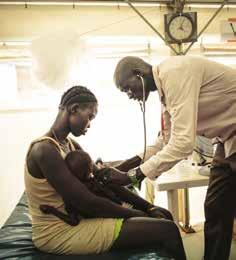
THE YEAR
OVERVIEW OF ACTIVITIES
GLOSSARY OF DISEASES AND ACTIVITIES
DESTROYING THE LAST HAVENS OF HUMANITY IN WAR
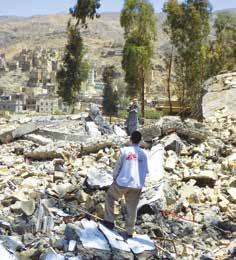
EXPANDING THE RESPONSE TO NIGERIA’S HUMANITARIAN CRISIS
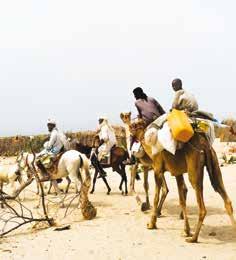
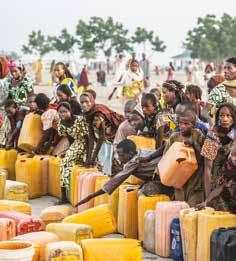
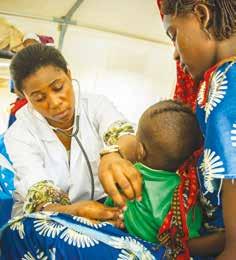
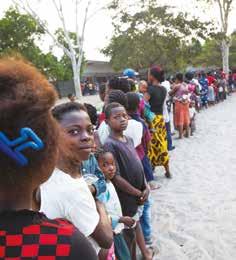
SEARCH AND RESCUE IN THE CENTRAL MEDITERRANEAN
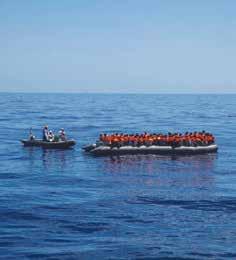
VACCINATION ON AN UNPRECEDENTED SCALE ACTIVITIES BY COUNTRY
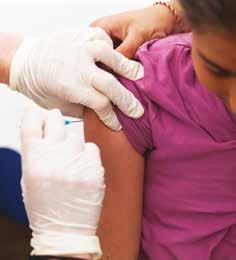
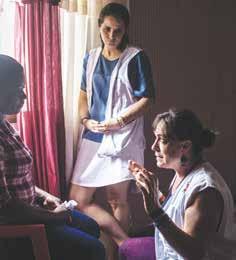
Countries in which MSF only carried out assessments in 2016 do not feature on this map.
Almost one-third of Médecins Sans Frontières (MSF) projects in 2016 were dedicated to providing assistance to populations caught in wars, such as in Yemen, South Sudan, Afghanistan, Iraq, Nigeria and Syria. MSF also provided assistance to people on the move, fleeing repression, poverty or violence, and in many cases subject to new forms of violence, exploitation or danger as countries closed options for safe and legal routes. Our teams responded to other emergencies caused by epidemics and natural disasters, and provided care and improved treatment for patients with diseases such as tuberculosis (TB) and HIV.
In many conflict zones, civilians and civilian infrastructure – including medical facilities – came under indiscriminate or targeted attacks. Millions of people had to flee their homes, sometimes multiple times. Our teams provided assistance to those caught in conflict and fleeing. They cared for pregnant women and newborns, treated the
wounded and people with medical emergencies, managed chronic illnesses and responded to disease outbreaks, notably through vaccination campaigns. MSF also worked to meet other vital needs, such as for drinking water and essential relief items. From Lebanon to Tanzania, MSF teams mobilised to assist hundreds of thousands of people who had fled violence and conflict to other countries in search of safety.
In Nigeria, the armed conflict between Boko Haram and the Nigerian military displaced an estimated 1.8 million people in Borno state alone, with many communities cut off from the rest of the country for extended periods of time due to the conflict. In June, with only limited access due to widespread insecurity, MSF teams discovered shocking situations in villages such as Bama, where two out of 10 children under the age of five were at risk of death due to malnutrition. Thousands of people regrouped in different villages were entirely reliant on aid. By the end of the year, the humanitarian situation had improved in areas that were still accessible. However, the widespread insecurity and military restrictions presented a significant challenge to MSF and other humanitarian actors: the number of people in need of lifesaving assistance in inaccessible areas is unknown.
The armed conflict in Nigeria took on a regional dimension in the Lake Chad Basin, expanding across borders to Cameroon, Chad and Niger, with direct consequences for civilian populations. The crisis aggravated
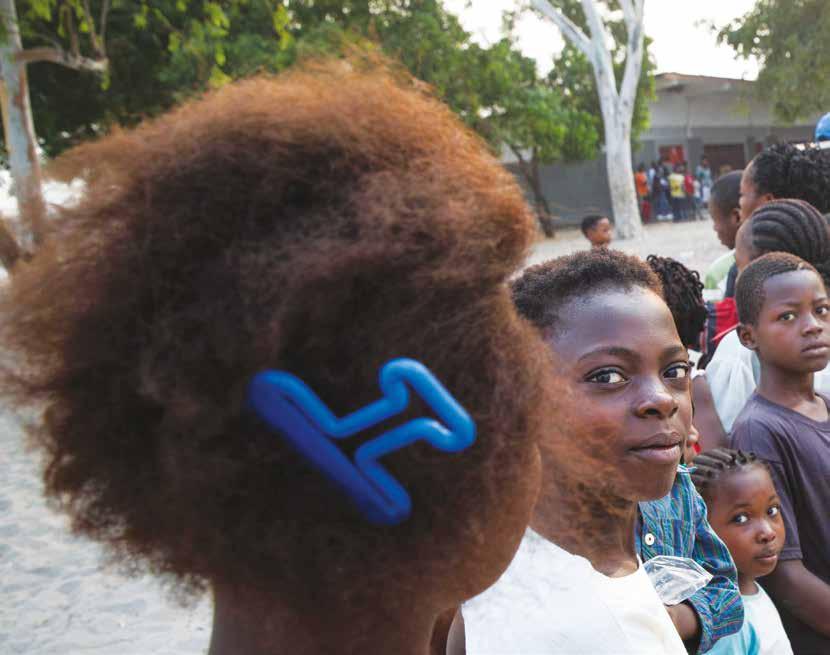
an already dire situation in a region suffering from poverty, food insecurity, recurring outbreaks of disease, and almost non-existent health systems. MSF teams stepped up medical and humanitarian assistance in Chad, Cameroon and Niger for people fleeing Nigeria, as well as for local and displaced populations affected by the crisis.
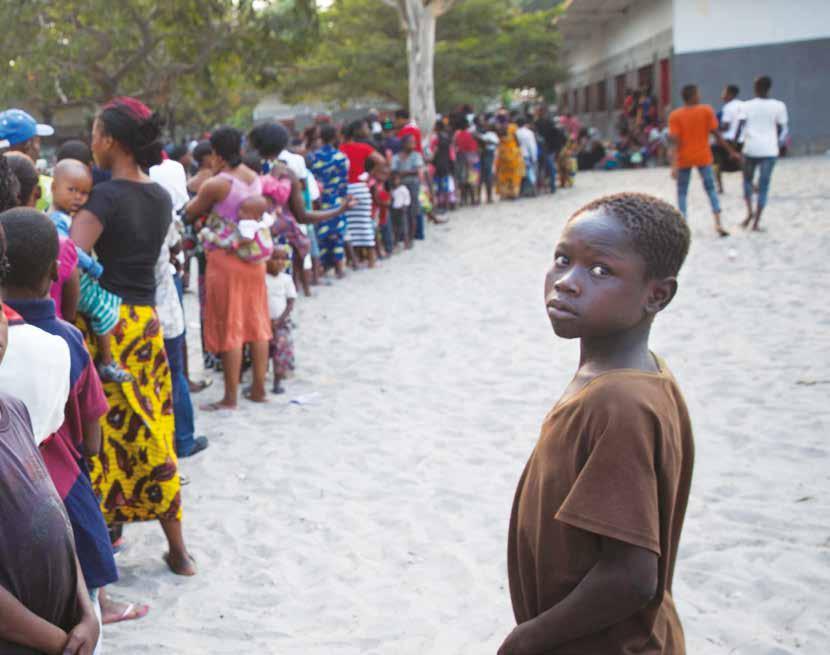
In South Sudan in July, intense fighting erupted between government and opposition forces in the capital, Juba. MSF opened clinics to provide emergency treatment for patients with gunshot wounds and injuries, as well as ongoing healthcare for conditions such as malnutrition, malaria and diarrhoea. Between August and December, we intensified our response to help South Sudanese refugees as the number of people fleeing violence increased, with hundreds of thousands arriving in Uganda, as well as in Ethiopia and Sudan.
In areas hit by violence, adapted solutions have had to be found. In South Sudan, to ensure continuity of care during instability for patients receiving HIV antiretroviral treatment, three-month emergency patient kits were prepared and distributed in the event of imminent displacement.
In Syria, MSF medical activities continued to be significantly constrained due to insecurity in opposition areas and a lack of authorisation by the Syrian government. MSF operated six medical structures in northern Syria in 2016. In inaccessible zones, such as besieged areas, our teams provided distance support to medical
networks inside the country, through training, technical support and donations to medical facilities. This remains an extraordinary approach for MSF, made necessary by people’s extreme level of need and suffering, and our lack of direct access. The level of violence, and need, and lack of assistance led to sustained public communications by MSF through the testimonies of Syrian medical staff we supported, particularly in east Aleppo city and in besieged areas around Damascus.
Following the closure of the border between Syria and Jordan in June, around 75,000 Syrians were left stranded in the Berm/Rukban area. MSF teams and other aid actors were no longer able to reach the population. The border closures also prevented people from seeking assistance and protection outside Syria, a situation that is emblematic of a growing, pervasive reality across war zones, particularly in Syria.
In Yemen, indiscriminate attacks against civilians and civilian infrastructure had a devastating impact on a country that was already one of the poorest in the region. To address the lack of healthcare and treat the increasing number of war victims, MSF scaled up its activities, making the response in Yemen our largest in the Middle East in 2016. MSF teams directly provided healthcare to patients in 12 hospitals and supported at least 18 other facilities. On 15 August, an airstrike on Abs hospital in northern Yemen killed 19 people, including an MSF staff member, and wounded 24. MSF withdrew its staff from six hospitals
in the north of the country following the airstrike, but continued to support the facilities. MSF resumed activities in northern Yemen in November 2016.
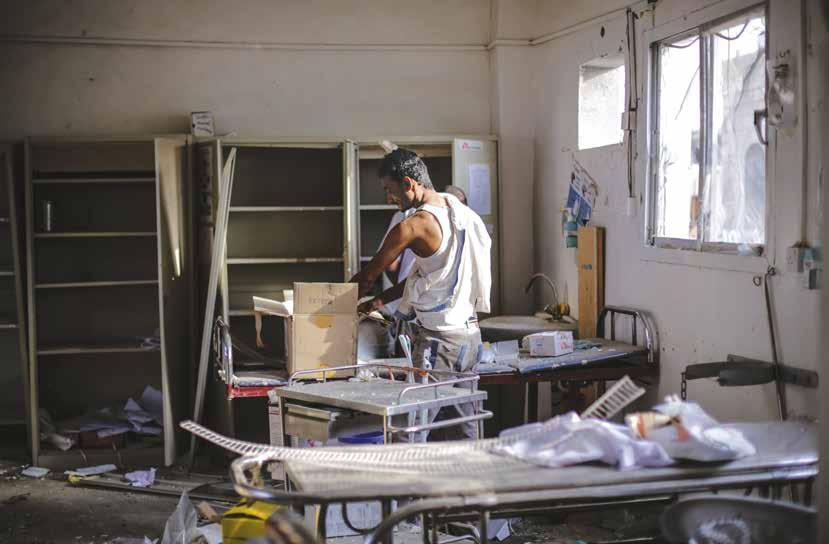
In May, the United Nations Security Council unanimously adopted Resolution 2286, condemning attacks on medical facilities and pledging to protect staff and patients in conflict settings. Yet airstrikes and shelling against health facilities continued, often by military coalitions acting with the direct or indirect involvement of Security Council members France, Russia, UK and USA. In 2016, 34 different health structures managed or supported by MSF were attacked in this way in Syria and Yemen.
Treacherous transit routes
The number of people crossing by sea to Italy increased from 153,000 in 2015 to over 180,000 in 2016. At least 5,000 men, women and children died while attempting the journey. MSF teams aboard three search and rescue vessels rescued 21,600 people from boats in distress in the Mediterranean. Our teams also recovered the bodies of people who drowned or were asphyxiated, crushed by the weight of hundreds of others.
With no safe and legal alternatives to reach Europe, almost all those rescued passed through Libya in search of assistance and protection. They described horrific suffering at the hands of smugglers, armed groups and individuals who exploited the desperation of those fleeing conflict, persecution or poverty.
In June, three months after the signing of the EU-Turkey deal, MSF announced it would no longer accept funds from the EU or EU Member States, in opposition to their damaging deterrence policies and continued attempts to push people and their suffering away from European shores.
In July, MSF began to run clinics in and around Tripoli, the Libyan capital, at some of the detention facilities established to lock up people on the move. Our teams witnessed catastrophic and inhumane living conditions.
In Central America, people from Honduras, Guatemala and El Salvador fleeing violence in their home countries were revictimised during their journey through Mexico to the United States. Of all MSF medical consultations in the migrant/refugee programmes in Mexico, a quarter of patients had been subjected to physical injuries and intentional trauma that occurred in transit. Patients reported that the perpetrators of violence included members of gangs and other criminal organisations, as well as members of the Mexican security forces – the very people responsible for their protection. These populations lack comprehensive access to medical care and suffer the consequences of aggressive deportation policies that disregard their need for assistance and protection.
The landscape of humanitarian medicine is constantly evolving, requiring MSF to keep pace with change. Adapting tools and
approaches to ensure high-quality patient care is central to MSF’s work. In Niger, MSF participated in a clinical trial in the Maradi region to establish the efficacy of the new vaccine against rotavirus infection. The infection is the leading cause of severe diarrhoea in children, which kills an estimated 1,300 globally every day. These deaths primarily occur in sub-Saharan Africa, where communities in remote areas have limited access to health services. The new vaccine is heat stable and does not require refrigeration, making it better adapted for populations most vulnerable to the disease. Following the 2014-2015 West Africa Ebola outbreak, MSF contributed to the development of a vaccine with potential to help prevent the spread of the Zaire strain of Ebola during future outbreaks.
A new cholera control strategy using a single-dose oral vaccine was found to be effective by MSF teams against outbreaks in Juba and was replicated in Lusaka, Zambia in April. Over 423,000 people were vaccinated against the disease, the largest cholera vaccination campaign ever undertaken during an outbreak. In the Democratic Republic of Congo (DRC), MSF vaccinated more than a million people against yellow fever. This required the daily organisation of 100 teams of 16 staff and a fleet of 65 vehicles carrying 4,000 ice packs and coolers.
When conflict disrupts health systems, infectious disease outbreaks can become more frequent and more devastating in their impact. Prevention and control strategies were part of our response in conflict settings too, such as in Nigeria, Yemen, Central African Republic, South Sudan and Syria.
Vaccination campaigns are one of the most effective ways to prevent and respond to epidemics but are only possible if vaccines are available at affordable prices. Pneumonia remains the leading cause

of death in children under the age of five, and the high price of the pneumococcal conjugate vaccine (PCV) places it out of reach for many developing countries. In Greece, for example, MSF paid US$68 per dose of PCV – 20 times more than the lowest global price – to ensure protection for refugee children. MSF had long urged Pfizer and GlaxoSmithKline (GSK) – the only two manufacturers of the vaccine –to offer the lowest global price to humanitarian organisations. In 2016, thanks to nearly half a million supporters who participated in MSF’s A Fair Shot campaign, both companies agreed to lower the price of the vaccine for children caught in humanitarian emergencies.
MSF remains the largest non-government provider of TB treatment worldwide. In 2016, our teams treated over 2,000 patients for drug-resistant forms of the disease. MSF is contributing to clinical trials, initiated in 2016, aimed at establishing evidence on the safety and efficacy of the new TB drugs bedaquiline and delamanid. The trials aim to determine if these two drugs, used in a variety of novel combinations, are more effective or simpler than existing regimens, and if patients experience fewer side effects. If successful, these clinical trials could revolutionise treatment of drug-resistant TB, provided that the drugs are made accessible to patients in need.
MSF’s work to deliver free, lifesaving medical care where it is needed most is only possible thanks to the vital, ongoing commitment of our supporters. We extend our sincere gratitude to you all and pay tribute to the tens of thousands of MSF staff who delivered healthcare to patients in 71 countries in 2016. We also take this opportunity to remember our MSF colleagues who lost their lives while on mission. Our teams remain actively committed to finding and bringing to safety our three colleagues abducted in DRC in 2013. Philippe, Richard and Romy: our thoughts are with you, your friends and your families.
Largest country programmes based on project expenditure
The total budget for our programmes in these 10 countries is 534.8 million euros, 54 per cent of MSF’s operational budget.
Staff numbers
Largest country programmes based on the number of MSF staff in the field. Staff numbers measured in full-time equivalent units.
Largest country programmes according to the number of outpatient consultations. This does not include specialist consultations.
9,792,200 outpatient consultations
250,300 births assisted, including caesarean sections
53,300 group mental health sessions
671,700 patients admitted
92,600 major surgical interventions involving the incision, excision, manipulation or suturing of tissue, requiring anaesthesia
20,600 people treated for cholera
2,536,400 cases of malaria treated
13,800 patients medically treated for sexual violence
869,100 people vaccinated against measles in response to an outbreak
80,100 severely malnourished children admitted to inpatient feeding programmes
18,200 patients started on first-line tuberculosis treatment
169,200 people vaccinated against meningitis in response to an outbreak
222,200 patients on first-line antiretroviral treatment at the end of 2016
2,700 patients started on MDR tuberculosis treatment, second-line drugs
1,167,600 people vaccinated against yellow fever in response to an outbreak
10,200 patients on second-line antiretroviral treatment at the end of 2016 (first-line treatment failure)
229,000 individual mental health consultations
30,600 migrants and refugees rescued and assisted at sea
This data groups together direct, remote support, and coordination activities. Note: these highlights give an overview of most MSF activities but cannot be considered exhaustive. Any additions to the data will be made available on the digital version of this report at http://activityreport2016.msf.org
Chagas disease is found in Latin America, although increased global travel and migration have led to more cases being reported globally. Chagas is a parasitic disease transmitted by contact with the faeces or urine of triatomine bugs, which live in cracks in the walls and roofs of mud and straw housing. It can also be transmitted through blood transfusions or to the foetus during pregnancy. Symptoms are rare in the first, acute stage of the disease and, if they do appear, they are mild. The chronic stage is asymptomatic for years. Ultimately, however, debilitating complications develop in approximately 30 per cent of people infected, shortening life expectancy by an average of 10 years. Heart complications such as heart failure, arrhythmia and cardiomyopathy are the most common cause of death for adults.
Diagnosis is complicated, requiring laboratory analysis of blood samples. There are currently only two medicines available to treat the disease: benznidazole and nifurtimox, which were both developed over 40 years ago. The cure rate is almost 100 per cent in newborns and infants and in acute cases, but as the gap between the date of infection and the beginning of treatment increases, the cure rate declines.
The treatment currently used is often toxic and can take longer than two months to complete. Despite the clear need for safer, more effective medication, there are few new drugs in development.
MSF treated 445 people for Chagas disease in 2016.
Cholera is a water-borne, acute gastrointestinal infection caused by the Vibrio cholerae bacterium. It is transmitted by contaminated water or food, or direct contact with contaminated surfaces. In non-endemic areas, large outbreaks can occur suddenly and the infection can spread rapidly. Most people will not get sick or will suffer only a mild infection, but the illness can be very severe, causing profuse watery diarrhoea and vomiting that can lead to severe dehydration and death. Treatment consists of a rehydration
solution – administered orally or intravenously –which replaces fluids and salts. Cholera is most common in densely populated settings where sanitation is poor and water supplies are not safe.
As soon as an outbreak is suspected, patients are treated in centres where infection control precautions are taken to avoid further transmission of the disease. Strict hygiene practices must be implemented and large quantities of safe water must be available.
MSF treated 20,600 people for cholera in 2016.
Ebola
Ebola is a virus that is transmitted through direct contact with blood, bodily secretions, organs and infected people. Ebola first appeared in 1976, and although its origins are unknown, bats are considered the likely host. MSF has intervened in almost all reported Ebola outbreaks in recent years, but until 2014 these were usually geographically contained and involved more remote locations. Ebola has a mortality rate of between 25 and 80 per cent. While vaccines are currently in development, there is no treatment for the virus and patient care is centred on hydration and treating the symptoms such as fever and nausea. Ebola starts with flu-like symptoms, followed by vomiting and diarrhoea, and in some cases haemorrhaging, and often death. Despite being so deadly, it is a fragile virus that can be easily killed with sunshine, heat, bleach, chlorine, and even soap and water.
Preventing transmission is essential: patients are treated in Ebola treatment centres, where strict infection control procedures are in force. Identifying those people the patient was in contact with when they were ill becomes a priority, as do safe burials. Community health promotion is also undertaken to inform the community about the threat, how to try and keep themselves safe, and what to do if they develop signs.
Health promotion activities aim to improve health and encourage the effective use of
health services. Health promotion is a twoway process: understanding the culture and practices of a community is as important as providing information.
During outbreaks, MSF provides people with information on how the disease is transmitted and how to prevent it, what signs to look for, and what to do if someone becomes ill. If MSF is responding to an outbreak of cholera, for example, teams work to explain the importance of good hygiene practices, because the disease is transmitted through contaminated water or food, or direct contact with contaminated surfaces.
The human immunodeficiency virus (HIV) is transmitted through blood and body fluids and gradually breaks down the immune system –usually over a three- to 15-year period, although 10 years is more usual – leading to acquired immunodeficiency syndrome, or AIDS. As immunodeficiency progresses, people begin to suffer from opportunistic infections. The most common opportunistic infection that often leads to death is tuberculosis.
Simple blood tests can confirm HIV status, but many people live for years without symptoms and may not know they have been infected with HIV. Combinations of drugs known as antiretrovirals (ARVs) help combat the virus and enable people to live longer, healthier lives without their immune systems deteriorating rapidly. ARVs also significantly reduce the likelihood of the virus being transmitted.
As well as treatment, MSF’s comprehensive HIV/AIDS programmes generally include health promotion and awareness activities, condom distribution, HIV testing, counselling, and prevention of mother-to-child transmission (PMTCT) services. PMTCT involves the administration of ARV treatment to the mother during and after pregnancy, labour, and breastfeeding, and to the infant just after birth.
MSF provided 232,400 patients with firstline or second-line ARV treatment in 2016.
Largely unknown in high-income countries (although it is present in the Mediterranean basin), kala azar – Hindi for ‘black fever’ –is a tropical, parasitic disease transmitted through bites from certain types of sandfly. It is endemic in 76 countries, and of the estimated 200,000–400,000 annual cases, 90 per cent occur in Bangladesh, India, Ethiopia, South Sudan, Sudan, and Brazil. Kala azar is characterised by fever, weight loss, enlargement of the liver and spleen, anaemia, and immune-system deficiencies. Without treatment, kala azar is almost always fatal.
In Asia, rapid diagnostic tests can be used for diagnosis of the disease. However, these tests are not sensitive enough for use in Africa, where diagnosis often requires microscopic examination of samples taken from the spleen, bone marrow or lymph nodes. These are invasive and difficult procedures requiring resources that are not readily available in developing countries.
Treatment options for kala azar have evolved during recent years. Liposomal amphotericin B is becoming the primary treatment in Asia, either alone or as part of a combination therapy. This is safer and involves a shorter course of treatment than previously used medication. However, it requires intravenous administration, which remains an obstacle to its use in local clinics. In Africa, the best available treatment is still a combination of pentavalent antimonials and paromomycin, which is toxic and requires a number of painful injections. Research into a simpler treatment is underway and it is hoped it will soon be available.
Co-infection of kala azar and HIV is a major challenge, as the diseases influence each other in a vicious spiral as they attack and weaken the immune system.
MSF treated 5,800 patients for kala azar in 2016.
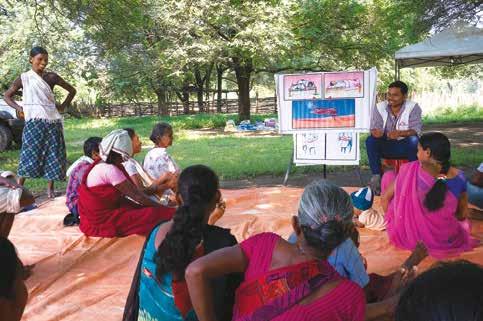
Malaria is transmitted by infected mosquitoes. Symptoms include fever, pain in the joints, shivering, headache, repeated vomiting, convulsions and coma. Severe malaria, nearly always caused by the Plasmodium falciparum parasite, causes organ damage and leads to death if left untreated. MSF field research has helped prove that artemisinin-based combination therapy (ACT) is currently the most effective treatment for malaria caused by Plasmodium falciparum. In 2010, World Health Organization guidelines were updated to recommend the use of artesunate over artemether injections for the treatment of severe malaria in children.
Long-lasting insecticide-treated bed nets are one important means of controlling malaria. In endemic areas, MSF distributes nets to
pregnant women and children under the age of five, who are most vulnerable and have the highest frequency of severe malaria. Staff advise people on how to use the nets.
In 2012, MSF used a seasonal malaria chemoprevention strategy for the first time, in Chad and Mali. Children under five years old took oral antimalarial treatment monthly over a period of three to four months during the peak season for the disease.
MSF treated 2,536,400 people for malaria in 2016.
A lack of food or essential nutrients causes malnutrition: children’s growth falters and their susceptibility to common diseases increases. The critical age for malnutrition is from six months – when mothers generally start supplementing breast milk – to 24 months. However, children under the age of five, adolescents, pregnant or breastfeeding women, the elderly, and the chronically ill are also vulnerable.
Malnutrition in children is usually diagnosed in two ways: it can be calculated from a ratio using weight and height, or by measurement of the mid-upper arm circumference. According to these measurements and to the clinical state, undernourished children are diagnosed with moderate or severe acute malnutrition.
MSF uses ready-to-use food to treat malnutrition. These ready-to-use foods contain fortified milk powder and delivers all the nutrients that a malnourished child needs to reverse deficiencies and gain weight. With a long shelf-life and requiring no preparation, these nutritional products can be used in all kinds of settings and allow patients to be treated at home, unless they are suffering severe complications. In situations where malnutrition
is likely to become severe, MSF takes a preventive approach, distributing nutritional supplements to at-risk children to prevent their condition from deteriorating further.
MSF admitted 261,800 malnourished children to inpatient or outpatient feeding programmes in 2016.
Measles is a highly contagious viral disease. Symptoms appear between eight and 13 days after exposure to the virus and include a runny nose, cough, eye infection, rash, and high fever. There is no specific treatment for measles – patients are isolated and treated with vitamin A, and for any complications: these can include eye-related problems, stomatitis (a viral mouth infection), dehydration, protein deficiencies, and respiratory tract infections.
In high-income countries, most people infected with measles recover within two to three weeks, and mortality rates are low. In developing countries, however, the mortality rate can be between three and 15 per cent, rising to 20 per cent where people are more vulnerable. Death is usually due to complications such as severe respiratory infection, diarrhoea, dehydration or encephalitis (inflammation of the brain).
A safe and cost-effective vaccine against measles exists, and large-scale vaccination campaigns have significantly decreased the number of cases and deaths. However, large numbers of people are left susceptible to the disease, especially in countries with weak health systems, where outbreaks are frequent and where there is limited access to health services.
MSF vaccinated 869,100 people for measles in response to outbreaks in 2016.
Glossary of diseases and activities continued
Meningococcal meningitis is a bacterial infection of the thin membranes surrounding the brain and spinal cord. It can cause sudden and intense headaches, fever, nausea, vomiting, sensitivity to light and stiffness of the neck. Death can follow within hours of the onset of symptoms. Even with treatment, approximately 10 per cent of people infected will die. Up to 50 per cent of people infected will die without treatment.
Six strains of the bacterium Neisseria meningitidis (A, B, C, W135, X and Y) are known to cause meningitis. People can be carriers without showing symptoms and transmit the bacteria when they cough or sneeze. Cases are diagnosed through the examination of a sample of spinal fluid and treatment consists of specific antibiotics.
Meningitis occurs throughout the world, but the majority of infections and deaths are in Africa, particularly across the ‘meningitis belt’, an east–west geographical strip from Ethiopia to Senegal, where prior to the introduction of a meningitis A conjugate vaccine in 2010, epidemics were most likely to be caused by meningococcus A. A vaccine against this strain provides protection for at least 10 years and prevents healthy carriers from transmitting the infection. Large preventive vaccination campaigns have been carried out in countries across the meningitis belt and stopped the cycle of deadly meningococcal A epidemics in the region, but smaller-scale outbreaks caused by other strains continue to be recorded. After the first large meningococcal C epidemic was recorded in Niger and Nigeria in 2015, most cases of meningitis C in 2016 were reported from Niger, without large-scale epidemics.
In total, MSF vaccinated 169,200 people against meningitis in response to outbreaks in 2016.
Traumatising events – such as suffering or witnessing violence, the death of loved ones or the destruction of livelihoods – are likely to affect a person’s mental wellbeing. MSF provides psychosocial support to victims of trauma in an effort to reduce the likelihood of long-term psychological problems.
Psychosocial care focuses on supporting patients to develop their own coping strategies after trauma. Counsellors help people to talk about their experiences, process their feelings and learn to cope so that general stress levels are reduced. MSF also offers group counselling, which is a complementary approach.
MSF staff provided 229,000 individual mental health consultations and 53,300 group mental health sessions in 2016.
MSF’s primary focus is on providing medical care, but in an emergency, teams often organise the distribution of relief items that are essential for survival. Such items include clothing, blankets, bedding, shelter, cleaning materials, cooking utensils and fuel. In many emergencies, relief items are distributed as kits – cooking kits contain a stove, pots, plates, cups, cutlery and a jerrycan so that people can prepare meals, while a washing kit includes soap, shampoo, toothbrushes, toothpaste and laundry soap.
Where people are without shelter, and materials are not locally available, MSF distributes emergency supplies – rope and plastic sheeting or tents – with the aim of ensuring a shelter. In cold climates more substantial tents are provided, or teams try to find more permanent structures.
MSF distributed 107,800 relief kits in 2016.
Emergency obstetrics and newborn care are an important part of MSF’s work. Medical staff assist births, performing caesarean sections when necessary and feasible, and mothers and newborns receive appropriate care during and after delivery.
Many of MSF’s longer-term programmes offer more extensive maternal healthcare. Several ante- and postnatal visits are recommended and include, where needed, prevention of mother-to-child transmission of HIV/AIDS. Contraceptive services are offered and safe abortion care is available, although not yet in all relevant MSF projects. The need for medical care for terminations of pregnancy is obvious: in 2016, MSF treated over 16,000 women and girls with abortion-related concerns and complications, many of which resulted from unsafe attempts to terminate pregnancy.
Skilled birth attendance and immediate postnatal care can prevent obstetric fistulas, a stigmatising medical condition resulting in chronic incontinence. MSF provides surgical care for fistula repair in some of the most remote areas. Since 2012, MSF has piloted cervical cancer screening and treatment. Human papillomavirus infection is the main cause of cervical cancer and particularly affects HIV-positive women.
MSF assisted 250,000 births, including 24,000 caesarean sections, in 2016.
Sexual violence occurs in all societies and in all contexts at any time. Destabilisation often
results in increased levels of violence, including sexual violence. Sexual violence is particularly complex and stigmatising, has long-lasting consequences, and can result in important physical and psychological health risks.
MSF medical care for victims of sexual violence covers preventive treatment against sexually transmitted infections, including HIV, syphilis and gonorrhoea, and vaccinations for tetanus and hepatitis B. Treatment of physical injuries, psychological support and the prevention and management of unwanted pregnancy are also part of systematic care. MSF provides a medical certificate to all victims of violence.
Medical care is central to MSF’s response to sexual violence, but stigma and fear may prevent many victims from coming forward. A proactive approach is necessary to raise awareness about the medical consequences of sexual violence and the availability of care. Where MSF sees large numbers of victims – especially in areas of conflict – advocacy action aims to raise awareness among local authorities, as well as the armed forces when they are involved in the assaults.
MSF medically treated 13,800 patients for sexual violence-related injuries in 2016.
Generally known as sleeping sickness, human African trypanosomiasis is a parasitic infection transmitted by tsetse flies that occurs in sub-Saharan Africa. In its latter stage, it attacks the central nervous system, causing severe neurological disorders and death if left untreated. More than 95 per cent of reported cases are caused by the parasite Trypanosoma brucei gambiense, which is found in western and central Africa. The reported number of new cases fell by 90 per cent between 1999 and 2015 (from around 28,000 to 2,800).
During the first stage, the disease is relatively easy to treat but difficult to diagnose, as symptoms such as fever and weakness are non-specific. The second stage begins when the parasite invades the central nervous system and the infected person begins to show neurological or psychiatric symptoms, such as poor coordination, confusion, convulsions and sleep disturbance. Accurate diagnosis of the illness requires three different laboratory tests, including a sample of spinal fluid.
Nifurtimox-eflornithine combination therapy or NECT, developed by MSF, Drugs for Neglected Diseases initiative (DNDi) and Epicentre, is now the World Health Organization-recommended protocol.
NECT is much safer than melarsoprol, the drug that was previously used to treat the disease, and which is a derivative of arsenic. A new drug being developed by DNDi, fexinidazole, is currently in late-stage clinical trials and once approved will hopefully lead to a safe, effective, short-course treatment for both stages of the disease that can be administered orally.
MSF treated 150 people for sleeping sickness in 2016.
One-third of the world’s population is currently infected with the tuberculosis (TB) bacillus but they have a latent form of the disease and so have no symptoms and cannot transmit it. In some people, the latent TB infection progresses to acute TB, often due to a weak immune system. Every year, over 10 million people develop active TB and 1.8 million die from it.
TB is spread through the air when infected people cough or sneeze. Not everyone infected with TB becomes ill, but 10 per cent will develop active TB at some point in their lives. The disease most often affects the lungs. Symptoms include a persistent cough, fever, weight loss, chest pain and breathlessness in the lead-up to death. Among people living with HIV, TB incidence is much higher, and is a leading cause of death.
Diagnosis of pulmonary TB depends on a sputum sample, which can be difficult to obtain from children. A molecular test that can give results after just two hours and can detect a certain level of drug resistance
is now being used, but it is costly and still requires a sputum sample, as well as a reliable power supply.
A course of treatment for uncomplicated TB takes a minimum of six months. When patients are resistant to the two most powerful first-line antibiotics (isoniazid and rifampicin), they are considered to have multidrug-resistant TB (MDR-TB). MDR-TB is not impossible to treat, but the drug regimen is arduous, taking up to two years and causing many side effects. Extensively drug-resistant tuberculosis (XDR-TB) is identified when patients show resistance to second-line drugs administered for MDR-TB. The treatment options for XDR-TB are very limited. Two new drugs – bedaquiline and delamanid – can improve treatment outcomes for patients with drug-resistant versions of the disease, but their availability is currently limited.
MSF initiated 20,900 patients on treatment for TB in 2016, of which 2,700 for MDR-TB.

Immunisation is one of the most costeffective medical interventions in public health. However, it is estimated that 1.5 million people die every year from diseases that are preventable by a series of vaccines recommended for children by the World Health Organization and MSF. Currently, these are DTP (diphtheria, tetanus, pertussis), measles, polio, hepatitis B, Haemophilius influenzae type b (Hib), pneumococcal conjugate, rotavirus, BCG (against tuberculosis), rubella, yellow fever, and human papillomavirus – although not all vaccines are recommended everywhere.
In countries where vaccination coverage is generally low, MSF strives to offer routine vaccinations for children under the age of five when possible as part of its basic healthcare programme. Vaccination also forms a key part of MSF’s response to outbreaks of measles, cholera, yellow fever, and meningitis. Large-scale vaccination campaigns involve awareness-raising activities regarding the epidemic disease, benefits of immunisation, as well as information in regards to who, when, and where to get the vaccine.
MSF conducted 448,100 routine vaccinations in 2016.
Safe water and good sanitation are essential to medical activities. MSF teams make sure there is a clean water supply and a waste management system in all the health facilities where it works.
In emergencies, MSF assists in the provision of safe water and adequate sanitation. Drinking water and waste disposal are among the first priorities. Where a safe water source cannot be found close by, water in containers is trucked in. Staff conduct information campaigns to promote the use of facilities and ensure good hygiene practices.
Yellow fever is an acute viral haemorrhagic disease transmitted by infected Aedes mosquitoes. Many people do not experience symptoms after being infected with yellow fever; for those who do, symptoms can include fever, headache, jaundice (where the skin and eyes turn yellow), muscle pain, nausea, vomiting, and fatigue. In people who progress to the toxic stage of the disease, high fever and internal bleeding may occur, and half of these patients die within seven to 10 days. There is no curative treatment for yellow fever, but supportive treatment of dehydration and liver and kidney failure improves outcomes.
Yellow fever is difficult to diagnose, especially during the early stages of the disease. It can be prevented by an extremely effective vaccine, which is safe and affordable. However, the vaccine’s availability is constrained by insufficient production, which hinders response to outbreaks as well as preventive immunisation. A fractional dose of yellow fever vaccine was used for the first time as a dose-sparing option to respond to large-scale outbreaks in DRC and Angola in 2016.
MSF vaccinated 1,167,600 people against yellow fever in response to outbreaks in 2016.
On 10 January 2016, Shiara hospital in Razeh district, northern Yemen, was hit by a projectile. Planes were seen flying above the facility supported by Médecins Sans Frontières (MSF) in an area where the Saudi-led coalition had been active. Six people were killed and eight were injured. On 15 February, Ma’arat Al Numan hospital in Idlib (northern Syria) was hit by airstrikes within a few minutes of each other. Twenty-five people were killed, including one MSF staff member and nine local hospital staff.
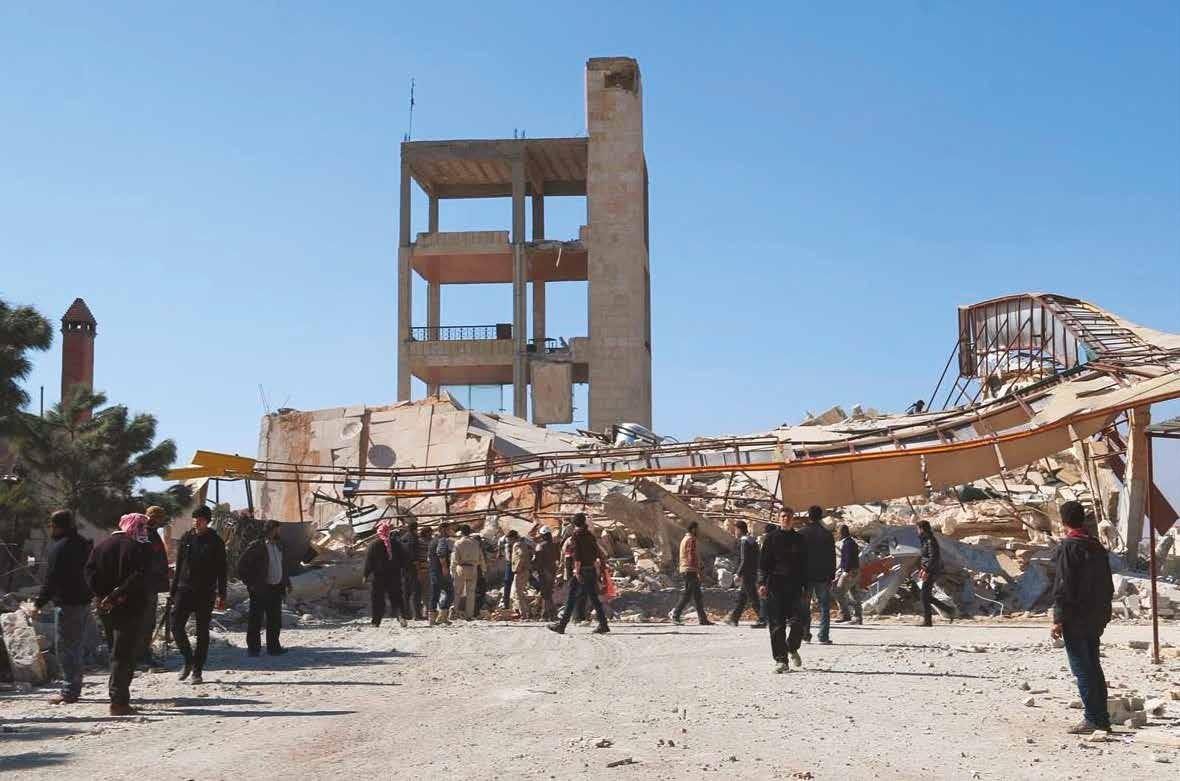
Until then, the outpatient department of this hospital had been treating around 1,500 people a month and its emergency room had been carrying out, on average, 1,100 consultations. The destruction of the hospital left the local population of approximately 40,000 people without access to medical services in an active conflict zone.
These dramatic events in Yemen and Syria set the tone for a year marked by attacks on healthcare facilities. In 2016, MSF reported at least 74 attacks (71 in Syria and three in Yemen) on 34 health structures it was managing or supporting. In Syria, 58 of the 71 attacks occurred in Aleppo governorate.
Of these, 45 took place during the offensive on east Aleppo between July and December 2016. Dozens of medical staff, patients and their caretakers were killed as a result of shellings and bombings of hospitals in these countries. In many areas, MSF was unable to maintain an international staff presence and local medical staff had to suffer the attacks and their tragic consequences with limited outside support.
Attacks on hospitals are nothing new, and health workers and facilities are no strangers to acts of violence. However, these incidents have been occurring at an alarming rate and taken a horrific toll. In Syria, they have
become part of an all-out war, a dynamic of terror aimed not only at medical facilities but also at public spaces and humanitarian convoys. It seems that anything goes to deny care and assistance to a population in areas considered hostile. In northern Yemen, medical facilities, including some supported by MSF, have been completely destroyed in blanket bombings, bringing medical services to a standstill.
Whether healthcare facilities are targeted within the context of counter-terrorist operations, as a way to deprive enemycontrolled territories of key infrastructure, or as a strategy to make life unbearable for
civilians in areas considered to be hostile, the consequences are similar: patients and their caretakers are killed or injured, local medical providers are depleted, and emergency care is disrupted at a time when people need it most. Routine medical services are also interrupted. Where will the child with pneumonia go for treatment? What happens to vaccine schedules in a city under siege?
Perhaps the most insidious consequence is that this violence makes hospitals places to be feared. In mid-2016, local communities in the southern Syrian town of Jasim protested against the reopening of a hospital out of fear of more attacks. In Yemen, some have reported feeling safer at home than in hospital. Bombing hospitals is inherently about destroying the last havens of humanity in war.
Reassurances given by the powers that be – some of whom have been directly involved in hospital bombings – are hollow, if not hypocritical. UN Security Council members unanimously signed a resolution on 3 May 2016 (Resolution 2286) reaffirming the protected status of medical services and civilians in conflict. Yet attacks have continued on their watch and, at times, with their involvement. In the past two years, four of the five permanent members of the Security Council have, to varying degrees, enabled or been involved in attacks against medical facilities. The Syrian government and its Russian allies, the US government and its Afghan allies, and the international coalition headed by Saudi Arabia in Yemen, and backed by the US, the UK and France, all share a deplorable track record of being associated with bombings of medical facilities. These broad attacks on communities and targeted strikes on health facilities are excused by their perpetrators as ‘mistakes’, denied outright, or met with justifications or simply silence. Public posturing notwithstanding, the roots of this phenomenon appear to run deep. The means of waging war have evolved and the traditional definitions of what war
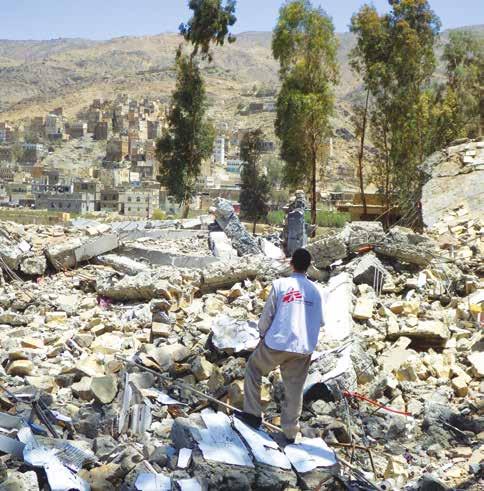
is, what self-defence means, and who constitutes a combatant or a civilian are being contested. And so, in turn, is the provision of medical care to a sick or wounded enemy. Paving the way for “unconstrained use of military power by states around the globe 1”, these dynamics have also contributed to creating an environment in which principles such as proportionality and distinction are eroded and decisions are made that lead to the deaths of medical personnel and patients. Our doctors are not present in conflict areas to dispense treatment on the basis of their judgment of the justness of a cause or the morality of the combatants. They are there to care for the sick and wounded, irrespective of their affiliations and whether they have participated in the conflict, and that includes those labelled as terrorists or criminals.
Although we might have felt a little more helpless each time we heard about the bombing of yet another hospital this year, we need to keep looking for ways to prevent attacks on medical facilities. We must take action so that the perpetrators pay the highest possible political price for them. As long as the military and political benefits outweigh the costs, and there are no real consequences for bombing hospitals and killing those inside, how can we expect these attacks to stop? MSF will continue to speak out loudly and clearly about what our teams and those supported by us witness in the field. We will act in solidarity with the medical professionals in the field and the citizens concerned, and crucially, we will continue to strive to deliver humanitarian assistance to people caught up in conflicts.
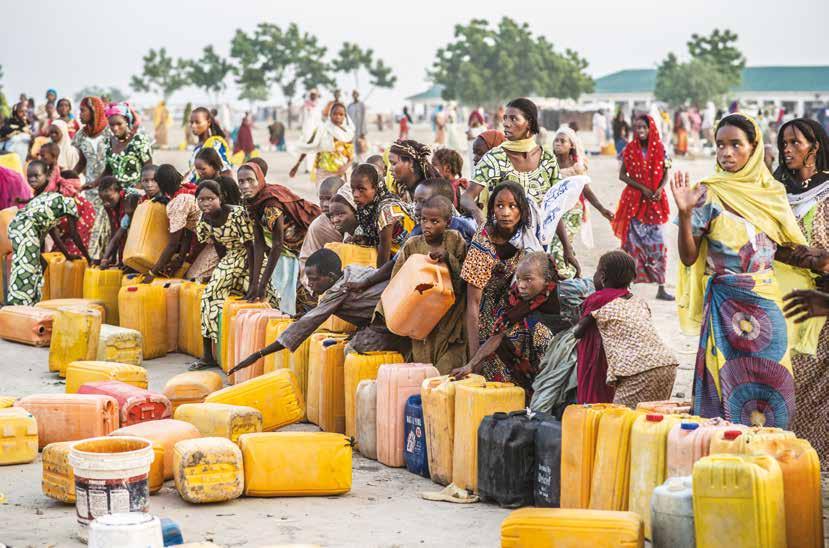 By Natalie Roberts
By Natalie Roberts
In 2016, a devastating humanitarian crisis continued to unfold in Nigeria, largely unnoticed by the rest of the world. Caught between attacks by the armed group Boko Haram and the counterinsurgency operations of the armed forces, millions of people in northeast Nigeria have been displaced from their homes and are unable to sustain their usual livelihoods of farming, fishing and trade. Entire towns and villages have been razed, and infrastructure, including healthcare facilities, destroyed. Thousands of children have succumbed to the deadly combination of malnutrition, measles and malaria in Borno state.
In Maiduguri, the state capital, the population has more than doubled to over two million since 2014, with the arrival of people fleeing insecurity. This has put an additional strain on the infrastructure, which was already struggling to cope in the country’s first financial recession in 25 years. Displaced people in Maiduguri live in extremely precarious conditions, either among the host population, sleeping in the streets, or in a series of informal settlements without adequate shelter, water or sanitation, where they are vulnerable to violence, abuse and communicable diseases. Few can afford food or basic lifesaving healthcare.
Médecins Sans Frontières (MSF) has had a permanent presence in Maiduguri since 2014, treating malnutrition, providing maternal health services, and responding to outbreaks of cholera and measles. The MSF team based in the city had to remain small, but was one of the few international organisations present in Borno. Until 2016, rampant insecurity, as well as difficulties in convincing the authorities of the scale of the crisis, prevented MSF from expanding their response. However, epidemiological surveys conducted in informal settlements in the city revealed evidence of extreme malnutrition and mortality during the first
nine months of the year, affecting children in particular.
In the summer, suspicions that the plight of those living outside the capital was just as extreme were confirmed. The team had been unable to leave Maiduguri due to active conflict throughout the state, until the spring, when the Nigerian armed forces began to allow certain aid organisations access to towns that had fallen under their control, provided that they were accompanied by armed escorts. MSF usually refuses armed escorts in order to maintain a distinction between military and
humanitarian operations. However, in June, more than 1,000 emaciated women and children were evacuated by the army to Maiduguri from Bama, a town 70 kilometres away. After screening and treating this group for malnutrition, MSF made the exceptional decision to accept an armed escort to assess the situation in Bama. Upon arrival, the team found thousands of displaced women and children living in camps under military control, with almost no access to food, clean water or healthcare. Malnutrition rates were far above what constitutes a crisis, and there were signs that many people had already died.
MSF began offering assistance in Bama, and over the following months managed to access numerous other towns across the state. In many locations, the teams found similarly appalling rates of malnutrition and mortality. Given the lack of an adequate aid response, MSF teams started to provide healthcare and nutritional support, improve access to water and sanitation, conduct vaccinations, and distribute food and relief items in over 20 sites in Maiduguri and 11 other towns in the state. MSF data helped to convince the national authorities and
international aid agencies of the severity and scale of the emergency. By the end of 2016, the World Food Programme and other aid organisations had begun to implement large-scale interventions.
As the year drew to an end, the emergency was far from over, with mass displacement and active conflict continuing and basic health infrastructure practically nonexistent in many locations. Many areas of Borno state are entirely inaccessible for humanitarian organisations and the fate of those stranded there is unknown. The first months of 2017 will be a race against time to save lives, prepare for the next seasonal hunger gap, and to try to implement preventive health measures before there is another disease outbreak.
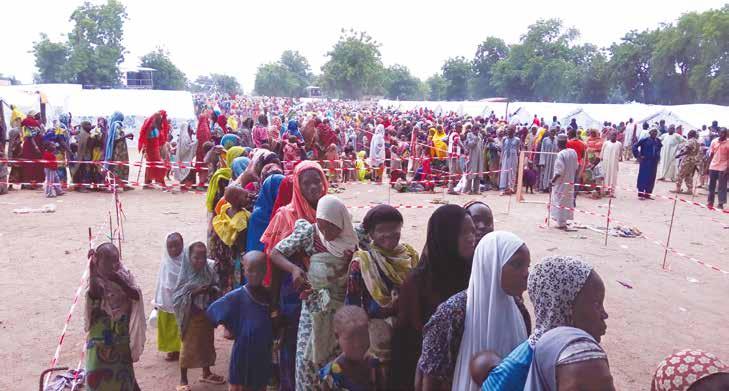
MSF’s work is based on the principles of independence and impartiality, but independent access in Borno state has been a serious challenge. MSF would normally negotiate with all armed groups in a conflict and work to gain the acceptance of the community to make clear that its intention is only to provide medical assistance to people in need, and not to assist one side
in a conflict. This independence of action normally allows MSF privileged access to all sides, and helps ensure that all warring parties respect the safety and security of MSF staff and patients.
In this highly insecure context, with very few other aid organisations present, MSF teams have had to make difficult choices and compromises to reach vulnerable communities in desperate situations. MSF teams have had to take extraordinary risks, travelling with armed escorts or using helicopters in an active conflict zone. Meanwhile, access to areas held by Boko Haram is virtually non-existent; similarly, MSF and other organisations have little access to the groups of men, women and children subjected to screening by the Nigerian armed forces for indeterminate periods of time. The extent to which Boko Haram will accept MSF interventions is still unclear, but our priority will be to continue to negotiate with them, and with the armed forces, who are supported militarily by the UK and the US, regarding our wish for independent access to all people in need, no matter where they are.
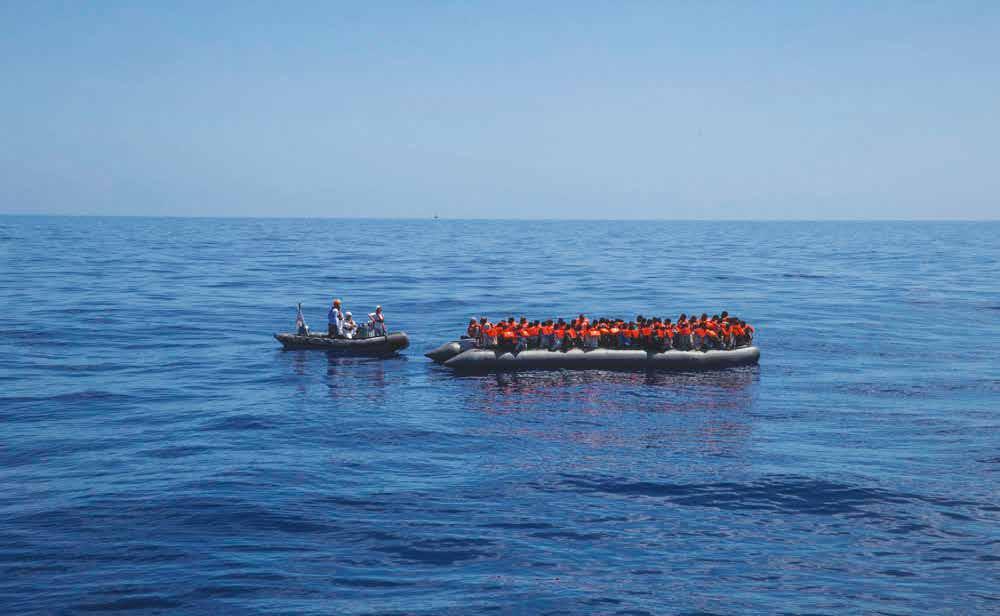 by Caitlin Ryan
by Caitlin Ryan
In 2016, with still no safe or regular route out of Libya for asylum seekers and other migrants transiting or fleeing the country, at least 4,579* men, women and children died while risking it all to get to Europe. The UNHCR, the UN refugee agency, estimates that 181,436 people made it to the relative safety of Italian shores, but each and every one of them had a story of hardship and suffering to tell. Sixteen per cent of the people who arrived in Italy were children and teenagers under 18 years of age, and 88 per cent of them were travelling alone.
The arduous journey for the 21,603 people MSF teams rescued began in countries as diverse as Bangladesh and Nigeria. There were also many from other sub-Saharan African countries – Guinea, Côte d’Ivoire, Mali, Chad and The Gambia – and from the Horn of Africa, especially Eritrea, as well as Syria and other countries in the Middle East. They fled wars, torture, conscription, forced labour, mass human rights violations, discrimination based on their sexuality, violence, persecution, extreme poverty and destitution.
According to the people interviewed by our teams, men, women and, increasingly, unaccompanied children transiting or living in Libya, are suffering extreme abuse at
the hands of smugglers, armed groups and individuals who exploit the desperation of those fleeing conflict, persecution or poverty. The abuses reported to MSF teams include being subjected to violence (including sexual violence), kidnapping, arbitrary detention in inhumane conditions, torture and other forms of ill-treatment, financial exploitation and forced labour.
Regardless of their reasons for taking to the sea in the first place, all those pushed to embark on an overcrowded and poor-quality boat were exposing themselves to a huge risk. The death toll on the central Mediterranean was higher in 2016 than in previous years, with more than one person dying for every
In 2016, the large wooden boats of 2014 and 2015 were nearly all replaced with cheap single-use rubber boats carrying many more people than before.
39 who survived. Despite these shocking figures, the European response was more of the same deterrence logic. Rather than focusing on saving lives and providing those fleeing Libya with a safe and regular route into the EU, the authorities decided to target smugglers, and shift responsibility to countries far from European shores. This approach served only to force smugglers to change their tactics and operate in an even more dangerous way to avoid patrols, thus causing yet more deaths. Once again in 2016, search and rescue, while only a band-aid solution, became the lifeline for thousands, and saved them from almost certain death on the sea.
* Source: International Organization for Migration, Missing Migrants Project.
and
or
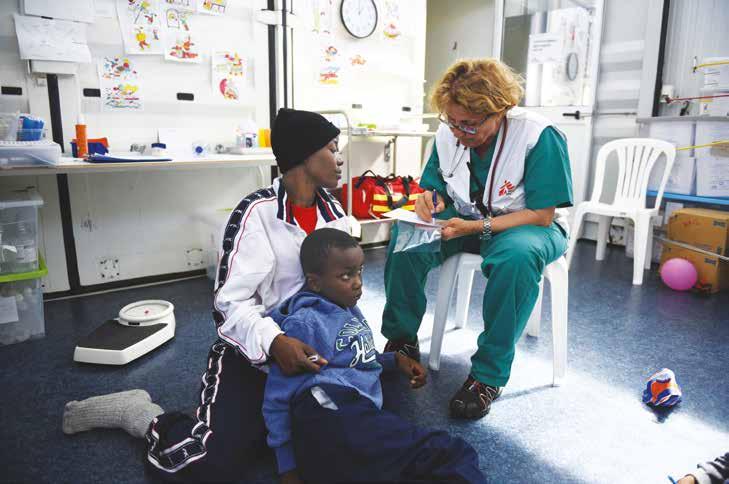
weeks
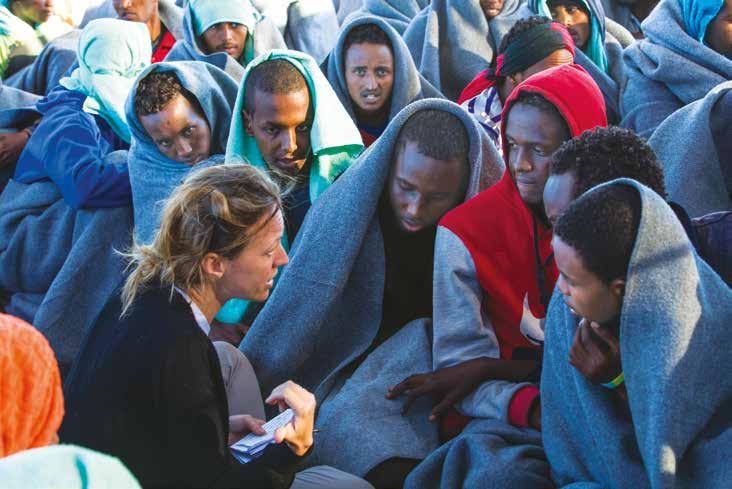
In contrast to previous years, the men, women and children attempting to cross the Mediterranean were seldom equipped with life jackets or even the food, water and fuel needed for such a gruelling journey. None of the boats would have made it to Italy had they not been rescued by MSF or another organisation.
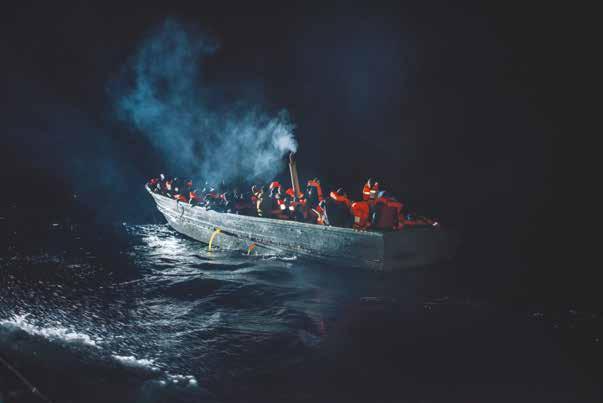
These shockingly low-quality boats resulted in tragedy after tragedy. On several occasions, MSF teams recovered the bodies of men, women and children from the bottom of the boat, where they had been crushed under the weight of other passengers and asphyxiated, or had drowned in the toxic mix of fuel and sea water that collects there.
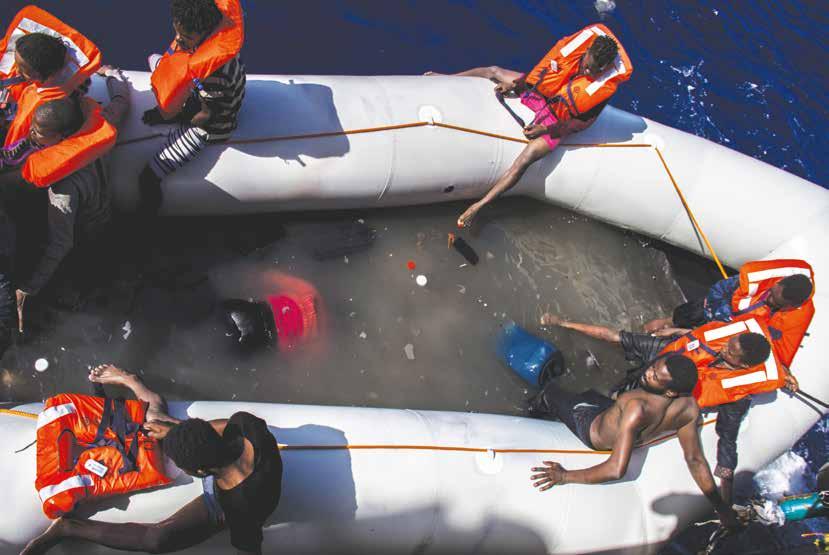
In 2016, night rescues became increasingly frequent, with MSF teams going to the assistance of one boat after another in the early hours of the morning, as smugglers started to send them at odd hours in a bid to escape detection and capture.
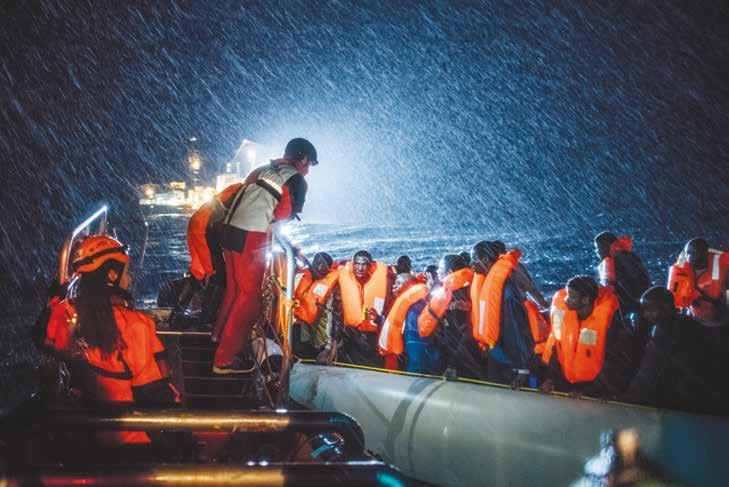
On several occasions, MSF vessels had to rescue more than 10 boats in a single 24-hour period, their decks filling to bursting p oint with people extremely relieved to have made it out of Libya alive. Smugglers had started sending boats out to sea in large floti llas, hoping that even if some were captured by Libyan coastguard patrols, the majority would make it to international waters and be rescued and taken to Italy.

A long queue has formed outside a community centre in Lusaka, Zambia. People of all ages wait patiently in the sun for their turn to enter. Inside, young mother Mathilda stands with her three-year-old daughter Edna on her hip. They are each given a small glass vial of liquid and, throwing their heads back, they swallow the contents.
It’s April and Lusaka, Zambia’s capital city, is in the grip of a major cholera outbreak. The overcrowding and poor sanitation in the informal settlements where 1.2 million people live, together with the late arrival of the rainy season, have created the ideal conditions for a cholera outbreak. In response, MSF has collaborated with the Zambian Ministry of Health to launch the largest-ever oral cholera vaccination campaign. Nearly half a million people will, like Mathilda and Edna, receive one dose of the oral vaccine to help curtail the spread of the disease.
In many other countries in the world, MSF continues to run emergency vaccination campaigns in response to outbreaks of disease, and provide catch-up immunisations for vulnerable children.
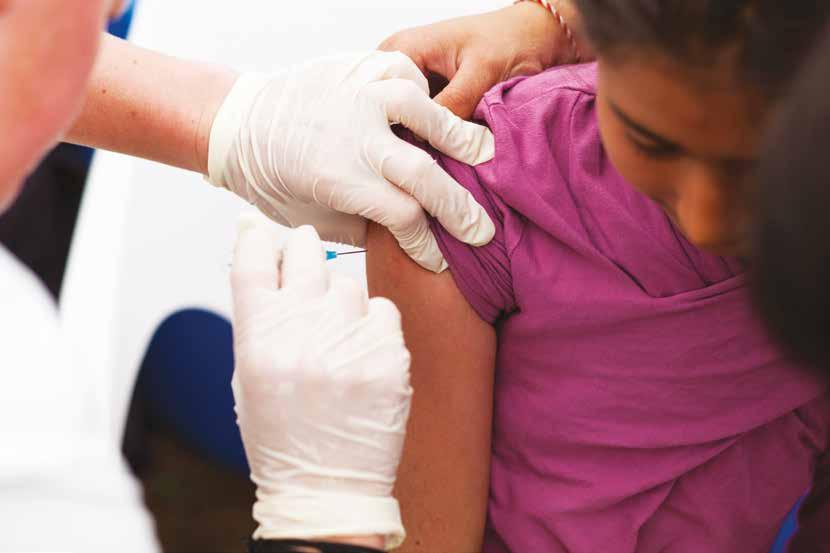
Between May and September 2016, MSF vaccinated more than a million people in the Democratic Republic of Congo (DRC) as part of the Ministry of Health’s response to an outbreak of yellow fever that began in neighbouring Angola. The logistical and organisational requirements were huge, involving 100 teams composed of 160 staff from 20 countries, with a fleet of 65 vehicles, carrying 4,000 ice packs and coolers every day. However, the outbreak – in which there were nearly 1,000 confirmed cases and a further 7,300 suspected cases across the two countries – exposed the fragility of the vaccine supply. With only six million doses of the yellow fever vaccine available globally, and the vaccine’s manufacturers able to produce just three million doses a month,
the need to rapidly vaccinate over 10 million people in DRC alone left the World Health Organization scrambling for a solution. The decision was made to administer a fraction of the normal dose, giving enough protection to last until the end of the outbreak.
In Central African Republic (CAR), MSF participated in a catch-up vaccination campaign of an unprecedented scale, targeting nearly a quarter of a million children over the course of the year. Fewer than one in 10 children are fully vaccinated in CAR. In one burst of activity, MSF staff, working in partnership with the Ministry of Health, vaccinated 14,000 children in just five days. Dozens of cars and motorbikes were used by nearly 370 staff in 16 mobile teams to access vaccination sites across CAR. Children under the age of five were vaccinated against polio, tetanus, diphtheria, whooping cough, hepatitis B, measles, and strains of pneumonia and meningitis.
In 2016, Médecins Sans Frontières (MSF) took part in a number of massive vaccination campaigns.» ABOVE PHOTO: An MSF team vaccinates a child against the most common preventable diseases at a camp in Evzoni, close to Idomeni camp, in northern Greece.
During 2016, MSF carried out its first emergency vaccination campaigns in Europe. Starting in May, teams vaccinated 3,000 children against common childhood diseases in Idomeni in Greece, near the border with the Former Yugoslav Republic of Macedonia. Throughout the summer, catch-up vaccination campaigns took place in camps in Attica, central Greece, on the islands of Samos and Lesbos, and in Elliniko, near Athens; a total of 7,000 children were vaccinated across Greece. Children aged between six weeks and 15 years were vaccinated against a number of diseases, including pneumonia – one of the biggest killers of children under the age of five, with a million dying of it each year.
However, the price for this intervention in Greece was high. The pneumococcal conjugate vaccine (PCV) used in the campaigns was bought at the eye-wateringly expensive price of € 60 (US$68) per dose. That is around 20 times the lowest global price of just over US$3 per dose – or nearly US$10 per child for the three doses needed
for full protection. Meanwhile, vaccination campaigns using PCV in CAR relied on donated vaccines, an unsustainable practice.

The need for affordable lifesaving vaccines like PCV in MSF’s operations prompted MSF’s Access Campaign to launch its A Fair Shot campaign in 2015. This followed the ultimate failure of seven years of negotiations for affordable and sustainable access to PCV with Pfizer and GlaxoSmithKline (GSK), the two pharmaceutical corporations that make the vaccine.
Through the campaign, MSF urged Pfizer and GSK to lower the price of PCV to US$5 per child, for three doses, for all developing countries, including middle-income countries like Jordan – which are not eligible for the lowest global price – and for humanitarian organisations like MSF to protect vulnerable children. A global petition, pushing for a price of US$5 per child, was signed by nearly half a million MSF supporters in 170 countries and handed to each company.
There was a breakthrough in September, when GSK announced that it would offer humanitarian organisations like MSF access to PCV at the lowest global price for use in humanitarian emergencies. Pfizer, under continued pressure, finally caved in and announced in November that it would follow suit. However, both companies continue to hold out on extending the offer to middleincome countries. Currently, more than a third of the world’s countries have not been able to introduce PCV due to its high price, and children in those countries remain unprotected against pneumonia.
During 2016, MSF vaccinated more than 2.2 million people in response to outbreaks and nearly half a million more for routine immunisation. MSF will continue to campaign and pursue strategies that will enable its staff to vaccinate more people in the constrained settings in which they work, as the best way to prevent many diseases.
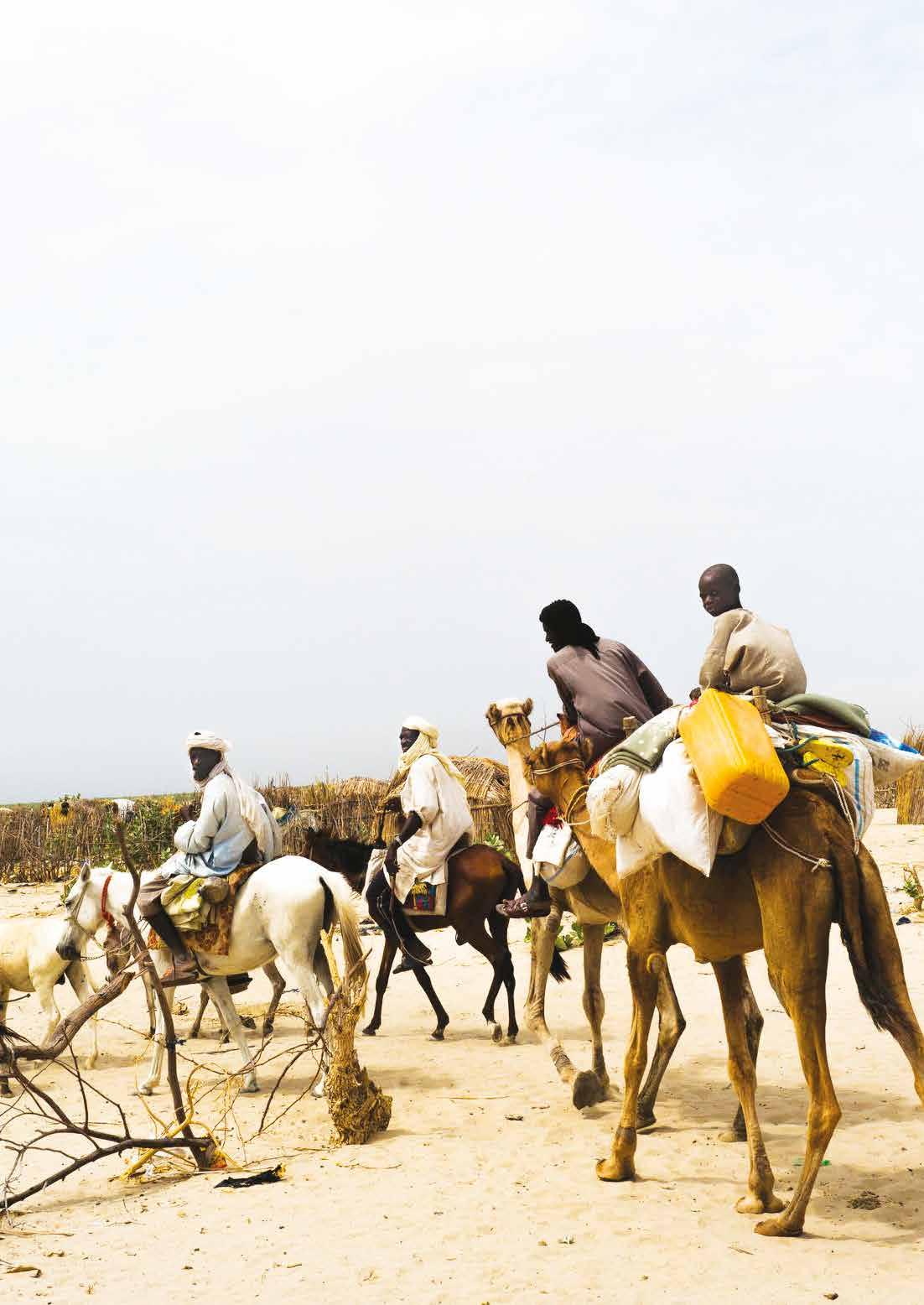
No. staff in 2016: 1 | Expenditure: d 0.4 million | Year MSF first worked in the country: 1998
In 2015, MSF opened a programme to increase the availability of HIV care for vulnerable groups of people, such as migrants, intravenous drug users and sex workers. Since then, MSF has worked closely with two Algerian organisations in a number of centres run by the Ministry of Health and other partners, including one in the port city Annaba. MSF contributes
to raising awareness of HIV prevention strategies by conducting health promotion and outreach activities with groups at risk. Teams also offer testing services in the community and provide reference centres with technical support to standardise treatment, monitoring and protocols. In 2016, MSF donated laboratory equipment and supported the decentralisation of care.
No. staff in 2016: 24 | Expenditure: d 1.9 million | Year MSF first worked in the country: 1998
According to the official figures from the Ministry of Health, 4,599 suspected cases of yellow fever were reported in 2016; 884 people tested positive and of these, 384 died. MSF supported the treatment of patients with yellow fever in Benguela and Huambo provinces, and in Viana in Luanda province, between February and August. The team managed a total of 740 patients, 127 of whom tested positive for the disease. Besides direct management of patients, MSF also trained officials from the Ministry of Health and donated medicines and medical supplies to provincial and municipal hospitals.
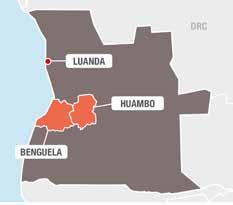
Nearly two-thirds of these 740 people were adult men and more than half of the
positive cases were detected in Huambo province (71 cases). Admissions to Huambo provincial hospital and Kapalanga hospital in Viana peaked in March. MSF started activities in Benguela in May and saw the highest admissions in June. Yellow fever is transmitted by the Aedes mosquito and the initial symptoms are similar to those of other illnesses such as the flu or malaria. One in five people infected with yellow fever develops severe toxic symptoms that may be fatal in up to 80 per cent of patients.
MSF will continue to support the local authorities to provide emergency healthcare services in Angola.
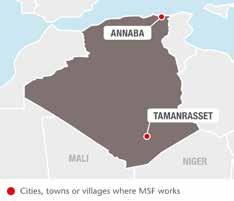
after an absence of nine years, by supporting local authorities following an
No. staff in 2016: 2,200 | Expenditure: d 25.1 million | Year MSF first worked in the country: 1980 | msf.org/afghanistan blogs.msf.org/afghanistan | @MSF_Afghanistan
KEY MEDICAL FIGURES:
328,100 outpatient consultations
66,000 births assisted
5,500 surgical interventions
After a US military airstrike destroyed its trauma centre in Kunduz, killing 42 people, in October 2015, MSF engaged in negotiations regarding the neutrality of medical care with all parties to the conflict. At the end of 2016, MSF finally obtained commitments that its staff and patients would be respected, and care could be provided to everyone in need, regardless of their ethnicity, political beliefs or allegiances. Although hard to guarantee in an active conflict zone, MSF believes these commitments will allow it to evaluate the possibility of resuming trauma care activities in Kunduz in 2017.
The conflict in Afghanistan continued to intensify in 2016. MSF’s other projects in the country remained operational, with the number of patients increasing due to growing medical needs. A quarter of all the births assisted by MSF worldwide are in Afghanistan, and teams helped deliver more than 66,000 babies this year.
The capital Kabul has experienced a massive population growth, and the city’s public health services cannot fulfil the medical needs. At Ahmad Shah Baba district hospital
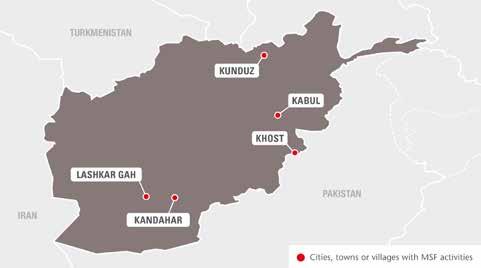
in eastern Kabul, which serves more than 1.2 million people, MSF supports the Ministry of Public Health to deliver outpatient and inpatient care, with a focus on maternal health and emergency services. The team also provides paediatric care, treatment for malnutrition, family planning, health promotion and vaccinations, and supports the hospital’s laboratory, X-ray services and tuberculosis (TB) treatment programme.
MSF has increased the capacity of the hospital from 46 to 62 beds and this year started to rehabilitate the buildings. Staff conducted 100,000 consultations and assisted 18,966 deliveries, almost 20 per cent more than in 2015.
In 2016, MSF started a new programme for the treatment of chronic non-communicable diseases such as diabetes, hypertension, chronic obstructive pulmonary disease, asthma and epilepsy. Around 600 patients were enrolled.
MSF collaborates with the Ministry of Public Health to provide around-the-clock care at Dasht-e-Barchi hospital, the only facility for emergency and complicated deliveries in a district with a rapidly increasing population. MSF runs the labour and delivery rooms, an operating theatre for caesarean sections
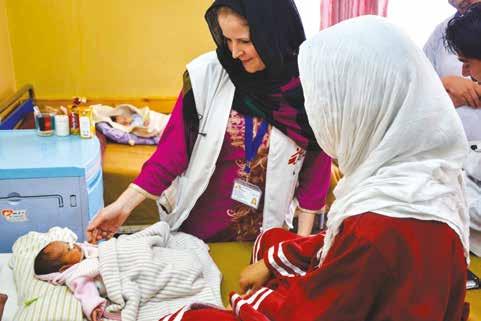
Médecins Sans Frontières (MSF) focuses on improving access to emergency, paediatric and maternal healthcare in Afghanistan, which has one of the highest maternal mortality rates in the world.A paediatrician examines a baby in Dasht-e-Barchi’s Kangaroo Mother Care Unit.
and other complicated deliveries, a recovery room, a 30-bed maternity unit, a 20-bed neonatology unit and a five-bed ‘kangaroo room’, which provides specialist care for sick babies in their first days of life. In addition, MSF offers vaccinations and runs the laboratory, blood bank and sterilisation unit.
In 2016, teams assisted 15,627 deliveries, almost 27 per cent of which were complicated cases. The team is now aiming to increase referrals for simple deliveries, in order to focus on complicated cases and maintain a high quality of care.
Working at full capacity, the neonatology unit admitted 1,342 babies with complications such as clinical sepsis, hypoglycemia and perinatal asphyxia.
In 2012, MSF opened a maternity hospital in Khost, in eastern Afghanistan, to address the lack of obstetric care in the area. The hospital helps reduce maternal mortality by offering a safe environment for women to deliver their babies, in the care of predominantly female medical staff, free of charge.
The number of deliveries has increased by 40 per cent in two years, from 15,204 in 2014
to 21,335 in 2016. In December, the number of deliveries reached 1,905, an average of over 60 per day. In 2016, 1,746 newborns were admitted to the neonatology unit, a 15 per cent increase compared to the previous year.
This year, MSF began supporting three health centres in outlying districts in Khost province to increase their capacity to assist normal deliveries. The aim is to reduce the number of simple deliveries at Khost maternity hospital, so that the medical team there can focus on assisting complicated births.
Since 2009, MSF has supported Boost provincial hospital in Lashkar Gah, Helmand province, one of only three referral hospitals in southern Afghanistan. Over the years, MSF has significantly increased the number of staff at the hospital and carried out major construction works. This year, the team completed the rehabilitation of the entire original hospital building and extended the maternity department. The hospital has grown from 150 to 327 beds, with the number of patients admitted monthly increasing from around 120 in 2009 to an average of 2,750 in 2016. Staff assisted 10,572 deliveries in 2016.
The hospital has a neonatology unit, as well as a 109-bed paediatric department, which includes an inpatient therapeutic feeding centre, where 2,431 children were treated for malnutrition in 2016.
MSF also supports the internal medicine department, intensive care unit and emergency room. MSF teams monitor TB cases and work in the isolation ward for infectious diseases.
Intense fighting in 2016 in Helmand province hampered access to the hospital for many patients. Still, 20 per cent of them came from outside the city, exposing themselves to significant risks due to active fighting and dangerous roads.

In 2016, MSF started supporting the diagnosis and treatment of drug-resistant TB (DR-TB) in Kandahar province, and opened a laboratory and facilities to host patients during their treatment in Kandahar city. MSF also provided additional staff at Mirwais hospital, and organised training for other facilities to improve case detection. During the last quarter of 2016, 13 patients were diagnosed with multidrug-resistant TB.
No. staff in 2016: 43 | Expenditure: d 1.8 million | Year MSF first worked in the country: 1988 | msf.org/armenia
KEY MEDICAL FIGURE:
73 patients under treatment for TB, of which 66 for MDR-TB
Tuberculosis continues to be a major public health concern in Armenia. The incidence of drug-sensitive TB is estimated at 41 new cases per 100,000 people per year, while 11 per cent of new cases, and 47 per cent of previously treated cases, are drug-resistant. Around 10 per cent of MDR-TB patients have the extensively drug-resistant (XDR) form of the disease. The main challenge when treating MDR-TB patients is the length and toxicity of the regimen itself – it involves taking up to 20 tablets every day for two years, and months of painful daily injections. For some patients, a port-a-cath is implanted to ease the twice-daily intravenous injections. Permanent hearing loss, suicidal depression
and psychosis are among the side effects of the treatment, which is only successful for around half of MDR-TB patients and a quarter of those with XDR-TB.
Armenia was one of the first countries in the world to authorise the use of two new TB drugs, bedaquiline and delamanid, which promise to be less toxic and more effective. In 2016, this continued to be the focus of MSF activities in Armenia, and care for patients on standard MDR-TB treatment was handed over to the Armenian authorities.
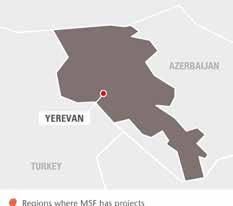
A total of 73 patients began treatment for TB in 2016, including 66 MDR-TB patients who started regimens containing new drugs.
healthcare to vulnerable people in Bangladesh, including a large number of Rohingya refugees from Myanmar.
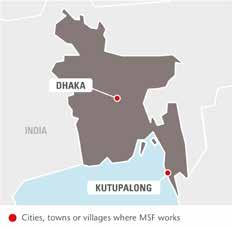
in 2015. In addition, 15,194 antenatal consultations were conducted.
KEY MEDICAL FIGURES:
109,000 outpatient consultations
19,800 antenatal consultations
6,900 individual mental health consultations
Close to the Kutupalong makeshift camp in Cox’s Bazar district, MSF runs a clinic offering comprehensive basic and emergency healthcare, as well as inpatient and laboratory services to Rohingya refugees and the local community. There was a sharp increase in patient figures in the last two months of the year, due to a huge influx of Rohingya fleeing Myanmar’s northern Rakhine state. The team treated 113 violence-related injuries in November and December, including 17 with gunshot wounds. During the year, teams carried out 89,954 outpatient, 2,491 inpatient and 4,559 mental health consultations. They also treated 103 victims of sexual violence in 2016, more than double the number
No. staff in 2016: 331 | Expenditure: d 4.3 million | Year MSF first worked in the country: 1985 | msf.org/bangladesh Cities,
In Kamrangirchar slum, in the capital Dhaka, MSF offers reproductive healthcare to adolescent girls, carrying out 4,578 antenatal consultations and assisting 457 deliveries in 2016. The team also provided medical and psychological support to 535 victims of sexual violence and intimate partner violence. In addition, 2,324 family planning sessions and 2,379 individual mental health consultations were conducted with people of all ages. MSF continues to run its occupational health programme for factory workers in Kamrangirchar, and this year carried out a total of 8,923 consultations.
Sans Frontières (MSF) is focusing on implementing new regimens for patients with multidrug-resistant tuberculosis (MDR-TB) in Armenia, which has one of the highest rates of the disease in the world.
No. staff in 2016: 23 | Expenditure: d 1.4 million | Year MSF first worked in the country: 2015 | msf.org/belarus
Belarus is listed as an MDR-TB high-burden country in the World Health Organization’s 2016 Global Tuberculosis Report. MSF is supporting the Ministry of Health in four TB facilities: the Republican Scientific and Practical Centre of Pulmonology and Tuberculosis (RSPC PT), 1st and 2nd City TB dispensaries in Minsk, and City TB hospital in Volkovichi, Minsk region. MSF provides psychosocial support (counselling, food parcels, transport vouchers, support by social workers) to between 150 and 200 patients each month to help them stay on their treatment. MSF conducted a review in 2016 and identified alcohol use disorder as one of the main risk factors for poor adherence and the team now addresses this in the programme.
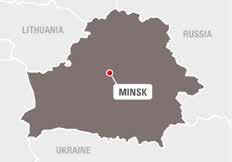
By the end of 2016, MSF was also treating 50 patients with extensively drugresistant TB with new regimens containing bedaquiline and/or delamanid.
The MSF project is participating in the endTB observational study (output 1). The study covers more than 15 countries and aims to find shorter, less toxic and more effective treatments for multidrug-resistant TB (MDR-TB) with fewer debilitating side effects. MSF is conducting the study in partnership with Partners In Health and Interactive Research and Development. By the end of December 2016, 46 patients in Belarus had been recruited for the study. At the end of the year, MSF and the RSPC PT obtained approval from the regulatory authorities and the ethics committee to collaborate in a clinical trial for MDR-TB that will run concurrently with the endTB study.
No. staff in 2016: 17 | Expenditure: d 0.6 million | Year MSF first worked in the country: 1986 | msf.org/bolivia
In 2016, Médecins Sans Frontières (MSF) started to wind down its activities in the municipality of Monteagudo and presented Bolivia’s Ministry of Health with a comprehensive care manual for managing Chagas disease in rural areas.
Bolivia is still the country with the highest incidence of Chagas worldwide. It is endemic in 60 per cent of the country and around 4,440,000 people are at risk of infection.
1,094 cases to be detected and, of these, 445 patients concluded the treatment.
KEY MEDICAL FIGURE:
MSF is preparing to close its project in Monteagudo, Chuquisaca department, where the team had collaborated with the Ministry of Health to implement an integrated strategy for the treatment and prevention of Chagas in public health services.

Throughout the year, teams carried out community training and awareness-raising activities for health workers in urban and rural communities on the integral management of the disease. The medical workforces of 17 health centres in the area were trained. This intervention enabled
This year, MSF launched a mobile app called eMOCHA in three municipalities within Narciso Campero province. This app enables people to report the location of vinchuca or ‘kissing’ bugs, the insects that transmit Chagas disease, by sending an SMS so they can be removed quickly and efficiently.
The operating manual MSF developed is intended as a toolkit to guide the Ministry of Health, municipal authorities and the National Chagas Programme in the fight against the disease. It is based on MSF’s experience implementing the comprehensive care model in Montagudo and can be used as a reference in other endemic regions in the country.
450 patients treated for Chagas
Médecins Sans Frontières (MSF) is working with the Ministry of Health in Belarus to improve adherence to treatment for patients with multidrug-resistant tuberculosis (MDR-TB).

No. staff in 2016: 296 | Expenditure: d 6.4 million | Year MSF first worked in the country: 1992 | msf.org/burundi
KEY MEDICAL FIGURES:
15,800 outpatient consultations
3,200 surgical interventions
350 patients treated for cholera
L’Arche Kigobe, a private facility, is one of two hospitals providing care for victims of trauma in Bujumbura, where rife political tensions and economic difficulties have heavily impacted the local population. MSF started activities in the clinic in 2015 during the riots that occurred around the time of the presidential elections. In 2016, MSF increased L’Arche’s capacity from 43 to 75 beds, and expanded care to treat all victims of trauma.
In 2016, teams treated 4,839 patients in the emergency department, admitted 1,801 to hospital and performed some 3,184 surgical interventions. Specialised

physiotherapists provided 11,237 sessions for patients recovering from surgery. In addition, 1,160 patients received psychological support.
MSF responded to two cholera alerts during the peak season (between August and November). In PRC hospital in Bujumbura, a team set up a cholera treatment centre (CTC) and supported the management of 57 patients. MSF also set up two CTCs in Kabezi and Ruziba and treated a total of 295 patients. To prevent the spread of the disease, teams disinfected 2,832 households and provided equipment so families could treat their drinking water.
No. staff in 2016: 73 | Expenditure: d 2.7 million | Year MSF first worked in the country: 1979 | msf.org/cambodia
in the country. Although the prevalence of the disease is unknown, it is estimated that between two and five per cent of the population is infected. The project is based at the Preah Kossamak hospital in Phnom Penh. The team started by screening HIV patients at the hospital for co-infection. In October, screening was expanded to include patients referred by the hospital’s hepatology department. The results indicated that only a small number of HIV patients were co-infected with hepatitis C. By the end of December, 307 patients were on treatment and 183 were on the waiting list.
MSF’s research project in northern Cambodia was set up to find ways to eliminate malaria in an area where there is proven resistance to the most powerful antimalarial drug, artemisinin. The strategy consists of early diagnosis and treatment for people with symptoms, together with voluntary testing of high-risk groups, such as those working in forests or on plantations.
MSF launched a hepatitis C programme in Cambodia in May 2016, offering the first free treatment for the blood-borne virus
One of the findings from the first six months of the project was that a large percentage of hepatitis C patients are older, with a median age of 55, and 91 per cent being over 40. Fifty per cent of patients were found to have advanced fibrosis of the liver, at F3 and F4 stage of the disease, which is associated with severe liver damage.
This year, the project was expanded to test more than 3,000 people who were not showing malaria symptoms. The tests identified 33 people who were carrying the most serious strain of malaria. These patients then received treatment in order to reduce the chance of transmission.
The team will be able to target health promotion efforts more effectively as a result of these findings, which will also inform the next stages of the research project.
This year, Médecins Sans Frontières (MSF) projects in Cambodia focused on tackling hepatitis C and malaria.
No. staff in 2016: 702 | Expenditure: d15.2 million | Year MSF first worked in the country: 1984 | msf.org/cameroon | @MSF_WestAfrica
KEY MEDICAL FIGURES:
133,300 outpatient consultations
11,700 patients treated in feeding centres
Médecins Sans Frontières (MSF) expanded its programmes in north Cameroon to assist people displaced by continuing conflict and insecurity in the Lake Chad region.
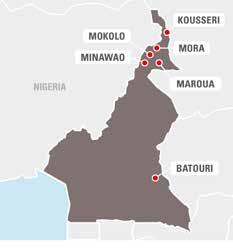
Since 2011, violent attacks by Boko Haram and the counterinsurgency operations of the Nigerian army have forced hundreds of thousands of people from northeast Nigeria to seek refuge in Cameroon, Chad and Niger. During the past two years, violence has increasingly spread from Nigeria into the three neighbouring countries, causing further displacement. By the end of the year, there were around 86,000 refugees and 198,000 internally displaced people in Cameroon.
In response, MSF scaled up its activities in several locations in the north of the country, providing healthcare, including maternal services and nutritional support, in the Minawao camp administered by UNHCR, the UN refugee agency. MSF staff carried out 58,147 consultations during the year.
They also improved water and sanitation, trucking in 3,000 cubic metres of water per week and assisting with the construction of 32 kilometres of pipes to find a permanent solution to the scarcity of water in the camp.
In Mora town, near the Nigerian border, MSF offered specialised nutritional and paediatric care at the hospital and supported two health centres serving displaced people and local residents. The team also ran an ambulance service and started surgical activities in response to a large influx of wounded patients; 246 patients were treated following violent attacks in 2016.
MSF has completely renovated the operating theatre and post-surgical ward at Maroua hospital. Between August and December, the team carried out 737 surgical interventions in the hospital.
In Kousseri, on the Chadian border, MSF supported the surgical ward at the district hospital, performing caesarean sections and emergency interventions. MSF staff also provided nutritional and paediatric care at the hospital and outpatient consultations in three health centres on the outskirts of the city.
In addition, MSF trained Ministry of Health staff in the management of large influxes of wounded patients.
MSF had been running an inpatient therapeutic feeding centre and the paediatrics department at Mokolo hospital, but handed over these activities to the NGO Alima in May.
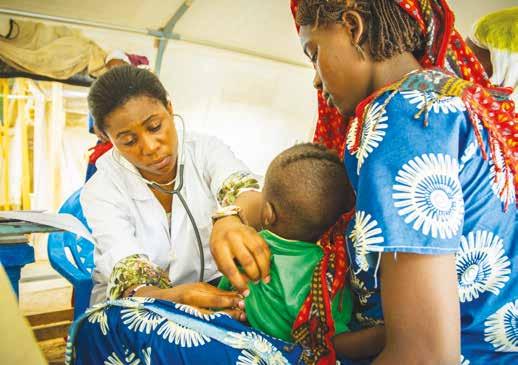
Since 2014, MSF has been supporting the Ministry of Public Health by providing medical, nutritional and psychological support to refugees from the conflict in neighbouring CAR, as well as host communities, in several locations. As the situation stabilised, MSF gradually handed over its activities to other organisations. In June, MSF handed over its last project at the district hospital in Batouri to International Medical Corps. Teams in Batouri had supported the local health authorities in the management of patients with severe complicated malnutrition, the majority of whom were children under the age of five. Since the 90-bed therapeutic feeding centre opened in March 2014, 2,853 children had been treated.
No. staff in 2016: 2,760 | Expenditure: d 60.4 million | Year MSF first worked in the country: 1997 | msf.org/car blogs.msf.org/car | @MSF_WestAfrica
KEY MEDICAL FIGURES:
1,098,100 outpatient consultations
595,700 patients treated for malaria
9,800 patients treated in feeding centres
9,400 surgical interventions
Ongoing political unrest and violence have resulted in a protracted humanitarian crisis in the Central African Republic (CAR). Despite relatively peaceful democratic elections in early 2016, the situation remains extremely concerning.
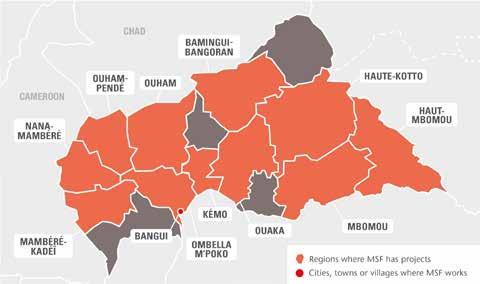
Amid shifting frontlines, thousands of people were killed, wounded or displaced as armed groups fought to take control of territory. Two Médecins Sans Frontières (MSF) workers paid the ultimate price and lost their lives while doing their jobs.
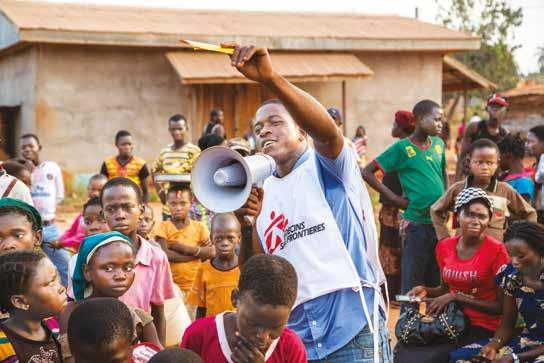
Humanitarian needs are immense: in late 2016, 2.3 million people, or around half of the population, were depending on humanitarian aid to survive. According to the United Nations Office for the Coordination of Humanitarian Affairs (UNOCHA), one in five CAR citizens are still displaced inside or outside national borders.
Limited access to vaccination and sanitation means that easily preventable diseases continue to take a toll. Malaria is endemic and the leading cause of death among children under five years of age. Mental
health needs are also great, with people traumatised by violence and permanent insecurity. The health system is barely functioning, due to a severe shortage of skilled health workers and medical supplies.
This basic lack of access to healthcare has serious repercussions for, among others, people living with HIV (3.7 per cent of the adult population): CAR has one of the lowest antiretroviral coverage rates in the world.
In 2016, humanitarian agencies withdrew from CAR, due to a lack of funding, but MSF is maintaining its presence and teams are running 17 projects across the country.
Bangui
Sporadic fighting and violence in the city resulted in dozens of casualties. MSF continues to focus on emergency services in the general hospital and carried out 3,700 surgical interventions this year. The team also conducted 32,300 consultations in the predominantly Muslim PK5 neighbourhood, treating children under the age of 15 at Mamadou Mbaiki health centre.
In M’poko camp for internally displaced people near the international airport, more than 106,000 consultations were carried out in the MSF field hospital.
MSF scaled up its services for women and babies in Bangui. A team managed the 80-bed Castor maternity hospital, the largest in the country, and assisted around 600 births per month. Other teams supported the Gbaya Dombia maternity in PK5 and rehabilitated a small maternity hospital in the Dameka/Boeing area to cater for the internally displaced people returning to their neighbourhoods. In 2016, MSF assisted over 8,965 births in Bangui, and offered comprehensive care to 5,239 victims of violence and 1,341 victims of sexual violence.
From April to December 2016, MSF provided inpatient care to 941 people with advanced
AIDS in Bangui’s Hôpital Communautaire. However, as the level of quality of care in the hospital did not comply with MSF standards, the project was temporarily closed in December. MSF is exploring other options to resume these activities in 2017.
In the provinces MSF continued to provide comprehensive inpatient and outpatient care to the local community and displaced people in Batangafo and Kabo (Ouham), Boguila, Bossangoa and Paoua (Ouham-Pendé), Carnot (Mambéré-Kadéï) and Ndele (Bamingui-Bangoran). This included basic and specialist healthcare, emergency, maternity and children’s services, community malaria programmes, and diagnosis and treatment for HIV and tuberculosis (TB). Numerous health centres and health posts were also supported through these projects.
In Berbérati (Mambéré-Kadéï), the security situation has stabilised. MSF continued to support the regional hospital as well as four health centres, focusing on care for pregnant women and children under the age of 15. More than 4,200 children were admitted to the hospital in 2016, and over 21,900 paediatric outpatient consultations were carried out in the health centres.
In Bambari, MSF provided primary and secondary healthcare to the host population and around 50,000 displaced people living in the camps. Almost 35,000 consultations
were carried out. From October, MSF also supported the paediatric units and operating theatres in the regional university hospital.
In Bria (Haute-Kotto), MSF provided healthcare, including HIV and TB treatment, to children under the age of 15. When intercommunal violence erupted in November, MSF treated around 140 wounded people in the hospital.
In Zémio (Haut-Mbomou), teams offered basic and specialist healthcare in the hospital, with a focus on HIV care. These services were handed over to the Ministry of Health towards the end of the year. Maternity services should also be handed over by mid-2017.
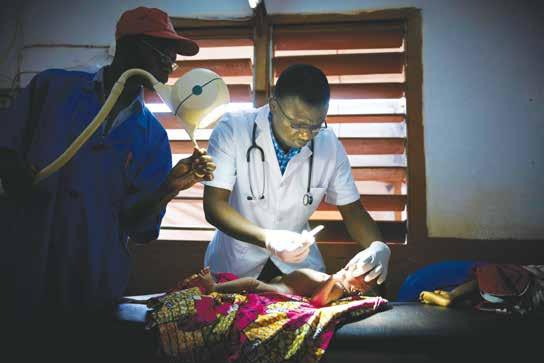
In Bangassou (Mbomou), MSF supports the 118-bed reference hospital, which is currently being expanded, as well as three health centres.
MSF’s emergency response team Equipe d’Urgence RCA (Eureca) responded to several health and nutrition emergencies across the country, and vaccinated more than 12,800 children against measles. The team also provided assistance to 4,000 South Sudanese refugees in Bambouti.
Almost 95,000 children in Berbérati, Bangassou and Paoua received routine immunisations in 2016 during multi-antigen campaigns. These catch-up campaigns will continue in other areas in 2017.
FARAH* –
26, mother and shopkeeper
“ I gave birth at the Gbaya Dombia maternity hospital in the afternoon of 30 October 2016.
The birth went very well, and afterwards I was transferred to a recovery room. I was there with my friends and family when I heard gunfire, and then I heard banging at the gate of the hospital. It was then that the wounded started to arrive. There were a lot of people and they were everywhere. There were wounded in all the beds except mine.
In this neighbourhood [PK5] insecurity is constant. We regularly hear gunshots and every two or three days there’s a fight. People argue and then pull out a weapon. Weapons are everywhere. Even honest, hardworking people carry weapons to protect themselves.”
*Name has been changed.
No. staff in 2016: 571 | Expenditure: d 22.7 million | Year MSF first worked in the country: 1981 | msf.org/chad | @MSF_WestAfrica
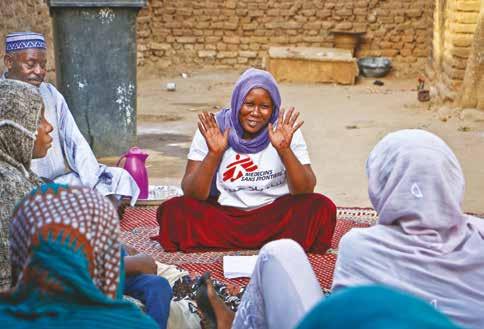
KEY MEDICAL FIGURES:
141,100 outpatient consultations
60,600 patients treated for malaria
21,300 patients treated in feeding centres
2,900 births assisted
In 2016, thousands of people in the Lake Chad region were forced to flee their homes as a result of violent clashes between the armed group Boko Haram and Chadian military forces.
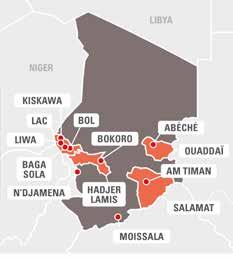
Médecins Sans Frontières (MSF) teams run mobile clinics from their bases in Baga Sola, Bol, Liwa and Kiskawa, providing basic healthcare and mental health support to displaced people and the local population. Most of the medical conditions they treat are linked to the precarious living conditions and poor sanitation. MSF also supports the health centre in Tchoukoutalia and offers mental healthcare to Nigerian refugees in Dar es Salam camp.
In Bol regional hospital, MSF teams collaborate with Ministry of Health staff on sexual and reproductive health, working in the maternity and paediatric wards as well as in the therapeutic feeding centre.
An important focus of the activities is on obstetrics, gynaecology and neonatal care. In 2016, teams assisted 409 deliveries, 81 of which were caesarean sections, and provided nutritional support and paediatric care to over 1,000 children.
In Moissala, Mandoul region, MSF runs a prevention, detection and treatment programme for paediatric malaria that also includes pregnant women. Around 2,300 children were admitted to Moissala hospital‘s malaria unit, while 43,000 children and 7,500 women were treated for malaria in MSF-supported health facilities in the district. Four rounds of seasonal malaria chemoprevention (SMC) were administered in 2016, reaching more than 110,000 children each time. The team also gave catch-up vaccinations to children who had not received their routine jabs. During the malaria peak in the autumn, MSF organised spraying activities to reduce the spread of the disease.
In Am Timan, Salamat region, MSF supports the hospital’s paediatric and maternity wards as well as the laboratory. It also manages the nutrition programme and tuberculosis (TB) and HIV activities. The outreach teams work at three health centres. Over 7,000 Chadians, who were living in Central African Republic but have returned to Chad due to conflict, benefit from these services too.
In September, MSF’s CERU responded to an outbreak of hepatitis E after several cases of jaundice were identified in Am Timan. About 600 national and international staff were recruited to treat patients, provide clean water, distribute hygiene kits and run awareness and active case-finding activities. Many community health workers and chlorinators assisted them.
This year, 2,176 children were treated for severe malnutrition. For the first time, MSF started a malnutrition prevention project targeting nearly 30,000 children under the age of two in and around Bokoro. In the village of Gama, and in 14 other rural locations, mothers were provided with soap, mosquito nets and food supplements to help protect their families.
Despite recent progress at the national policy level, there is still an urgent need for greater efforts, nationally and internationally, to prevent and respond to malnutrition. The recurrent nutrition crisis in Chad requires a sustained emergency response and longer-term structural changes. In 2016, MSF transferred all its activities in Bokoro, Hadjer-Lamis region, to the Ministry of Public Health. These included 15 clinics for malnourished children between the ages of six months and five years, and an inpatient therapeutic feeding centre with an intensive care unit in Bokoro town.
No. staff in 2016: 89 | Expenditure: d 2.0 million | Year MSF first worked in the country: 1985 | msf.org/colombia
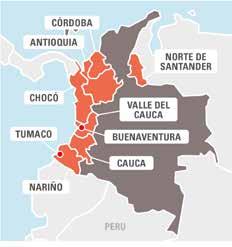
As a result of the peace process, there has been in a decrease in the number of clashes between armed groups, but civilians continue to be caught up in violence as criminal organisations fight for control of territory. The population is exposed to murder, forced displacement, extortion, sexual violence and confinement.
telephone counselling service set up in 2015 for victims of violence, including sexual violence, and people with severe mental health problems. All users of this helpline are offered follow-up consultations.
Regions where MSF intervened in emergencies Cities, towns or villages where MSF works
KEY MEDICAL FIGURES:
12,000 outpatient consultations
11,000 individual mental health consultations
2,800 group mental health sessions
In 2016, MSF teams focused on the urban areas of Tumaco and Buenaventura. They offered psychological support to 3,953 people affected by violence exercised in the context of organised crime, and by armed groups that have emerged in the current post-conflict situation. Teams also provided comprehensive care for 722 victims of sexual violence. In Buenaventura, where access to care is sometimes restricted, staff provided 1,710 consultations through the ‘psychological helpline’, a confidential
In Tumaco, MSF assisted 461 sexual violence cases. This year, in this municipality, teams started activities related to voluntary termination of pregnancy for victims of sexual violence.
MSF continues to coordinate an emergency response team, which intervenes in emergencies and monitors the health and humanitarian situation in areas most affected by armed conflict. During the year, the team conducted 2,012 primary healthcare consultations and 2,677 mental health consultations, mainly for displaced people in the departments of Antioquia, Chocó, Córdoba and Norte de Santander.
No. staff in 2016: 86 | Expenditure: d 3.6 million | Year MSF first worked in the country: 1990 | msf.org/cotedivoire
Regions where MSF has projects Cities, towns or villages where MSF works
KEY MEDICAL FIGURE:
4,300 births assisted
The political and military crises of 20022010 have taken a severe toll on the Ivorian health system. According to the World Health Organization, it is one of the weakest in Africa, with only one medical doctor and five midwives per 10,000 inhabitants. As the maternal mortality rate is very high, the Ministry of Health has made maternal healthcare one of its main priorities, offering care free of charge to all pregnant women. However, budgetary restrictions, drug stockouts and a lack of trained health personnel, among other factors, continue to hamper access to quality medical services for women and young children.
In the Hambol Region, where according to an Epicentre survey in 2015, the mortality rate is estimated at 661 per 100,000 live
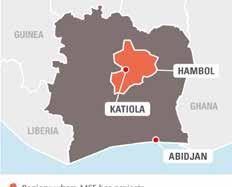
births, MSF runs a project in collaboration with the Ministry of Health. The team aims to improve the management of obstetric and neonatal emergencies in this rural setting by supporting the Katiola referral hospital and three primary health centres in the region. MSF supports these facilities by providing additional personnel and medical supplies, and by facilitating an efficient referral system for complicated deliveries, while implementing a training, coaching and supervision programme for Ministry of Health staff.
In 2016, an average of 350 deliveries were assisted in MSF-supported facilities, 55 newborns were admitted to the neonatal ward and 50 caesarean sections were performed at Katiola hospital each month.
No. staff in 2016: 3,509 | Expenditure: d 109.8 million | Year MSF first worked in the country: 1981 | msf.org/drc | @MSFCongo
KEY MEDICAL FIGURES:
1,960,100 outpatient consultations
1,002,400 patients treated for malaria
137,200 patients admitted to hospital
48,600 patients treated in feeding centres
27,500 individual mental health consultations
5,800 group mental health sessions
5,700 patients received first-line ARV treatment
Médecins Sans Frontières (MSF) teams undertook more than 30 emergency interventions this year, tackling outbreaks of measles, yellow fever, cholera and typhoid fever, and responding to violence and refugee crises.
Poor infrastructure and inadequate health services continue to restrict access to medical care in the Democratic Republic of Congo (DRC). The eastern provinces remain insecure, as the Congolese army and several armed groups fight for control of resourcerich territory.
An outbreak of yellow fever hit all the provinces bordering Angola in 2016. MSF supported the Ministry of Health in a massive emergency response and vaccinated more than a million people in Kinshasa and Matadi city, Kongo Central. In Haut-Uélé province,

eastern DRC, MSF also collaborated with the Ministry of Health to treat more than 84,000 patients during an unusually severe outbreak of malaria. The Pool d’Urgence Congo responded to 26 emergencies relating to cholera, measles, typhoid fever and displaced people, reaching 330,000 people across the country.
North Kivu
In Walikale, Mweso, Masisi and Rutshuru, MSF continued its comprehensive medical programmes, supporting the main reference hospital and peripheral health centres to provide both basic and secondary care to people affected by recurrent violence who would otherwise have little access to medical services. Almost 35,000 children suffering from malnutrition and/or other diseases were admitted to MSF-supported hospitals. Over 270,000 outpatient consultations were provided in the Mweso area alone, nearly half of which were for malaria, and more than 7,500 surgical interventions were performed in Rutshuru hospital.
Between March and June, MSF responded to a nutrition emergency in three health zones in Lubero, treating over 600 severely malnourished children.
MSF continued to support five health facilities in Goma, offering screening and treatment for HIV/AIDS. In 2016, the team provided care for over 2,600 people living with HIV/AIDS. MSF also responded to a cholera outbreak, treating more than 700 patients.
South Kivu
MSF supports two hospitals, several peripheral health centres, and different community points for the decentralised identification and management of malaria and malnutrition in Lulingu and Kalehe, with a particular focus on children and pregnant women. Over 284,000 outpatient consultations were carried out, 10,800 people were admitted to the hospitals, more than 10,700 malnourished children were treated, and more than 10,000 deliveries assisted. MSF also continued to support Shabunda and Matili hospitals.
MSF has seen a huge increase in malaria cases in recent years and the hospital it supports in Baraka is struggling to cope. A 100-bed facility built by MSF was again in full use, and more community-based sites were set up to treat 200,000 children for malaria, pneumonia and diarrhoea. Staff carried out over 450,000 outpatient consultations and admitted more than 17,000 patients to the hospital.
MSF teams continue to support health centres in Lulimba, Misisi and Lubondja. This year they opened further community-based sites and carried out nearly 200,000 outpatient consultations, including 131,322 for patients with malaria. Staff also treated 396 patients for tuberculosis (TB) and 384 patients for HIV.
In early 2016, MSF opened a project to assist victims of sexual violence in Mambasa region, a mining area in Ituri where there have been recurrent attacks by armed groups and bandits. Teams provided care for over 1,100 victims of violence and treated 11,900 patients for sexually transmitted infections in nine MSF-supported health centres.
MSF continued to support Boga and Gety regional hospitals and several health centres, offering treatment for pregnant women and children, and emergency and intensive healthcare. Overall, teams treated 3,300 patients in the emergency room and intensive care unit, and over 280 victims of sexual violence. More than 600 deliveries were assisted in Boga and over 2,200 children were admitted to the paediatric ward in Gety hospital.
MSF teams also responded to outbreaks of cholera and malaria, and offered assistance to displaced people. In Haut-Uélé, more than 84,000 patients were treated for malaria during an outbreak between May and August.
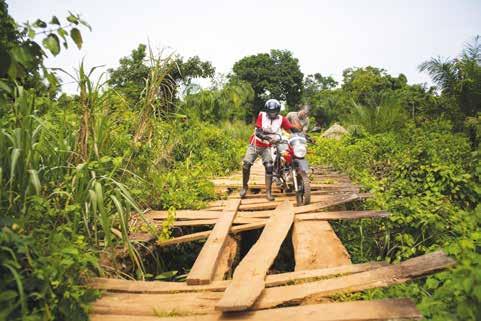
Tanganyika
MSF teams supported two hospitals and several health centres in Manono and Kabalo during a nutrition emergency. By late August, the Kabalo project had closed, but MSF staff continued to work in the paediatric ward in the hospital and several health centres in Manono. More than 6,000 children, suffering mainly from malnutrition and malaria, were admitted to the paediatric unit. At the end of 2016, there was an escalation in intercommunal violence and the team treated over 200 wounded patients in the hospital.
MSF also continued to work to bring cholera under control in four health areas around Kalemie. After donating a 500-cubic-metre water tank to the water authority, the project closed in March. In Nyunzu, MSF responded to a measles outbreak and vaccinated around 90,000 children.
MSF handed over its activities to the health authorities in Shamwana territory at the end of August. For 10 years, MSF had been providing comprehensive healthcare in the hospital, at seven health centres, and at a number of specialised community-based sites for the treatment of malaria. In the last months of the year, 34 women were treated for vesicovaginal fistula.
MSF’s project in Bili and Bossobolo continued to provide care to refugees from Central African Republic and the host communities. More than 80,000 consultations were carried out and 9,300 patients were admitted to MSF-supported hospitals.
Kinshasa
MSF offers comprehensive medical and psychosocial care for people with HIV/AIDS in the capital. Teams support several hospitals and health centres, and have been piloting innovative ways of managing patients, such as patient community groups, and providing three-month supplies of antiretroviral treatment. In 2016, Over 2,500 patients with advanced HIV were admitted to hospital and 68,000 consultations were carried out. Towards the end of the year, MSF supported 10 health facilities to treat 160 patients who were wounded during violent protests against President Kabila. Similar support was given to health facilities in Lubumbashi, where 35 wounded were treated.
On 11 July 2013, four MSF staff were abducted in Kamango, in the east of the Democratic Republic of Congo, where they were carrying out a health assessment. One of them, Chantal, managed to escape in August 2014, but there is still no news of Philippe, Richard and Romy. MSF remains committed and mobilised to obtain their liberation.
ELYSÉE –
18, Ngola (South Kivu)
“ We often have to flee clashes between the armed groups and the regular army. That’s why we can’t tend our fields. When we’re able to return, either the crops have spoiled or they’ve destroyed or burnt them all. Life is difficult in Ngola and it’s tough to find food in the forest. My three children and I received some food only once from an NGO and now my children have been treated at the Makala health centre for free. I thought I was going to lose one of them to malaria. The distribution of soap, blankets, fabric (for the women to carry children, swaddle babies and use as clothing), mosquito nets and farming tools will help us, as we have nothing –we have lost it all. We need everything. Ngola, in Lulingu, is quite isolated. Only MSF was able to distribute the non-food items. They used 30 motorcycles in an operation that took more than a week.”
No. staff in 2016: 1,573 | Expenditure: d 28.8 million | Year MSF first worked in the country: 1984 | msf.org/ethiopia
KEY MEDICAL FIGURES:
438,300 outpatient consultations
6,000 routine vaccinations
4,000 births assisted
Somali region

MSF has been supporting Wardher hospital and other health facilities in Danod and Yucub districts in Doolo zone since 2007, with the aim of reducing illness and mortality in the area. MSF teams provide both inpatient and outpatient services, including primary and reproductive healthcare, and treatment for malnutrition and tuberculosis (TB). Teams work in 10 outreach clinics in remote locations. MSF also donates drugs and medical supplies. In 2016, in partnership with the Regional Health Bureau, MSF treated around 45,000 patients.
MSF started working in Dolo Ado in Liben zone in 1995, focusing on providing medical assistance to Somali refugees fleeing the drought at home, as well as to the vulnerable host community.
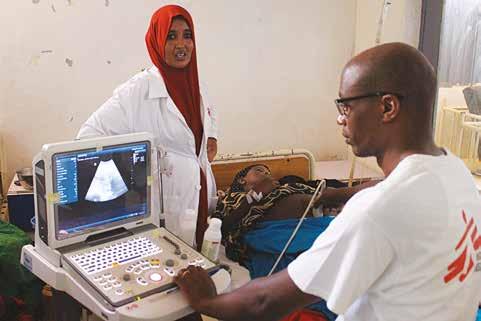
Throughout the year, Dolo Ado reception centre saw 3,075 new arrivals, mostly women and children. The team offers free basic healthcare, nutritional support and routine immunisations. Basic healthcare
is also available at three health posts MSF manages in Buramino and Hiloweyn camps. Another team works in the health centre in Dolo Ado town, which is the referral point for the refugees and the local population. The centre has an emergency room, maternity and paediatric units, an operating theatre and X-ray facilities, and runs nutrition and TB programmes.
By the end of 2016, there were over 203,887 Somali refugees in five camps in Liben zone.
Teams based at the local district hospital of Fik, in central Somali Region, work in the emergency room, operating theatre, maternity ward and stabilisation centre for severely malnourished children. MSF also supports a TB treatment programme and donates drugs and basic medical instruments to the hospital.
In Degehabur, MSF provides maternal health services, including ante- and postnatal care, family planning and treatment for sexual and gender-based violence. MSF also helped to set up inpatient and outpatient departments, the
In Ethiopia, where diseases such as kala azar are endemic, Médecins Sans Frontières (MSF) continues to fill healthcare gaps and respond to emergencies and the needs of the growing refugee population.
emergency room and a stabilisation centre for severely malnourished children with medical complications in Degehabur hospital. Mobile clinics in 14 outreach locations offer basic healthcare to people living in remote areas.
Gambella region hosts more than 340,000 South Sudanese refugees displaced by the civil war that has been ongoing since 2013. In collaboration with the government and UNHCR, the United Nations refugee agency, MSF provides basic and secondary health services in the health centres in Kule and Pugnido camps and Pugnido town, and health posts in Kule and Tierkidi. These services include paediatric care, surgery, nutritional support and HIV/AIDS treatment, and are available for both refugees and the local communities. Another team runs a regular mobile clinic for refugees at the entry point of Pagak. In 2016, MSF offered basic medical assistance to 264,000 refugees and local residents, 31 per cent of whom were children under the age of five. More than 87,000 patients have been treated for malaria in the project locations.
MSF also started assisting Gambella hospital, by donating much-needed supplies and supporting the surgical ward. This is the main referral hospital in the region.
MSF’s main focus in Amhara region is the treatment, diagnosis and prevention of kala azar (visceral leishmaniasis), which is endemic in Ethiopia, especially in the north. MSF provides screening and treatment for kala azar patients co-infected with HIV and/ or TB, and efforts so far have resulted in a significant decrease in transmission and infection rates. The team in Amhara also offers treatment for snakebites and support for emergency referrals.
In addition, MSF set up a surveillance system to forecast possible nutritional emergencies and allow for a timely reaction to them.
In collaboration with the Ethiopian authorities, MSF provides mental healthcare for some 6,200 Eritrean refugees in Shimelba and Hitsats camps in Tigray region. Services include psychosocial and psychiatric support, as well as community education and awareness activities to reduce stigma and ensure that those in need know about the project. In addition, MSF runs a psychiatric care centre and a secondary healthcare facility. In 2016, the team assisted 3,435 refugees through outpatient and inpatient consultations.
MSF responded to the 2015-16 drought by conducting nutrition assessments, in collaboration with local and federal authorities, in two districts in Amhara region, one district in Dire Dawa city, and two districts in Oromia region. Based on the findings of the assessments, two interventions were launched in Oromia region, in Aseko and Babile districts. In Aseko, nearly 4,800 children with moderate acute malnutrition received supplementary ready-to-use food, and 160 children with severe acute malnutrition were referred to therapeutic feeding programmes. In Babile, MSF supported local health teams to screen and treat around 300 malnourished children.
MSF also ran a measles vaccination campaign and offered nutritional support to pastoralist communities in Afar region; Siti zone, Somali region; and Southern Nations, Nationalities and Peoples’ Region.
Since March 2016, MSF has been collaborating with Ethiopian authorities to respond to outbreaks of acute watery diarrhoea in many parts of the country, including the capital Addis Ababa, Oromia region and Somali region. Teams also assisted with training, construction of temporary treatment centres, and water and sanitation.
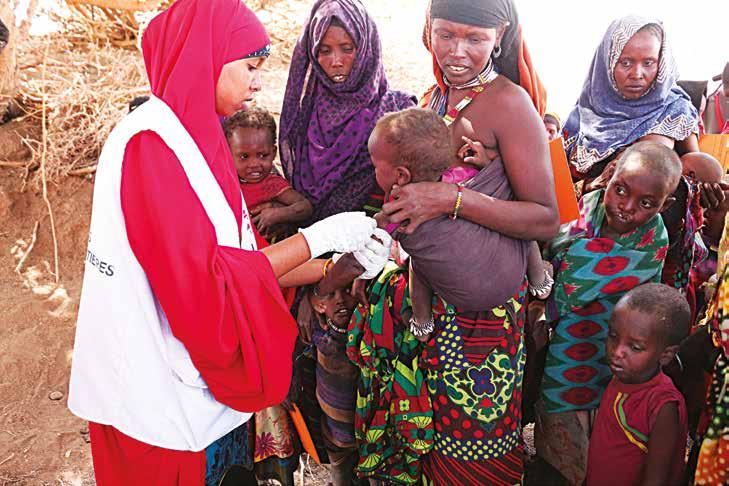
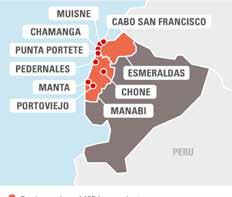
No. staff in 2016: 0.4 | Expenditure: d 0.3 million | Year MSF first worked in the country: 1996
KEY MEDICAL FIGURES:
2,700 relief kits distributed
1,100 group mental health sessions
After the first 7.8 magnitude earthquake struck, four Médecins Sans Frontières (MSF) teams already working in South America travelled to Ecuador and spent a month working in Manabí and Esmeraldas provinces, two of the worst-affected areas, which were later declared disaster zones. After an initial assessment, the teams focused their efforts on providing mental health support and distributing relief items. They conducted psychosocial activities with 3,675 people and distributed 180 hygiene kits, around 200 cooking kits, more than
60 shelter kits comprising mattresses, blankets and plastic sheeting, and 10 water tanks, each with a capacity of 5,000 litres. MSF staff also provided primary healthcare, carrying out a total of 120 consultations.
In Jama, located on the coast of Manabí province, an MSF team distributed shelter, cooking and hygiene kits to 500 families. In total, more than 2,000 people in Jama benefited from MSF’s support. MSF operations in Ecuador finished at the end of May.
No. staff in 2016: 113 | Expenditure: d 2.5 million | Year MSF first worked in the country: 2010 | msf.org/egypt
Cities, towns or villages where MSF works
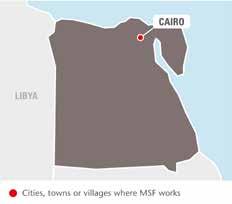
KEY MEDICAL FIGURES:
8,700 individual mental health consultations
2,700 outpatient consultations
The number of migrants arriving in Egypt has risen sharply in recent years due to conflict and instability in Syria, Iraq, Sudan, South Sudan, Eritrea, Somalia, Libya and several other countries. They mainly live in Greater Cairo, Alexandria and Damietta. By the end of 2016, there were 193,375 registered refugees and asylum seekers living in Egypt. Migrants are struggling with poor access to services, limited employment opportunities, difficulties accessing healthcare due to diminishing funding, and delays in processing asylum requests.
Many refugees and migrants were subjected to violence and exploitation in their home countries or during their journey to
Egypt, and have psychological problems and physical disabilities. Médecins Sans Frontières (MSF) has developed individual rehabilitative treatment plans for these patients, consisting of medical and mental health assistance, physiotherapy and social support. In addition to existing patients, MSF treated a total of 1,465 new patients in 2016. Teams conducted 2,655 medical consultations and distributed over 2,300 hygiene kits. MSF continued discussions with the Egyptian Ministry of Health and Population and national medical institutions regarding establishing partnership projects in key public health areas, and offered to contribute technical medical expertise to existing initiatives.
Two earthquakes hit Ecuador in 2016, on 16 April and 18 May, killing an estimated 671 people and injuring another 17,638. Over 33,360 people had to move into shelters after their homes were damaged or destroyed.
Egypt is a key transit and destination country for African and Middle Eastern refugees and migrants, many of whom have been subjected to violence or persecution in their countries.
No. staff in 2016: 29 | Expenditure: d 6.8 million | Year MSF first worked in the country: 1987 | msf.org/france | @MSF_France
In Calais, the number of inhabitants in the ‘Jungle’ – an informal camp for refugees and migrants – increased from 3,000 to nearly 10,000 between September 2015 and September 2016. The lack of sanitation and exposure to the elements there – and in other informal camps in northern France – had significant consequences for people’s health, such as skin diseases and respiratory infections.
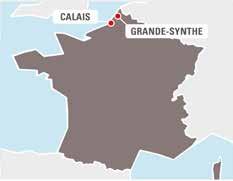
Médecins Sans Frontières (MSF) started working in this area in 2015, filling gaps in services provided by other organisations, and adapting activities as new needs arose. In the Jungle, MSF provided healthcare until March, and water and sanitation until the summer. Teams also ran a centre for unaccompanied refugee minors in collaboration with other organisations and offered psychological support.
In Grande-Synthe, MSF conducted medical and psychological consultations through clinics and, in March, completed the construction of a camp consisting of 370 shelters and sanitation facilities for 1,300 refugees and migrants living in a makeshift settlement. MSF handed over these activities to other organisations in September.
In the second half of 2016, ‘fixed’ settlements and camps were progressively closed by the French authorities. In October, the Jungle was dismantled, and the estimated 6,000 people still living there (including 1,900 unaccompanied minors) were sent to different sites across France. MSF halted its medical and psychological activities, but continued to monitor the situation and provide assistance, either directly or by supporting other organisations.
No. staff in 2016: 20 | Expenditure: d 2.2 million | Year MSF first worked in the country: 1993 | msf.org/georgia
KEY MEDICAL FIGURE:
160 patients started treatment for MDR-TB
Multidrug-resistant tuberculosis is a major public health issue in Georgia: 12 per cent of all new patients, and 39 per cent of those who have previously been treated for TB, have a multidrug-resistant form of the disease. Approximately 10 per cent of MDRTB patients have extensively drug-resistant TB (XDR-TB). Current treatment outcomes for these patients are poor, notably because of the length, complexity and toxicity of existing regimens.
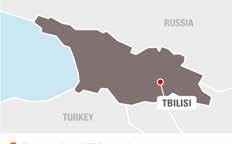
MSF started supporting the Ministry of Health in the roll-out of the new drugs in 2014, and continued within the framework of the endTB programme from 2015. The latter is a partnership between MSF, Partners in Health, and Innovative Research and Development, which aims to find shorter, less toxic and more effective treatments for
drug-resistant TB (DR-TB), through access to new drugs, clinical trials and advocacy at country and global level.
At the end of 2016, an MSF team supported the treatment of 180 patients who had started on regimens including new TB drugs, and was preparing the launch of a clinical trial in Georgia. The trial involves a shorter regimen (nine months instead of two years) based on the two new drugs, which are taken orally.
In Abkhazia, MSF continues to support AMRA, a local NGO created by former MSF staff, that runs a health programme for 35 elderly people, as well as counselling and social activities for 40 DR-TB patients. This year, MSF also arranged the transportation of more than 450 TB sputum samples for drug-sensitivity tests in Tbilisi.
In 2016, over 150 patients in Georgia were receiving bedaquiline or delamanid as part of an improved treatment regimen for multidrug-resistant tuberculosis (MDR-TB) – the highest number supported by Médecins Sans Frontières (MSF) in any country.
Migrants and refugees trying to reach the United Kingdom found themselves stranded in northern France, unable to proceed beyond Calais.Cities, towns or villages where MSF works
No. staff in 2016: 60 | Expenditure: d 25.1 million | Year
KEY MEDICAL FIGURES:
54,200 outpatient consultations
8,100 individual mental health consultations
650 group mental health sessions
detention centre, offering little guarantee of respect for human rights. MSF decided to halt all its activities in Moria, including transport, and hand over its medical services to other organisations. MSF continued to provide medical and mental healthcare in Kara Tepe camp and respond to the needs of the most vulnerable people.
However, the closure of the Balkan route and the EU deal with Turkey in March left migrants and refugees stranded, without access to basic services, adequate shelter or information on their legal status. Médecins Sans Frontières (MSF) shifted its focus from providing lifesaving surgery and medical care to people on the move, to addressing the specific needs of those stuck in unsanitary camps.
Lesbos
After the signing of the EU–Turkey deal, the number of migrants arriving on Greek islands decreased sharply. In 2016, MSF carried out 12,830 basic healthcare consultations across the island, through its mobile clinics and inside Moria and Kara Tepe registration centres. In Matamados, in the north of the island, MSF ran a transit centre for new arrivals and organised buses to transport them to registration centres. After March, the Moria ‘hotspot’ became a pre-removal
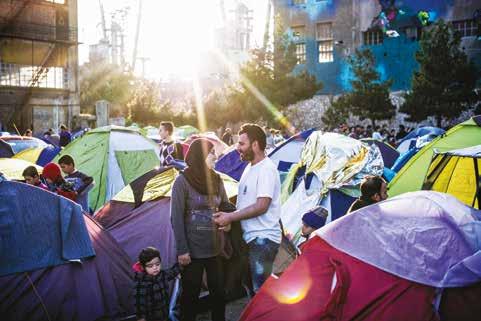
In September, MSF opened a clinic in Mytilene town centre offering sexual and reproductive healthcare, treatment for chronic diseases and mental health support. A team also started outreach activities in Moria to identify specific vulnerabilities and mental health needs.
Samos
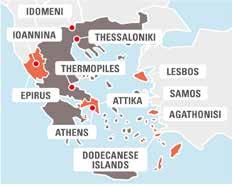
On Samos island, MSF provided basic healthcare for new arrivals at the port, as well as in the prison, at the request of the local police. MSF also deployed a medical land rescue team (MLRT) to give first aid, distribute relief items such as blankets, clothes and tents, and provide transport to people who needed to reach the camps and medical facilities further inland. The MLRT assisted 5,721 people before the activity was stopped in May. Another MLRT operated on Agathonisi island, south of Samos.
Before an official ‘hotspot’ was constructed, MSF provided 18,700 meals in the Samos migrant camp, and distributed 1,470 tents and 2,800 blankets.
Inside the Samos ‘hotspot’, conditions rapidly deteriorated between March and December. It was initially built as a detention centre to hold 280 people. In 2016, the Greek authorities expanded the capacity to 600 places but by the end of the year, the population had grown to over 2,000, and new arrivals had to sleep in tents scattered across cleared patches of forest. MSF provided mental health services through 170 individual consultations and 249 follow-up consultations between March and December.
MSF also operates a shelter for vulnerable people on Samos through a local hotel. Between May and December, the team provided accommodation and primary healthcare to 180 people from 39 families and facilitated referrals to local secondary healthcare facilities.
Between December 2015 and March 2016, MSF launched SAR activities off the island of Lesbos in collaboration with Greenpeace, assisting more than 18,117 people in 361 interventions. Due to the sharp decrease in arrivals, MSF halted these activities in August.
MSF operates three clinics in Athens to respond to the specific needs of migrants and asylum seekers living in formal and
Until March 2016, thousands of people fleeing war and persecution were arriving on Greek islands every day before continuing their journeys across Europe.A refugee couple at Piraeus port, Athens, where more than 5,000 people have set up a makeshift camp. © Guillaume Binet/MYOP
MSF first worked in the country: 1991 | msf.org/greece | @MSFGreece
informal accommodation in the city. The Athens Urban Day Care Centre provides sexual and reproductive healthcare and mental health support, and has an outreach unit that visits migrants where they live. A clinic in Victoria Square offers basic and mental healthcare on a walk-in basis. Between February and December, over 4,055 medical consultations were carried out there. In addition, an MSF psychologist treated 152 patients and conducted 574 individual mental health consultations. In Kypseli, a team of psychologists, doctors, physiotherapists, social workers and cultural mediators works with local partners to offer interdisciplinary rehabilitation to victims of torture and other forms of ill treatment. After the implementation of the EU-Turkey agreement, the monthly average of new cases increased from 10 to almost 40.
MSF offered basic healthcare in Eleonas camp, Korinthos detention centre and Piraeus port, carrying out 6,734 consultations during the year and accompanying 623 patients for specialised medical services. In Elliniko camp, which hosted up to 4,000 refugees in 2016, the team provided sexual and reproductive healthcare and mental health support.
At the height of the emergency, MSF teams distributed 6,600 meals and 9,660 blankets, and provided over 1,680 medical consultations to migrants transferred from the islands to the mainland. Teams worked across the region, offering mental health support to people living in dire conditions in overcrowded camps in Ritsona, Malakasa, Lavrio and Aghio Andreas, and in Thermopiles, where sexual and reproductive healthcare was also provided. Between June and December, teams carried out 573 consultations with 184 patients.
With the increasing restrictions on movement, thousands of people attempting to cross the border between Greece and the Former Yugoslav Republic of Macedonia were stranded in the informal camp at Idomeni in squalid conditions, with little access to services. Between January and June, MSF provided shelter, water, sanitation facilities and medical care through 27,085 consultations. Services included basic healthcare, treatment for chronic diseases, sexual and reproductive healthcare and mental health support.
After the camp was dismantled, thousands of people were transferred to camps around Thessaloniki. Teams offered mental health support in five of the camps, conducting a total of 1,177 individual sessions and 85 group sessions between July and the end of the year.
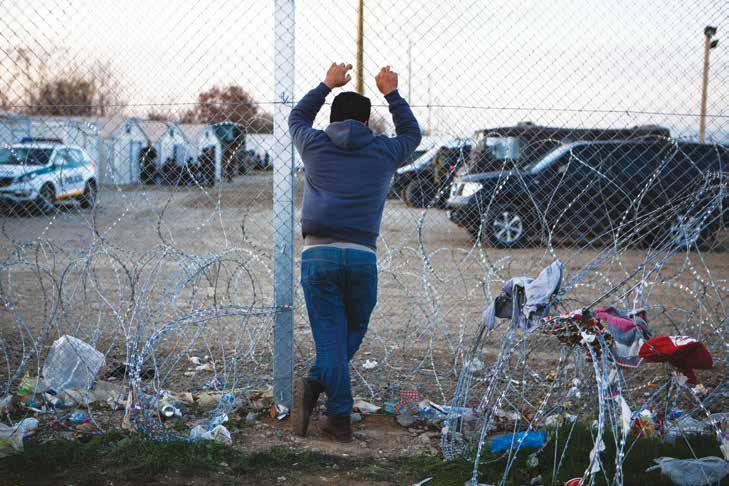
Further west, MSF provided mental health services in Ioannina from April and, until September, ran a mobile clinic offering basic healthcare at three camps in the area. 1,487 consultations were provided, and 249 patients were referred to the public health system for specialised medical care.
MSF continued to support local volunteer groups who distributed relief items such as tents, blankets and clothes to migrants and refugees.
MSF conducted a vaccination campaign in Idomeni camp before it closed. Between July and September, a team also supported a Ministry of Health vaccination campaign against the 10 most common childhood diseases. The campaign reached more than 7,000 children aged between six weeks and 15 years in more than 15 locations across the Greek mainland, Athens, and some of the islands.
No. staff in 2016: 214 | Expenditure: d5.9 million | Year MSF first worked in the country: 1984 | msf.org/guinea
Cities,
KEY MEDICAL FIGURE:
9,400 patients received first-line ARV treatment
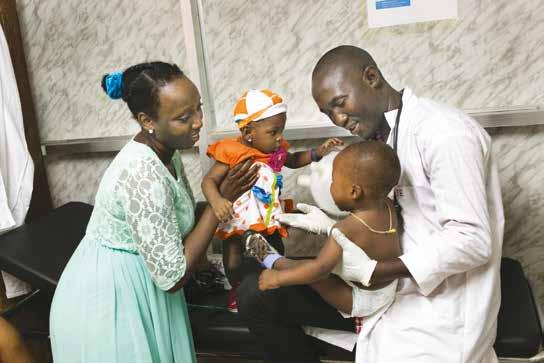
After two years of heavy involvement tackling the deadly Ebola epidemic in Guinea, Médecins Sans Frontières (MSF) closed its last Ebola-related project in 2016.
From January to September, MSF worked in Conakry, Coyah, Dubreka and Forécariah, treating 359 survivors and 282 health professionals for medical complications, primarily eye and neurological problems. These health professionals had been involved in the fight against Ebola but no specialist support was available for them. MSF also treated 354 people indirectly affected by the epidemic such as family members of victims. These activities were both medical and psychological, as many people were suffering from mental health problems such as depression and post-traumatic stress disorder. In addition, over 18,000 people benefited from information sessions designed to reduce the stigma still affecting Ebola survivors.
By September, as survivors were no longer experiencing medical complications, there was no further need for specialised treatment. Meanwhile, the care of patients in need of psychological support was handed over to the Ministry of Health and other organisations such as Postebogui. The closure of the survivor project marked the end of MSF’s direct involvement in medical activities related to Ebola in Guinea, although it is constructing a treatment centre for infectious diseases with outbreak
risks (including Ebola) in Guéckédou to support emergency preparedness.
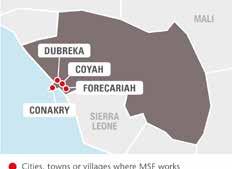
People living with HIV in Guinea have difficulty accessing antiretroviral (ARV) treatment, as supplies are frequently disrupted. While Guinea has a relatively low prevalence of HIV, at around 1.7 per cent, the country has one of the worst treatment coverage rates in the world, with only one in four people living with HIV receiving ARV treatment.
In November, in collaboration with the Ministry of Health, MSF opened a 31-bed centre in Donka hospital to treat people with advanced HIV. Staff had seen the high numbers of people with late-stage HIV at the Matam outpatient centre in Conakry and wanted to address the lack of specialised inpatient care in Guinea. The Donka centre offers free, high-quality care to HIV patients with diseases such as Kaposi’s sarcoma and cryptococcal meningitis that result from low immunity. It also conducts operational research and provides hands-on medical training to improve the overall quality of care. By the end of December, the centre had treated 49 people with advanced HIV, of whom 44 per cent had a CD4 count below 100, an indication that the
immune system is severely compromised and vulnerable to deadly opportunistic infections.
At the end of 2016, MSF was providing medical care for 9,856 people living with HIV, including drugs for opportunistic infections, laboratory tests and psychosocial support. Of these, 4,968 people receive six-month supplies of ARV treatment through a refill strategy called R6M, which was first piloted during the Ebola outbreak to ensure that stable patients remained on treatment. MSF has gradually handed over the provision of ARV treatment for a large patient cohort to the Ministry of Health, and by the end of 2016, was providing first-line ARV treatment to 2,573 patients in Conakry.
Over 94 per cent of the HIV patients in R6M were still under treatment after 24 months, compared to only 61 per cent of those receiving monthly supplies. The national HIV programme has shown interest in a wider roll-out of this model of care.
MSF also provides hands-on training and mentoring for health staff, as well as drugs for opportunistic infections, and socioeconomic support for 9,856 HIV patients in six Ministry of Health centres across Conakry.
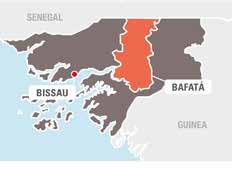
No. staff in 2016: 170 | Expenditure: d 5.3 million | Year MSF first worked in the country: 1998 | msf.org/guinea-bissau
Regions where MSF has projects
Cities, towns or villages where MSF works
KEY MEDICAL FIGURE:
51,000 outpatient consultations
In the central region of Bafatá, Médecins Sans Frontières (MSF) continued working to reduce childhood mortality by managing the regional hospital’s neonatal and paediatric wards, and running a nutrition programme for children under 15 years of age. Teams also supported several health centres in rural areas and trained community health workers to diagnose and treat diarrhoea, malaria and acute respiratory infections, and to detect and refer malnutrition cases. A hospital referral system was also implemented.
To respond to the yearly seasonal increase in malaria cases, MSF doubled the bed capacity of the regional hospital during the months of higher incidence. As an added preventive measure, the team implemented a seasonal malaria chemoprevention strategy for the first time in the country, reaching 25,000 children in Bafatá.
As malaria is one of the most prevalent diseases in the country, many children with fevers are misdiagnosed and summarily treated with antimalarial drugs. To prevent this practice, MSF initiated a study to document the epidemiological profile of the diseases found in Bafatá and create a simple diagnosis tree to allow medical personnel to correctly diagnose a child’s illness and treat it effectively.
In February, MSF started working in the country’s main paediatric hospital in the capital Bissau, managing the intensive care unit (PICU) around the clock. The team worked closely with the Ministry of Health paediatric services to reduce the PICU’s very high child mortality rate, which is mainly due to neonatal sepsis, lower respiratory infections, and malaria.
No. staff in 2016: 39 | Expenditure: d 1.1 million | Year MSF first worked in the country: 1974 | msf.org/honduras
Honduras has experienced years of political, economic and social instability, and has one of the highest rates of violence in the world. This has great medical, psychological and social consequences for the population.
Cities, towns or villages where MSF works
KEY MEDICAL FIGURE:
540 people treated after incidents of sexual violence
This year Médecins Sans Frontières (MSF) continued its servicio prioritario, or priority service, in collaboration with the Honduran Ministry of Health, offering emergency medical and psychological care to victims of violence, including sexual violence. This free, confidential, one-stop service is available at two health centres and in Tegucigalpa’s main hospital.
In 2016, MSF treated over 900 victims of violence, including more than 500 victims of sexual violence, and carried out 1,830 mental health consultations. Medical treatment for rape includes post-exposure prophylaxis to prevent HIV infection and provide protection against other sexually transmitted infections, hepatitis B, and tetanus. Mental healthcare includes counselling, group therapy and psychological first aid.
MSF also carried out activities to improve control of the Aedes mosquito, the insect responsible for the transmission of zika, dengue and chikungunya, in the city of Tegucigalpa. These included a geographical vector analysis, to gather information on the possible areas where greater efforts are needed, and community outreach to inform people about fumigation and other ways of controlling the mosquito.
The emergency contraceptive pill remains banned in Honduras, despite ongoing debate in the Honduran congress to change the policy on emergency contraception. MSF continues to advocate for access to medical care for victims of sexual violence (including emergency contraception) that is in accordance with international protocols. MSF has highlighted the psychological and medical consequences of pregnancy as a result of sexual assault.

Guinea-Bissau is among the poorest and least developed countries in the world. In 2016, continuing political instability further weakened its crumbling health system.
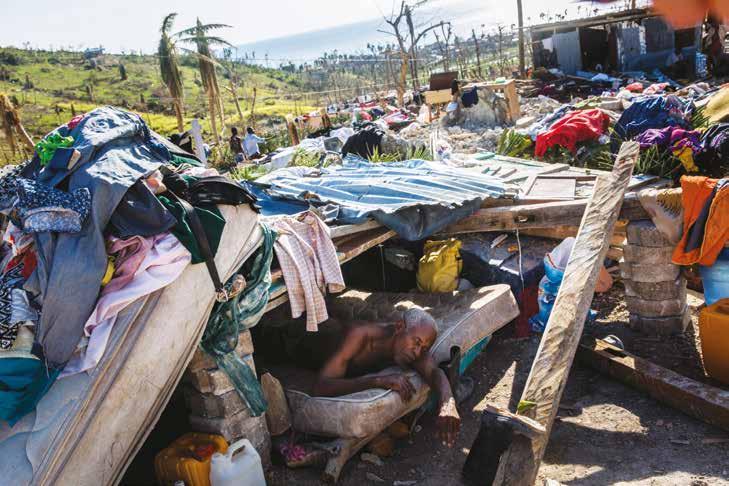
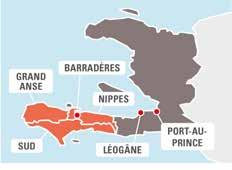
No. staff in 2016: 1,687 | Expenditure: d 41.6 million | Year MSF first worked in the country: 1991 | msf.org/haiti | @MSFHaiti
KEY MEDICAL FIGURES:
14,900 surgical interventions
7,500 individual mental health consultations
5,600 births assisted
There is a shortage of nursing staff and resources in public facilities, and private clinics remain unaffordable for the majority. Haiti’s health system has been further weakened after the damage caused by Hurricane Matthew at the end of 2016. Médecins Sans Frontières (MSF) continues to respond to urgent needs wherever possible, but greater investment is required by the Haitian government and international donors to meet the growing demand.
In May 2015, MSF opened its Pran Men’m clinic in the Delmas 33 district of Port-auPrince to provide emergency medical care to victims of sexual and gender-based violence. By the end of the year, MSF teams had
treated 787 people, including 438 young women and girls under the age of 18. In Haiti, sexual violence is a neglected medical emergency and the number of cases is greatly underestimated in official statistics. MSF is working to improve the availability of services in this field and to raise community awareness, emphasising in particular the need for victims to seek medical care within 72 hours after being assaulted. Awarenessraising methods range from focus groups and text messages to radio spots and conferences, according to the target groups.
In the same district, MSF runs the Centre de Référence des Urgences en Obstétrique (CRUO). Founded in 2011, the 176-bed centre treats pregnant
Health needs are immense in Haiti, and this year, access to medical care, already severely limited for most people, was further hampered by repeated strikes in the island’s public hospitals.Hurricane Matthew caused widespread destruction in October 2016. Here, a man too ill to walk rests in a makeshift shelter on the site of his home in Roche-à-Bâteau, southwestern Haiti.
women with obstetric complications such as pre-eclampsia, eclampsia, obstetric haemorrhage, obstructed labour and uterine rupture. In 2016, the team carried out 19,077 consultations, assisted 5,594 births (2,176 by caesarean section) and admitted 2,498 babies to the neonatal emergency care unit. The CRUO also provides postnatal care, family planning services, prevention of mother-to-child transmission of HIV, and mental health support, and has a special ward for pregnant women suffering from cholera.
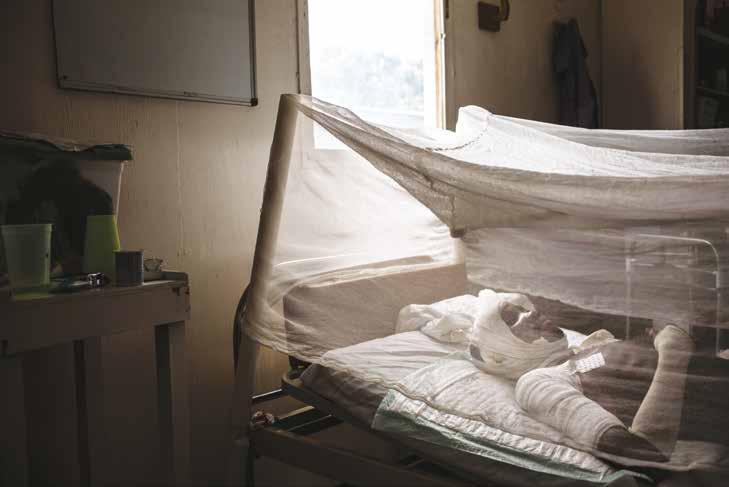
The cholera epidemic remains a major public health concern, seven years after the disease was introduced to the country. In 2016, teams treated a total of 2,615 patients. Many of those were infected in the aftermath of Hurricane Matthew and received treatment from MSF directly in their communities. In addition to building cholera treatment centres, MSF helped hospitals to manage infected patients. Teams are still working at two centres in Delmas – the 55-bed Diquini centre, run jointly with the Ministry of Health, and at MSF’s Figaro centre. MSF continues to monitor the spread of the disease and has rapid response capacity in case of emergency.
The MSF response to Hurricane Matthew was focused on southern Haiti, the worsthit region. Teams supported Port-à-Piment hospital and ran mobile clinics, treating a total of 17,537 patients, including 478 suffering from cholera. They also repaired 26 water points and trucked in more than 10 million litres of clean water. In hard-toreach mountain areas, MSF supplied building materials to 9,500 families and administered vaccines to 14,000 people.
MSF decided to maintain a presence in Port-àPiment, monitoring the health situation there and responding to urgent health needs.
In Drouillard hospital in the capital’s Cité Soleil area, MSF runs a severe burns unit which has become the de facto national referral centre for burns patients. In 2016, 43 per cent of people treated there were under the age of five. A total of 801 patients were admitted to the unit and 630 people underwent major surgery. The teams applied 4,071 wound dressings, and conducted 14,030 physiotherapy sessions and 1,773 mental health consultations. They are working on training staff in public hospitals
in the treatment of burns and improving access to high-quality care for burns patients.
In Tabarre, to the north of the capital, MSF’s Nap Kenbe hospital had to deal with a large increase in the number of patients in the second half of 2016 due to a widespread strike in the country’s public health sector, which deprived a large portion of the population of free medical care. The 121-bed hospital provides surgery and trauma care. This year, 15,228 patients were treated in the emergency room and 8,088 surgical interventions were performed in the hospital’s four operating theatres. Trauma accounts for more than 90 per cent of cases. A rehabilitation unit offers physiotherapy as well as social and mental health support.
The Martissant clinic, now in its tenth year, provides around-the-clock healthcare in a slum area marked by violence. The team stabilises emergency patients before referring them to specialist facilities. In 2016, staff treated 52,344 patients, including 29,891 with accident-related injuries; of these, 6,984 were victims of road accidents and 3,695 victims of violence. The clinic referred 2,650 patients to other hospitals. The strikes within Ministry of Health facilities had a significant impact on the number of referrals this year.
KEY MEDICAL FIGURES:
10,300 outpatient consultations
880 group mental health sessions
630 individual mental health consultations
Italy continues to be the main landing point for migrants and refugees coming to Europe via the central Mediterranean. In 2016, 180,746 people arrived by sea, mainly from subSaharan Africa.
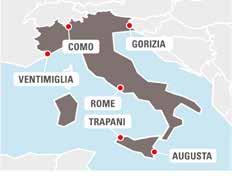
Although there has been a constant flow of arrivals over the past few years, the Italian authorities have not developed an adequate reception system to respond to their specific humanitarian needs. In 2016, Médecins Sans Frontières (MSF) launched a mental healthcare project in 16 reception centres in Sicily’s Trapani province, where a team consisting of cultural mediators and three psychologists screened asylum seekers for psychological vulnerabilities and provided care to those in need. The team assisted a total of 641 patients during 99 group and 626 individual sessions. Many displayed post-traumatic or psychosomatic reactions or symptoms of anxiety and/or depression, as a consequence of past traumas and the precariousness of their current situation.

In addition, with the growing number of deaths at sea, MSF assisted people on disembarkation showing signs of trauma, for example, from being shipwrecked or witnessing deaths at sea, by providing psychological first aid (PFA). Between May and December, 31 PFA operations were conducted in several Italian ports, mainly in Sicily, Calabria and Sardinia.
From the end of 2015 to July 2016, MSF teams provided medical care, shelter and support to hundreds of refugees in Gorizia, on the border with Slovenia. A temporary centre made from 25 converted shipping containers, with a capacity of 96, had been opened there in December 2015, for people who had been sleeping outdoors after being excluded from the official reception system. MSF staff worked in partnership with the local health service and the Red Cross, and distributed relief items such as hygiene kits. In response to the urgent needs of migrants in transit at the borders with France (Ventimiglia) and Switzerland (Como), MSF
teams collaborated with local authorities and volunteer networks to provide basic psychological and medical assistance, as well as food and other essential items.
In April 2016, MSF opened a rehabilitation centre for torture survivors in Rome. Until the end of 2016, 98 patients of 22 nationalities were assisted through a multidisciplinary approach involving medical and psychological care, physiotherapy, and social and legal assistance. The activities are carried out in collaboration with the Italian NGOs Medici Contro la Tortura (Doctors against Torture) and Association for Law Studies on Migration (ASGI).
No. staff in 2016: 18 | Expenditure: d 1.2 million | Year MSF first worked in the country: 1990 | msf.org/iran
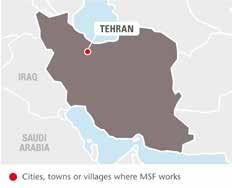
MSF has been offering this service, which includes treatment for HIV, tuberculosis (TB) and hepatitis, since 2012. This year, 15 hepatitis C patients were started on direct-acting antivirals, which are easier to administer than previous recommended treatments, and have shorter course durations and higher cure rates.
KEY MEDICAL FIGURES:
7,100 outpatient consultations
2,800 individual mental health consultations
In the district of Darvazeh Ghar, the provision of care for vulnerable populations is particularly limited. High-risk groups such as drug users, sex workers, and street children need specific approaches, as their living conditions and stigmatisation often prevent them from accessing ‘standard’ health services.
MSF’s primary health centre provides comprehensive and integrated healthcare,
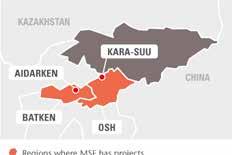
including general medical consultations, mental healthcare, reproductive and sexual health services, testing for HIV, TB, hepatitis C and other infectious diseases, and vaccinations. Psychosocial support is also available, and peer workers play a key role in helping MSF communicate with these hard-to-reach groups. Since April this year, MSF has been running mobile clinics in partnership with local NGO Society for Recovery Support, which is specialised in the field of addiction.
In 2016, the teams in the health centre conducted more than 7,000 outpatient consultations, and referred nearly 1,800 patients to secondary health facilities for further testing and/or admission. The mobile clinic carried out 2,326 consultations.
No. staff in 2016: 88 | Expenditure: d 2.1 million | Year MSF first worked in the country: 2005 | msf.org/kyrgyzstan
KEY MEDICAL FIGURE:
90 patients started treatment for MDR-TB
Kyrgyzstan has an inadequate healthcare system, experiencing frequent shortages, and today, many people struggle to access free treatment for DR-TB. The rates of drug resistance among new TB cases are as high as one third, and in previously treated TB cases, more than half of patients have developed the drug resistant form of the disease. The World Health Organization estimates that there are around 2,400 people with DR-TB in the country.
In the south of the country, Médecins Sans Frontières (MSF) is working in the Kara Suu district of Osh province, providing outpatient care for people with DR-TB, thereby limiting the time they have to spend in hospital. Patients attend monthly medical consultations at one of three TB clinics supported by MSF. These consultations include psychological support, which helps
them adhere to the arduous treatment that can take up to two years. MSF also mentors Ministry of Health staff.
Patients with the more severe forms of the disease are admitted to hospital. In Kara Suu hospital, which has 40 beds for DR-TB patients, MSF supports the Ministry of Health in the diagnosis and treatment of patients. Another team supports the follow-up of patients receiving treatment at Osh TB hospital.
A total of 90 patients were enrolled in MSF’s DR-TB programme in 2016.
In December, MSF also launched activities in Aidarken, in Batken province. A team is developing a programme to treat people affected by diseases which have occurred as a result of mining extraction industries or environmental pollution in the area.
The prevalence of drug-resistant tuberculosis (DR-TB) in Kyrgyzstan, one of the poorest nations in the Central Asian region, remains very high.
No. staff in 2016: 575 | Expenditure: d 12.3 million | Year MSF first worked in the country: 1999 | msf.org/india
KEY MEDICAL FIGURES:
66,500 outpatient consultations
3,500 individual mental health consultations
1,800 patients received first-line ARV treatment
1,300 patients started treatment for TB, of which 490 for MDR-TB
In India, Médecins Sans Frontières (MSF) focuses mainly on mental healthcare, screening and treatment for HIV, tuberculosis (TB) and hepatitis C, and support to victims of sexual and gender-based violence.
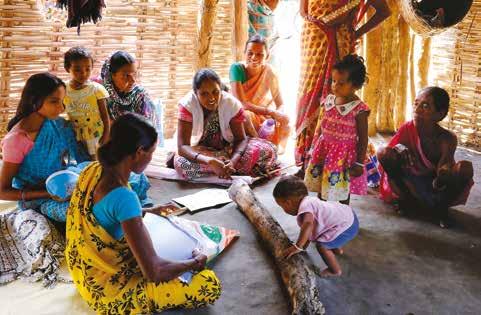
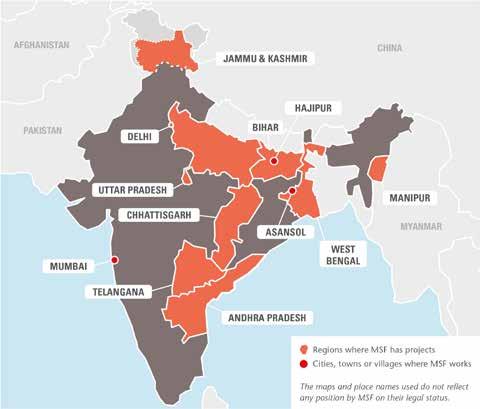
In 2016, MSF continued to fill gaps in India’s health system and provide medical care to people who would otherwise struggle to access it.
Chhattisgarh
In Chhattisgarh, where ongoing low-intensity conflict has left much of the local population with limited or no access to healthcare, MSF runs mobile clinics in remote areas, offering
reproductive healthcare, vaccinations and treatment for TB, malaria and skin diseases.
In 2016, teams conducted 50,057 outpatient consultations, treated 9,094 malaria patients and administered 2,872 vaccinations.
At MSF’s 15-bed mother and child health centre in Bijapur, staff assisted 312 deliveries and carried out 5,419 antenatal consultations in 2016. The centre provides outpatient
services for mothers and children, including TB treatment and vaccinations.
Delhi
Umeed ki Kiran (Ray of Hope), MSF’s community-based clinic in north Delhi, offered medical and psychological care to 98 victims of domestic and sexual violence this year. In addition, 298 counselling sessions were conducted.
MSF’s outreach team also raised awareness about the importance of seeking timely medical and psychological care, and engaged the community in discussions on domestic violence, sexual assault and child abuse.
MSF’s mental health team trained 164 accredited social health activists in identifying signs and symptoms of sexual and gender-based violence.
Since 2001, MSF has provided counselling services to people affected by conflict in Jammu and Kashmir. Following an outbreak of violence in July 2016, the team gave psychological first aid to victims of trauma and donated over two tons of medical supplies.
In May, MSF released the first ever comprehensive survey on the state of mental health across 10 districts in Jammu and
Kashmir. Conducted in collaboration with Kashmir University and the Institute of Mental Health and Neurosciences, the survey found significant symptoms of mental distress in 45 per cent of adults, highlighting the need for comprehensive and decentralised prevention, care and treatment programmes in the Kashmir Valley.
MSF provides screening and treatment for HIV, drug-resistant TB (DR-TB) and hepatitis C at three clinics in Manipur. This year, MSF started 294 patients on antiretroviral treatment, initiated treatment for 122 patients co-infected with hepatitis C, and performed 251 counselling sessions.
Half of all cases of kala azar worldwide are in India, and 80 per cent of these are in Bihar.
MSF handed over its long-running primary kala azar project to the government in 2015 and now, in partnership with the Rajendra Memorial Research Institute of Medical Science in Patna, concentrates on treating kala azar patients co-infected with HIV, a growing health issue affecting the most vulnerable sections of society. MSF treated 79 HIV patients co-infected with kala azar this year.
In April 2016, after more than 1,000 houses were gutted by fire in Bihar’s Darbhanga district, an MSF team distributed relief items, including shelter kits, jerry cans, mosquito nets and kitchen utensils, to 960 people.
The densely populated urban slums of West Bengal are frequently affected by outbreaks of infectious diseases such as malaria, dengue, chikungunya and Japanese encephalitis. Poor
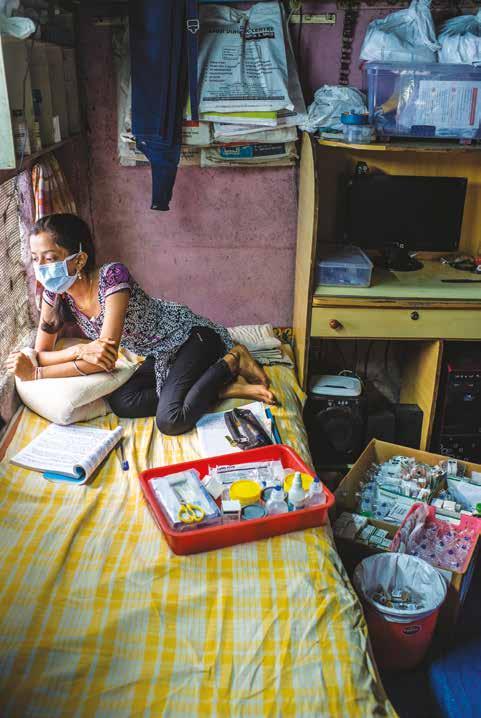
diagnosis and case detection and the lack of referral options for complicated cases have made the migrant and floating populations in these areas very vulnerable.
In late 2015, in collaboration with the government of West Bengal, MSF initiated a project on febrile illnesses in the Asansol district of Burdwan with the aim of improving access to diagnosis and treatment for scrub typhus, typhoid, malaria and leptospirosis, and especially dengue, in both children and adults. This year, teams at Asansol district hospital and surrounding primary health centres screened 101,519 patients, and identified and treated 11,374 cases of acute fever and 1,425 cases of acute undifferentiated fever. MSF also served as a reference laboratory in Asansol for the confirmation of dengue infection. In addition, MSF reported the first cases of scrub typhus in the district after carrying out testing there.
In Mumbai, MSF provides medical and psychosocial care for patients with HIV and DR-TB through four projects. The team is developing patient-centred models of care, and trying to improve India’s treatment guidelines. At MSF’s clinic in the city, many patients have complex drug-resistance patterns, requiring treatments that are not available in the public health system. The team treated 74 DR-TB patients and 134 HIV patients this year.
In collaboration with the Revised National Tuberculosis Control Programme, MSF opened a TB outpatient department at Shatabdi hospital in June. MSF also supports five health posts in the community, providing early case detection, diagnosis and treatment. The team diagnosed 469 cases of TB and 422 of DR-TB between June and December.
MSF has agreed to support the implementation of routine HIV viral load testing and systematic screening of TB signs and symptoms in HIV patients at King Edward Memorial hospital, thereby helping to monitor patients’ adherence to treatment and allowing for timely transfer to second- and third-line treatments if resistance is detected.
A small team of MSF counsellors continues to provide psychosocial support in several TB hospitals in Sewri, south Mumbai.
MSF teams undertook an extensive factfinding mission in northern India to find the most appropriate place to set up a hepatitis C treatment programme. They chose Meerut, a city with a million inhabitants in Uttar Pradesh, and will treat the first patients in January 2017.
No. staff in 2016: 833 | Expenditure: d 42.0 million | Year MSF first worked in the country: 2003 | msf.org/iraq | @MSF_Iraq
KEY MEDICAL FIGURES:
133,000 outpatient consultations
1,300 births assisted
Since 2014, over 3.3 million people have been displaced across the country, and while many have found their way to camps, others are living in schools, mosques and unfinished buildings. Throughout 2016, there was constant movement, with people either fleeing from battle zones or returning to newly retaken areas. Around 190,000 people were displaced from Mosul and the surrounding area in the last three months of the year, and as many as 1.5 million had returned to their place of origin by December. All these people, living in unstable areas, often near frontlines, face ongoing challenges, including insecurity and a lack of access to basic services and healthcare.
Scaling up to meet growing needs
Médecins Sans Frontières (MSF) steadily increased its response during 2016, deploying teams to work across 11 governorates to provide emergency and basic medical care, including maternal care and mental health services, as well as providing essential relief items to displaced families, returnees, impoverished host communities and Syrian refugees.
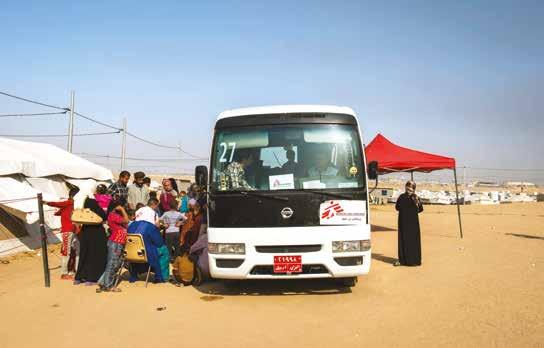
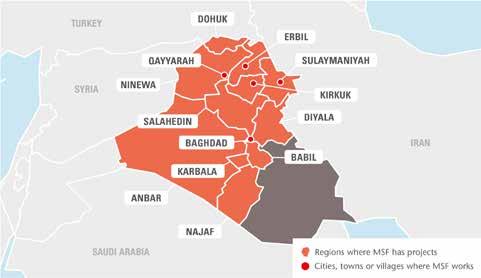
With military operations expanding in northwestern Iraq, thousands of people continued to flock to relatively safer areas, including Salahedin governorate in the centre of the country. As local authorities and international aid organisations were unable to cope with the influx, MSF started to run mobile clinics in the city of Tikrit and the surrounding areas in August. Since the start of the project, 15,339 consultations have been conducted.
In Al Anbar province, MSF opened a secondary healthcare centre in Amriyat
Al Fallujah camp, which hosts around 60,000 Iraqis displaced by conflict in Fallujah and Ramadi.
In October, MSF teams in Kirkuk governorate started to provide healthcare, including psychological and psychosocial support, for displaced people and war-wounded patients from Hawija district. They also ran mobile clinics offering primary healthcare, first aid and emergency referrals to hospitals in Kirkuk city.
Years of armed conflict have disrupted health services in Iraq. Millions of people continue to be affected by fighting and are in need of medical assistance.Internally displaced people seek mental and basic healthcare at MSF’s mobile clinic at Debaga camp, outside Erbil.
In November, MSF mobile teams were deployed to new camps set up west of Erbil to accommodate people fleeing the battle of Mosul. As well as primary healthcare, they provided treatment for chronic diseases, and psychological and psychiatric care.
In Qayyarah, to the south of Mosul, MSF set up a hospital with an emergency room, an operating theatre and a 32-bed inpatient department. During the first month, the hospital treated over 1,000 emergency patients and carried out more than 90 surgical interventions.
Teams also worked in a field surgical unit and advanced medical posts in unstable areas around Mosul, stabilising patients, performing surgery and sending them to referral hospitals when needed.
This year, MSF focused on increasing psychological support for the growing
number of people who have been traumatised by the recurrent violence and their precarious living conditions. Mental health and psychosocial support are an integral part of most of MSF’s projects in Iraq, for both Iraqis and Syrian refugees. In 2016, the mental health teams provided more than 23,000 consultations.
During 2016, MSF continued to run its existing maternity clinic in Domiz camp for Syrian refugees and opened a new one in the village of Tal Maraq, Ninewa, as a significant number of women in this area deliver at home without the help of skilled birth attendants. In the first three months, the team assisted over 400 deliveries. The clinic offers basic emergency obstetric and neonatal care, manages minor obstetric complications, and refers patients with more serious obstetric problems to hospital.
In Sulaymaniyah governorate, MSF supports the emergency hospital, providing hands-on training to improve the quality of medical services in the intensive care unit and the emergency trauma ward. In addition, MSF teams work in the emergency rooms in Kirkuk and Azadi hospitals, focusing on triage and staff training.

The primary healthcare centre in Bzeibiz, a town on the border between Baghdad and Anbar governorate, was closed in November as displaced people from Anbar started to return home and patient numbers decreased. Between February and October 2016, MSF provided around 9,000 medical consultations.
During the second half of the year, the mental health programmes in Babil, Karbala and Najaf were scaled down and suspended as teams explored new approaches to mental health and psychosocial support.
No. staff in 2016: 403 | Expenditure: d 16.2 million | Year MSF first worked in the country: 2006 | msf.org/jordan
KEY MEDICAL FIGURES:
10,400 individual mental health consultations
1,800 surgical interventions
530 group mental health sessions
Jordan has registered over 650,000 Syrian refugees since 2011, according to the UNHCR, the UN refugee agency. Lack of proper legal documentation, financial constraints and border closures mean that their access to healthcare is extremely limited.
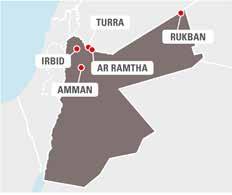
In March 2016, Médecins Sans Frontières (MSF) opened a clinic in Ar Ramtha city to cater for the many refugees and vulnerable Jordanians requiring treatment for noncommunicable diseases (NCDs). The clinic offers medical care, home visits and psychosocial support to 1,500 patients, around 25 per cent of whom are Jordanians, and provided 9,022 consultations this year. In April, MSF introduced psychosocial support in its two-year NCDs project in Irbid governorate. In 2016 alone, over 25,500 consultations, including home visits, were conducted by the two Irbid clinics in this project. A total of 3,643 patients are receiving consultations for NCDs in the context of the programme.
In September, MSF started supporting the comprehensive primary healthcare centre in Turra, Sahel Houran, Ar Ramtha, providing outpatient consultations, maternal healthcare, mental health support and health education for Syrian refugees and vulnerable Jordanians. The team had conducted 3,083 consultations by the end of the year.
More than 75,000 Syrians – 75 per cent of them women and children – are stranded at the northeastern border of Jordan (known as the Berm). From 16 May, MSF operated mobile clinics in Rukban, focusing on children under the age of five and pregnant women. Over 3,500 consultations were carried out in 23 days. After an attack near the Berm on 21 June, access to the border was halted. MSF has since been engaged in active negotiations to regain direct access to the Berm so teams can respond to the urgent medical needs of the people living there.
MSF is the main reproductive healthcare provider for Syrian refugees in Irbid governorate. In 2016, the maternity and neonatology intensive care unit at the hospital extended its capacity for ante- and postnatal consultations. The team assisted 3,663 deliveries, admitted 658 newborn babies to the unit and carried out 14,848 antenatal consultations. MSF also
provides mental health support to children under the age of 18 through the project.
The medical evacuation of war-wounded Syrians to Ar Ramtha hospital was greatly affected by the Jordan government’s decision to close the borders in June. However, MSF continues to work with the health ministry to provide emergency surgical and post-operative care to the limited number of war-wounded patients that are admitted to the hospital. In 2016, MSF treated 369 war-wounded patients and undertook over 1,239 individual counselling sessions. Due to the border closure, fewer patients arrived at the 46-bed post-operative care facility in Zaatari refugee camp. Consequently, MSF was forced to close the facility in December. Prior to its closure, 126 patients were treated and more than 1,283 psychosocial sessions were conducted.
The Amman reconstructive surgery hospital treats war-wounded patients and indirect victims of violence from war-torn neighbouring countries.1 The hospital provides holistic care for patients requiring orthopaedic, reconstructive and maxillofacial surgery, including physiotherapy and mental health support. In 2016, 1,055 surgical procedures were performed, and an average of 180 patients were present in the hospital at any one time.

No. staff in 2016: 403 | Expenditure: d20.7 million | Year MSF first worked in the country: 1976 | msf.org/lebanon | @MSF_Lebanon
KEY MEDICAL FIGURES:
342,200 outpatient consultations
7,300 individual mental health consultations
6,300 births assisted
750 group mental health sessions
This influx of Syrian refugees has further strained the country’s economy and infrastructure, and this is particularly felt in the health sector. The Lebanese Ministry of Public Health is supporting primary and secondary healthcare centres to respond to the needs of Syrian refugees. Despite these efforts, the cost of consultations, laboratory tests, and medication remains a barrier for a significant number of refugees. This reality has prompted MSF to continue providing medical assistance to Syrian refugees and vulnerable communities in Lebanon.
Since the beginning of the conflict in Syria in 2011, Médecins Sans Frontières (MSF) has continued to expand its medical response and provide emergency assistance to Syrian refugees (irrespective of registration status), Lebanese and Lebanese returnees, Palestinian Syrians, and Syrian refugees.
MSF works in the north of Lebanon, the Bekaa valley, south Beirut and Saida, offering free, high-quality primary healthcare, including treatment for acute and chronic diseases, reproductive services, mental health support and health promotion activities. Teams also run three mother and child health centres across the country.
In 2016, MSF carried out around 350,000 outpatient consultations and nearly 7,300 mental health sessions, and assisted nearly 6,300 births, including 2,400 caesareans.
South Beirut
Since September 2013, MSF has been managing a primary healthcare centre and a mother and child health centre in Shatila refugee camp, where over 30,000 refugees are living in deplorable conditions, just four kilometres from the city centre.
In Burj al-Barajneh refugee camp, also located in a southern suburb of Beirut, MSF has opened a health centre providing sexual and reproductive health services, including treatment for sexually transmitted diseases, mental healthcare and health promotion activities. In May, the team launched a home-based care programme for patients with chronic diseases who suffer from mobility problems.
In the Bekaa Valley, where the majority of refugees have settled, MSF provides primary healthcare through four clinics in Hermel, Aarsal, Baalbek and Majdal Anjar for Syrian
refugees and the local community. There are also mother and child health centres in Aarsal and Majdal Anjar.
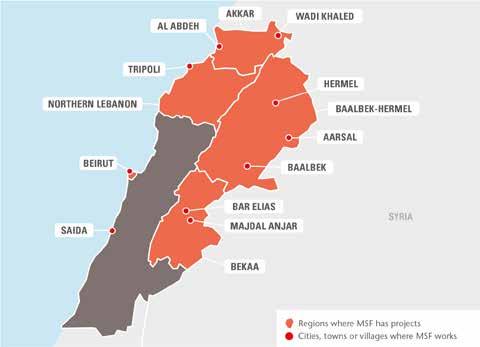
In December, MSF opened a chronic diseases care centre in Bar Elias to improve treatment coverage for the most vulnerable people in the area.
MSF runs five primary healthcare centres in Akkar and Tripoli governorates for Syrian refugees and vulnerable Lebanese, offering treatment for acute and chronic diseases, reproductive healthcare, mental health counselling, vaccinations and health promotion activities.
In February, in response to the growing medical and social needs of the vulnerable Lebanese and Syrian refugee communities living near the border in east Akkar, MSF started to work in Wadi Khaled and Akroum. From February to July, MSF supported the minor trauma unit in Al-Makassed primary health centre in Hiche. In September, the project shifted focus to concentrate on primary healthcare services, particularly the treatment of chronic diseases and mental healthcare in Wadi Khaled and Akroum.
A team continues to offer primary healthcare in Ein-el-Hilweh camp, the largest Palestinian refugee camp in Lebanon. Today there are around 100,000 Palestinians, Palestinian refugees from Syria, and Syrian refugees living there.
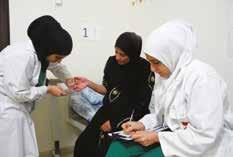
More than 1.5 million Syrians have fled into Lebanon since the conflict began in 2011, making Lebanon and Jordan the countries hosting the largest proportion of refugees in the world.A heavily pregnant Syrian woman at MSF’s mother and child care centre in Majdal Anjar, Bekaa.
No. staff in 2016: 792 | Expenditure: d 24.0 million | Year MSF first worked in the country: 1987 | msf.org/kenya | @MSFNairobi
KEY MEDICAL FIGURES:
298,000 outpatient consultations
17,600 patients received first-line ARV treatment
2,000 patients treated after incidents of sexual violence
790 patients started treatment for TB

330 surgical interventions
The existence of the Dadaab refugee camps in northeastern Kenya, which have sheltered refugees for over 25 years, came under threat in May when the Kenyan government announced they would close them by the end of the year, citing economic, security and environmental concerns. The closure would mean that the camps’ inhabitants would have to return to war-torn Somalia. MSF publicly opposed the decision, and in August carried out a survey in Dagahaley, one of the five camps that make up the complex. The survey showed that 86 per cent of people were unwilling to return to Somalia. In November, the government announced it would extend the deadline for closure until May 2017.
Throughout the year, MSF continued its work in the 100-bed hospital in Dagahaley, and at the two health posts. Teams carried out 162,653 outpatient consultations, and admitted 9,137 patients to the hospital, including 917 children with severe malnutrition. More than 3,000 babies were born in the hospital’s maternity ward.
In January, MSF launched a sexual and reproductive health project in Mrima health facility, in Mombasa. In partnership with the Mombasa County Department of Health, MSF aims to reduce maternal and newborn mortality in the area. In 2016, 1,473 births were assisted and more than 2,000 women attended antenatal consultations.
Teams continued to tackle a cholera outbreak that began in December 2014. By the end
of 2016, a total of 16,511 cases had been reported nationally. MSF responded in 16 counties, supporting local authorities to set up cholera treatment centres, training staff, donating drugs and supplies, conducting health promotion activities and improving water and sanitation. A total of 4,712 cholera patients were treated. In Mandera, the cholera outbreak coincided with a simultaneous outbreak of the mosquito-borne disease chikungunya,
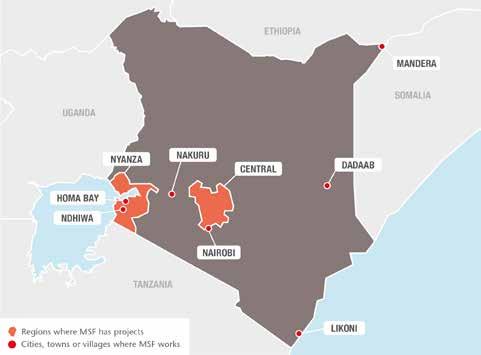
In 2016, Médecins Sans Frontières continued to offer care to refugees and slum dwellers, and to respond to public health challenges such as HIV and access to hospital services.
MSF’s 2016 ‘Don’t Excuse Abuse’ campaign aimed to improve access to information and care for victims of sexual and genderbased violence in Kenya.
placing additional strain on health services. MSF teams treated around 1,150 patients and distributed 2,800 mosquito nets.
In Nakuru, MSF intervened to respond to an epidemic of influenza virus declared by the health authorities, with a reported 12.3 per cent of deaths among patients. MSF confirmed the existence of a peak of Syndrome of Acute Respiratory Infections (SARI) cases, due to several pathogens and not only influenza. High mortality was due to case management issues. MSF intervened at the end of April to support the treatment of 240 patients, and a month later, the rate of patients dying fell to zero.
Nairobi
More than 200,000 people living in Kibera, Nairobi’s largest slum, have access to comprehensive medical care at a clinic run by MSF. This year, 176,415 people received medical treatment from MSF. As well as providing basic and maternal healthcare, the clinic treated 728 patients for HIV, 386 for tuberculosis (TB) and 997 for non-communicable diseases, such as hypertension, asthma and epilepsy. In addition, 11 patients started a new hepatitis C regimen and 114 received care for sexual and gender-based violence.
After more than 20 years in Kibera, MSF is in the process of handing the clinic over to
the Kenyan government and another NGO. In June, the running of the maternity ward, where 200 babies are born every month, was successfully transferred. The handover process is scheduled for completion by the middle of 2017.
Nairobi Eastlands
Since 2008, MSF’s clinic in Nairobi Eastlands has been providing psychological, medical, legal and social assistance to victims of sexual and gender-based violence. From the end of 2015, MSF also worked with authorities to develop an integrated model of care in two primary healthcare facilities in Eastlands. More than 2,700 new patients were treated in 2016, half of whom were minors.
MSF continues to work with local authorities to increase access to emergency care for people living in Mathare slum and Eastleigh neighbourhood. The project includes a call centre, an ambulance referral service, and support to the emergency department of Mama Lucy Kibaki hospital, comprising staff, triage, training and donations of equipment and buffer drugs in case of stockouts. MSF ambulances intervened more than 5,200 times during the year, and over 24,000 people were seen at the hospital’s emergency department.
A team in Eastlands supports the detection and treatment of multidrug-resistant TB (MDR-TB). Eighteen MDR-TB patients were diagnosed, and four were able to initiate regimens containing bedaquiline or delamanid, the first new TB drugs to be developed in 50 years.
HIV care in Homa Bay
HIV remains a major health problem in the Nyanza region. In Ndhiwa, Homa Bay, for
example, one out of four adults are living with the virus while two per cent of the population is infected every year.
The virus also continues to kill. A study carried out by Epicentre and MSF between December 2014 and March 2015, in the adult ward of Homa Bay referral hospital, found that AIDS accounted for more than a third of admissions and 55 per cent of deaths. Worryingly, 50 per cent of AIDS cases were the result of patients failing their treatment and showing new opportunistic infections, despite having started antiretroviral (ARV) treatment.
Since 2014, MSF has been running a programme in Ndhiwa sub-county aimed at controlling the spread of HIV, and reducing the number of deaths from the disease. MSF works jointly with the Ministry of Health and the local communities to strengthen all HIV prevention and care measures in the county, such as voluntary male circumcision, prevention of motherto-child transmission, HIV testing and ARV treatment, and support with adherence and secondary care, including the treatment of opportunistic diseases.
MSF is also involved in the adult medical ward of Homa Bay and Ndhiwa hospitals to improve the quality of care provided for HIV and non-HIV patients. MSF works on general organisation, staff recruitment, training, review of protocols, and quality of clinical and nursing care.
In 2016, more than 3,000 patients were diagnosed and enrolled, and more than 14,300 patients were receiving ARV treatment in Ndhiwa. Around 5,000 people were admitted to the MSF-supported Ndhiwa and Homa Bay hospitals’ adult inpatient wards.
MOHAMED FARAH ABDI –with his seven-year-old disabled son. Mohamed arrived in Dadaab in 1992

“ When we fled, I was still a small boy. I don’t see where I can go back to. I have fled from conflict, and now I have a disabled son who cannot even sit by himself. If I leave here, where will he get care? In Somalia, you will not find the services that we have here. We will not be able to find proper health centres. If you are poor, you need a lot of money to get healthcare. There are no government hospitals to rely on for free medication.”
BROWNKEY ABDULLAHI ABDI –22, was born in Dadaab

“ Living in Dadaab is both good and bad. You cannot leave to go anywhere – it is an open prison. But still, this is the only place I know, and the only place I can call home. It is where I grew up and was educated. I want to stay here because it is peaceful. I do not know what Somalia is.”

No. staff in 2016: 161 | Expenditure: d5.0 million | Year MSF first worked in the country: 1990 | msf.org/liberia | blogs.msf.org/ebola
KEY MEDICAL FIGURE:
1,100 individual mental health consultations
Over 4,800 deaths were reported, including those of 184 healthcare professionals. Although health services are being progressively restored, important gaps persist, notably in under-funded areas such as specialised paediatric care and mental health.
In 2015, the Bardnesville Junction hospital (BJH) was set up in Monrovia, the Liberian capital, and the epicentre of the Ebola outbreak. BJH provided specialised and emergency paediatric care, neonatology services, management of complicated severe malnutrition, onsite training and an Ebola survivor clinic. The clinic offered medical assistance, including mental health. Further attention was given to strict infection prevention and control measures to enable
the continuity of healthcare services in the context of potential Ebola outbreaks.
In September 2016, the Liberian Board of Nursing and Midwifery validated MSF’s hospital as a site for clinical skills training. The first group of nursing students completed their practical training in December.
During 2016, 8,200 emergency consultations were carried out and nearly 4,500 patients were admitted to BJH. MSF’s survivor clinic provided care to approximately 600 patients, and conducted an average of 240 consultations per month. In December, MSF’s patients were transferred to three Ministry of Health centres in Monrovia and the survivor clinic closed.
No. staff in 2016: 29 | Expenditure: d 6.3 million | Year MSF first worked in the country: 2011 | msf.org/libya
The breakdown of law and order, the economic collapse, and the existence of three governments had a severe impact on the healthcare system. Médecins Sans Frontières (MSF) made ad hoc donations of drugs and medical equipment to many hospitals throughout the country to support emergency and surgical care.
Maritime hospital in Zuwara in March, and three polyclinics outside Zuwara in October.
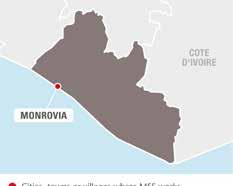
KEY MEDICAL FIGURE: 10,500 outpatient consultations
In Benghazi, MSF ran a clinic with a Libyan NGO to offer paediatric and gynaecology consultations to displaced and vulnerable people. MSF also supported the emergency room in Benghazi medical centre, and Al Abyar and Al-Marj hospitals with staff and training.
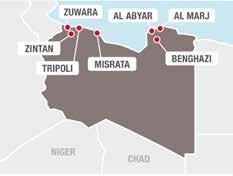
In the west, MSF supported the main Misrata hospital and established a partnership for infection control with an MSF-run hospital in Amman, Jordan. MSF also provided two hospitals in Zintan with supplies and mass-casualty response training. Due to low patient numbers, MSF stopped supporting
In addition to being a destination for hundreds of thousands of refugees, asylum seekers and migrants, Libya is a place of transit for people attempting to cross the Mediterranean and reach Europe. These people are exposed to alarming levels of violence and exploitation.
MSF ran mobile clinics in seven migrant detention centres located in and around Tripoli. Medical complaints were mostly related to appalling conditions inside the dangerously overcrowded detention centres: lice, scabies and flees were rife, and significant numbers of detainees were suffering from nutritional deficiencies and the lack of safe drinking water. MSF carried out 7,145 medical consultations, as well as 49 antenatal consultations for women in detention and 46 consultations for children under the age of five.
The West African Ebola outbreak of 2014–2015 took a severe toll on the Liberian health system, which was already fragile and suffering from inadequate medical infrastructure.
Libya remains fragmented by conflict and fighting continued in several parts of the country in 2016.
No. staff in 2016: 23 | Expenditure: d 0.6 million | Year MSF first worked in the country: 1987 | msf.org/madagascar
In March 2016, Médecins Sans Frontières (MSF) ended its activities in Madagascar, where teams had returned in 2015 to respond to a malnutrition crisis.
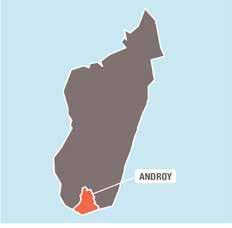
Madagascar’s malnutrition crisis was caused by the bad rains and harvest of 2015. MSF provided treatment for malnutrition in Ambovombe district, Androy region. By March 2016, the intensive therapeutic feeding centre had admitted 273 children and treated 1,165 as outpatients. ‘Nutrition surveillance caravans’ were operated to monitor the nutritional status of the
scattered population in several parts of this largely rural region. In January and February, 10,368 children were screened for malnutrition and more than 8,000 medical consultations were provided. During those two months, 1,559 children were vaccinated against measles and other common deadly diseases, such as pneumonia, diphtheria and tetanus.
No. staff in 2016: 395 | Expenditure: d 5.0 million | Year MSF first worked in the country: 1994 | msf.org/mauritania
Médecins Sans Frontières (MSF) provides medical care to Malian refugees and host communities in Mauritania, and in the last three months of 2016 saw the biggest influx of refugees since 2013.
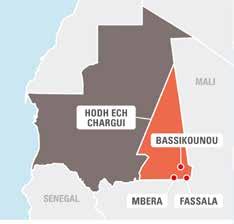
Thousands of Malians are still living in Mbera camp in southeast Mauritania, following the conflict in 2013 which forced them to flee across the border. Despite the peace process, violent attacks by armed groups and bandits have dissuaded them from returning home. The latest arrival at the end of 2016 has put additional pressure on the camp’s infrastructure. According to the UNHCR, the United Nations refugee agency,
46,877 people were living in Mbera camp in December 2016. MSF provided basic and emergency healthcare, as well as gynaecological and obstetric services, for the refugees in the camp and the host communities in nearby Bassikounou and Fassala. In 2016, the majority of the surgical interventions performed by MSF teams were caesarean sections, and visceral and orthopaedic procedures.
Regions where MSF has projects Cities, towns or villages where MSF works
KEY MEDICAL FIGURES:
193,700 outpatient consultations
1,800 births assisted
360 surgical interventions
No. staff in 2016: 372 | Expenditure: d 7.9 million | Year MSF first worked in the country: 1986 | msf.org/malawi
KEY MEDICAL FIGURES:
51,000 patients received first-line ARV treatment
45,800 outpatient consultations
advanced HIV in the district hospital, and healthcare for truck drivers and sex workers.
Malawi’s massive budget deficit has hit the health system hard. In addition, international donors have withheld budget support since 2014 due to corruption scandals. Despite this bleak situation, a national populationbased survey conducted in 2016 confirmed that the country’s ambitious HIV programme had already achieved significant success.
As Malawi moves towards implementing the World Health Organization-endorsed ‘test and start’ guidelines for HIV, the need for sustained funding and adequate human resources is more critical than ever.
In Nsanje district, MSF supports the severely underfunded district management team in running a fully decentralised HIV and tuberculosis (TB) programme that includes infants newly diagnosed with HIV. MSF also supports in providing care for patients with
For 18 years, MSF has been working in partnership with the health ministry to support HIV patients in Chiradzulu. A four-year handover process is underway to ensure high-quality management of stable HIV patients once MSF withdraws from the project. MSF now focuses on hard-to-reach groups, including adolescents with HIV, and patients whose antiretroviral treatment has failed and are in need of second- or thirdline treatment. The team is also improving access to HIV viral load testing in five district health centres and providing screening and preventive treatment for cervical cancer.
In Maula and Chichiri central prisons, where MSF provides HIV, TB and primary healthcare services, 97 per cent of inmates were tested for HIV during the year. Of those who tested positive, 94 per cent were started on treatment and 93 per cent achieved an undetectable viral load. MSF extended similar services to two district prisons where inmates have lower access to healthcare.
MSF continued the development of its transnational ‘corridor project’, which provides healthcare for key populations, including sex workers, truck drivers and men who have sex with men, along commercial routes between Beira in Mozambique and Malawi. A total of 1,930 sex workers have been enrolled in Zalewa, Mwanza, and a new site in Dedza, which opened in 2016.

After a major cholera outbreak on Lake Chilwa in early 2016, MSF launched a mass vaccination campaign, which reached 108,400 people. An innovative two-dose strategy was used for 5,863 hard-to-reach fishermen, with the second dose being selfadministered two weeks after the first.
MSF also concluded a nine-month emergency intervention in Kapise, on the border with Mozambique, where around 10,000 Mozambicans sought refuge from low-level civil conflict in their country in December 2015.
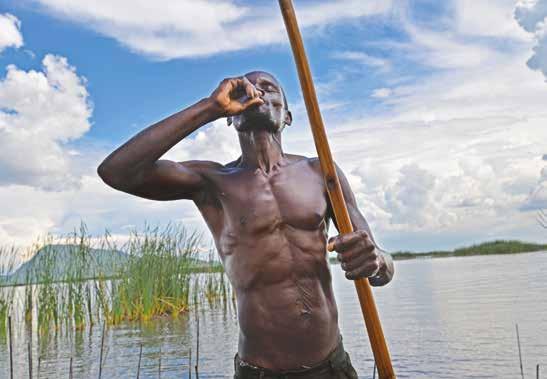
In Malawi, where an estimated 980,000 people are living with HIV, Médecins Sans Frontières (MSF) runs projects to support efforts to combat the virus.A fisherman on Lake Chilwa takes a dose of oral cholera vaccine, provided by MSF in response to an outbreak of the disease in the area in February.
KEY MEDICAL FIGURES:
218,200 outpatient consultations
2,600 births assisted
1,200 surgical interventions
In Ansongo town, Gao region, Médecins Sans Frontières (MSF) supports the 48-bed referral hospital, providing outpatient consultations, inpatient and emergency care, surgery, maternal healthcare, treatment for chronic diseases, nutrition and laboratory services. The team also offers mental health support to victims of violence, and treats victims of sexual gender-based violence. Another team supports the district health centre.
In the rural areas of Ansongo district, MSF arranges referrals from the community to health centres and the hospital. From July to December, when the nomadic community migrated with their cattle far from the health centres, MSF ensured they had access to primary healthcare by training and mentoring community health workers in the diagnosis and treatment of the most
common diseases. In addition, more than 57,145 children received seasonal malaria chemoprophylaxis (SMC) to protect against malaria during the seasonal peak, as well as routine catch-up vaccinations.
In Kidal region, north of Gao, MSF supported two health centres in Kidal town and three more in the periphery. In collaboration with the local authorities, the team also provided SMC for the first time in the region, targeting 16,048 children aged between three months and five years old.
In Timbuktu, as medical staff who had fled the city during the unrest began to return towards the end of the year, MSF initiated a progressive handover of all its activities in the regional referral hospital to the Ministry of Health. MSF has been working in this hospital since 2012.
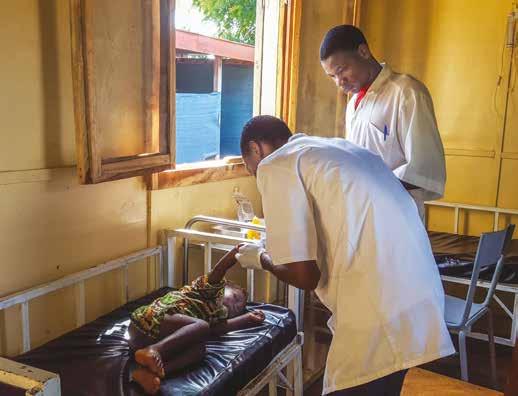
In Koutiala district, southern Mali, MSF continues to run a comprehensive paediatric programme, aimed at reducing illness and mortality among children under the age of five. In 2016, 7,032 children were admitted to the paediatric ward and 3,829 to the
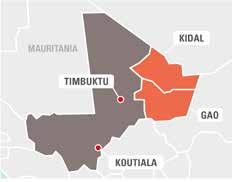
nutrition ward of the MSF-supported regional referral hospital in Koutiala. Teams also supported paediatric and nutrition activities in five health centres across the district, carrying out 90,203 outpatient consultations and treating 3,779 children for malnutrition. In these five health zones, a preventative package of health measures is implemented for all children under the age of two, including routine follow-up consultations, distribution of mosquito nets and supplementary milk-based foods, and vaccinations. This year, 7,723 children benefited from the package.
During the year, MSF started to hand over its SMC activities in Koutiala to the Ministry of Health. An average of 171,000 children received antimalarial drugs in each round.
Access to medical care remains very limited in the north of Mali due to a lack of medical staff and supplies, and clashes between armed groups continue despite a peace agreement.A young girl receives care by medical staff in the paediatric ward of Koutiala district hospital.
No. staff in 2016: 112 | Expenditure: d 3.4 million Year MSF first worked in the country: 1985 | msf.org/mexico | @MSF_Mexico
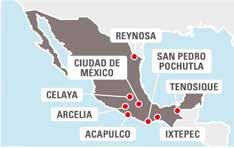
Every year, an estimated 400,000 people flee violence and poverty in El Salvador, Honduras and Guatemala and enter Mexico with the hope of reaching the United States. In Mexican territories, they are systematically exposed to further episodes of violence. This year, more than 15,000 migrants and refugees from Central America were registered in the shelters where MSF works, and 2,700 participated in psychoeducational sessions or psychosocial activities. Over 2,200 medical and 690 mental health consultations were carried out in Ixtepec, Tenosique and Celaya. In the MSF integral care centre in Mexico City, teams provided medical and psychological support to 63 victims of inhumane treatment.
In Acapulco, MSF offered mental healthcare to 480 victims of violence and carried out
over 2,340 mental health consultations in Colonia Jardín.
In Tierra Caliente, Guerrero state, rural health posts were closed due to violence. MSF provided emergency obstetric services, including caesarean sections, in Arcelia hospital and started to run mobile clinics in San Miguel Totolapan and General Heliodoro Castillo municipalities towards the end of the year.
The Chagas project based in San Pedro Pochutla, Oaxaca, was closed in April 2016, and activities were handed over to the Ministry of Health.
Following a confrontation between groups of teachers and state security forces in July, MSF visited the community of Nochixtlan, Oaxaca. The team treated the wounded and
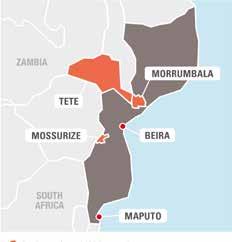
No. staff in 2016: 411 | Expenditure: d 9.0 million Year MSF first worked in the country: 1984 | msf.org/mozambique
Cities, towns or villages where MSF works
KEY MEDICAL FIGURES:
10,300 outpatient consultations
4,200 individual mental health consultations
1,800 group mental health sessions
offered mental health consultations to the families of the deceased and missing.
MSF has been running a project in Reynosa focused on improving emergency care in the general hospital since 2014. In September, MSF handed it over to the Ministry of Health, but has set up a new project providing medical and mental healthcare for victims of violence.
A low-level conflict in the centre of the country has displaced communities along border areas, reducing access to healthcare. General healthcare provision has been affected by a reduced health budget, resulting in shortages of health staff and drug supplies.
In Maputo, MSF provides care for HIV patients who need second- or third-line antiretroviral (ARV) treatment and treatment for co-morbidities such as Kaposi’s sarcoma or viral hepatitis. Comprehensive care is also available for multidrug-resistant tuberculosis (MDR-TB) and extensively drug-resistant TB.
A new viral hepatitis C treatment programme began in 2016, with three patients starting treatment in the national health system.
MSF continues to support the health ministry in Changara and Marara districts in expanding access to HIV and TB care using innovative models based on community participation.
MSF continued to develop models of care for key groups, including sex workers and men who have sex with men. The project covers 180 locations along the commercial ‘corridor’ route linking Beira harbour to the mining area of Tete province. Over 4,000 sex workers have been seen by MSF, and between 33 and 50 per cent of them are still actively followed up.
MSF started two new projects in Morrumbala and Mossurize districts, providing obstetric care in rural areas and improving access to health services for communities affected by conflict.
Regions where MSF has projects Cities, towns or villages where MSF works
KEY MEDICAL FIGURES:
13,000 patients received first-line ARV treatment
1,400 patients received second-line ARV treatment
150 patients started treatment for TB, of which 120 for MDR-TB
Despite ambitious plans to roll out ‘test and start’ to provide immediate treatment to everyone diagnosed with HIV, Mozambique is struggling to respond to an epidemic now affecting 11.5 per cent of adults.
No. staff in 2016: 1,197 | Expenditure: d 19.7 million | Year MSF first worked in the country: 1992 | msf.org/myanmar
Due to a worsening political situation and the inability of MSF to secure access for international staff to work in the region, medical activities in Wa Special Region 2 were limited in 2016. Despite this, in the remote Pang Yang and Lin Haw townships, where access to healthcare is minimal, MSF conducted over 9,000 outpatient consultations through fixed and mobile clinics, and supported Ministry of Health vaccination campaigns.
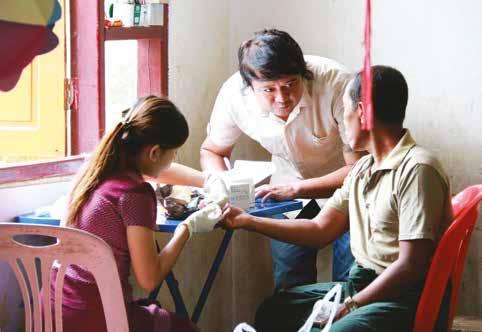
hampering access for staff and patients. In Kachin, MSF continued providing care to 11,020 patients with HIV, TB and MDR-TB. Teams also conducted 68 mental health consultations at a camp for internally displaced people. In Shan, MSF provided treatment to 4,628 patients with HIV and MDR-TB, and a mobile team conducted 900 primary healthcare consultations across the north.
KEY MEDICAL FIGURES:
35,000 patients on first-line ARV treatment
1,800 individual mental health consultations
960 patients started treatment for TB, of which 100 for MDR-TB
Between January and March, MSF supported the Ministry of Health’s catch-up vaccination campaign for 10,951 children under the age of five in Lahe township. Children were immunised against a number of diseases, including polio, diphtheria, tetanus, whooping cough, measles, hepatitis B and haemophilus influenza type B.
In Yangon, MSF provided care to 16,869 patients with HIV, TB or multidrugresistant TB (MDR-TB) at two clinics, and started its first patient on extensively drug-resistant TB treatment, as part of the endTB programme.
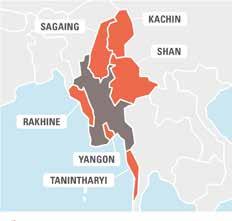
During the second half of 2016, conflicts in Kachin and northern Shan state intensified,
The attacks on border police in northern Rakhine on 9 October prompted a complete lock-down and all humanitarian assistance was suspended, leaving thousands of patients without access to primary healthcare for over two months. MSF conducted just over 2,000 medical consultations during the last quarter of 2016, compared to the roughly 15,000 consultations staff would have expected based on the monthly average. Hospital referrals were also halted, increasing the likelihood of avoidable deaths.
A partial resumption of programmes was allowed in mid-December, albeit in limited areas. Checkpoints hindered access to emergency and specialist care, particularly for the Rohingya, while movement restrictions for international staff prevented MSF from providing support to its teams and raising awareness about the urgent humanitarian needs in the area.
Dawei, Tanintharyi region
MSF remains the main provider of HIV care in Dawei, Tanintharyi region, and treated 2,355 people with the disease in 2016. Teams are targeting high-risk and vulnerable groups, such as sex workers, men who have sex with men and migrant workers, and supporting the National AIDS Programme (NAP) to decentralise treatment. During the year, 742 stable patients were transferred to NAP care. Also this year, the diagnostic capacity of the project was improved with the introduction of a machine to detect HIV viral load in patients.
In addition, MSF treats HIV patients coinfected with diseases such as tuberculosis (TB), cytomegalovirus retinitis and hepatitis C. This year, some hepatitis C patients started a new, more affordable and more effective oral treatment in Dawei and also in Yangon.
Médecins Sans Frontières (MSF) continued to work with the Ministry of Health to provide care for HIV and TB patients, primary healthcare, and vaccinations.
No. staff in 2016: 2,087 | Expenditure: d26.4 million | Year MSF first worked in the country: 1985 | msf.org/niger | @MSF_WestAfrica
KEY MEDICAL FIGURES:
129,400 patients treated for malaria
62,100 patients treated in feeding centres
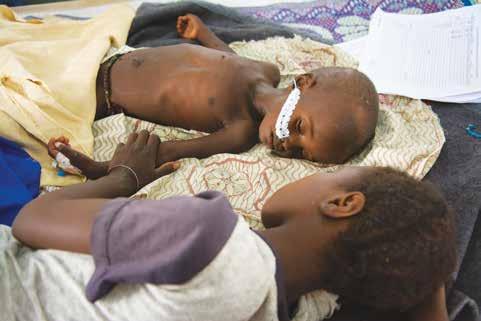
28,300 routine vaccinations
Diffa region
Diffa region, on the border with Nigeria, continued to suffer the consequences of the conflict between Boko Haram and the different armies in the area. According to local authorities, at the end of 2016, there were over 240,000 refugees and internally displaced people in Diffa, as well as 100,000 local residents living in precarious conditions, vulnerable to violence and disease. Many of these people were depending entirely on humanitarian aid to survive, yet the international community’s emergency response was not sufficient to fulfil their basic needs. MSF published a report highlighting this emergency gap to mobilise the international community.
MSF worked closely with the Ministry of Health to provide free basic and reproductive healthcare for the local community and displaced people, and to respond to emergencies. Teams worked
in the main maternal and paediatric health centre in Diffa town, the district hospital in Nguigmi town, and in several health centres throughout the districts of Diffa, Nguigmi and Bosso. After attacks by Boko Haram on 3 June in Bosso, MSF started to run mobile clinics in Diffa town to respond to the needs of the newly displaced. Teams also provided medical and humanitarian assistance at the Gari Wanzam site and in Kintchandi, where tens of thousands of people sought refuge after the attacks.
MSF teams carried out more than 317,000 consultations, assisted over 3,810 deliveries and treated around 24,500 malaria patients in Diffa this year.
Tahoua region
MSF continued to work at Madaoua district hospital, running the inpatient therapeutic feeding centre (ITFC) and the paediatric and neonatal wards. The hospital has a capacity of 350 beds during the ‘hunger gap’, when there is a peak in malnutrition
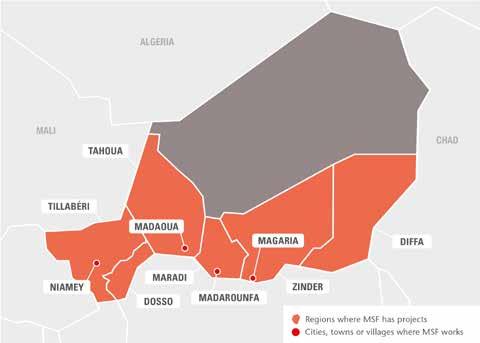
In Niger, Médecins Sans Frontières (MSF) focuses on reducing child mortality, particularly during the annual nutrition and malaria crisis. Teams also provide humanitarian assistance to refugees and displaced people in the south.
and malaria cases. In 2016, MSF also started supporting the hospital’s maternity ward to reduce newborn mortality. In addition, MSF staff worked in several health centres in the district and continued to implement the comprehensive preventive and curative care programme (known by its French acronym PPCSI), which fully monitors all children under the age of two, in Tama.
In Bouza, MSF managed the paediatric ward and the ITFC in the district hospital until the end of April, when the project was handed over to the Ministry of Health.
MSF continued to support the paediatrics unit and the ITFC in Magaria district hospital. Between June and December, the team repeatedly boosted capacity to deal with the increasing number of admissions for malnutrition and malaria, reaching a maximum of 600 beds in the peak weeks. In addition, MSF supported 11 health centres to provide primary healthcare to children under the age of five, and reinforced the hospital referral system for the most severe cases. In the nearby district of Dungass, MSF opened another 200-bed paediatric unit during the peak season. More than 13,300 children suffering from childhood diseases and malaria, to which children under the age of five are very vulnerable, were admitted to hospital in Magaria, and
over 66,500 were treated in rural areas. These figures represent a worrying increase in comparison with previous years.
MSF teams also ran community-based activities to combat malaria, and more than 117,000 children in eight health zones in Magaria district received seasonal malaria chemoprevention – the repeated administration of antimalarials as a prophylactic.
During the peak malnutrition and malaria season, MSF supported the inpatient paediatric unit at the national hospital and an ITFC in Zinder City, and another ITFC in Chare Zamna, with financial aid, staff training and medical supplies. After two years of progressive handover, MSF withdrew from this project in December 2016.
With a population of 500,000, Madarounfa is one the largest districts in Maradi region. MSF continues to run its paediatric programme focusing on the management of the main causes of childhood death, notably malnutrition and malaria, in Madarounfa town and the surrounding area. Mothers also come over the border from Nigeria to seek treatment for their children. The programme, which opened in 2001, today comprises inpatient care for malnutrition and other diseases, and outpatient treatment for
severe malnutrition without complications. This year, the team added neonatal care to activities, and worked to improve community-based treatment of malaria. A total of 12,256 children received outpatient care for severe malnutrition, 3,317 were treated in the ITFC and 5,334 were admitted for other diseases.
Niger experienced another meningitis outbreak this year, although not as serious as that of 2015. According to official figures, 1,409 cases of meningitis C were identified and 94 people died of the disease between March and June.
MSF supported the Ministry of Health to monitor the affected areas, administer vaccinations and provide treatment. To prevent the spread of the epidemic, teams conducted targeted vaccination campaigns with the Ministry of Health in the worst-affected areas, reaching nearly 240,000 people in Tillabéri, Dosso and Tahoua regions.
MSF also supported the Ministry of Health’s response to several measles outbreaks, vaccinating 70,000 people in two areas of Tahoua region, over 66,000 in four areas of Diffa region and 61,000 in Tillabéri region. In addition, staff treated 130 measles patients in Tahoua.
Other emergency teams helped to carry out a preventive vaccination campaign against cholera in several locations in Diffa region and assisted victims of the severe floods that affected around 10,000 people in Abalack, Tahoua.
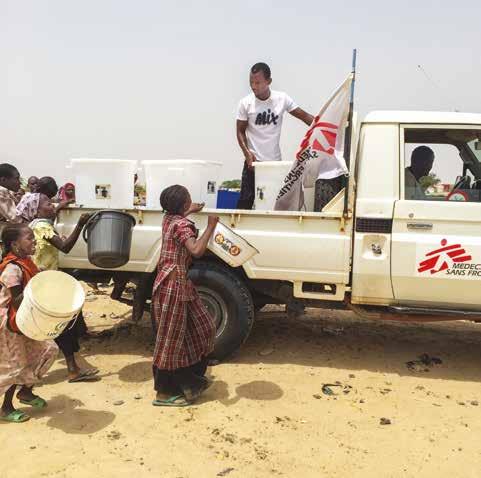
FANTA MELERAM –30, fled northern Nigeria when her village was attacked and found refuge in Diffa region.
“ I took my son to the health centre today because he is malnourished. I have just visited so that he can receive his treatment, a therapeutic food. This health centre is wonderful because when we come with our children or when we are ill ourselves, we are looked after for free. When Boko Haram attacked, we left Malanfatori in a rush and in a total panic. Some of our children succeeded in fleeing with us, but others were left behind and some women lost their husbands during the escape. They pursued us until we succeeded in crossing the Komadougou river to come to Niger. We arrived empty-handed and our husbands are not working. It is difficult to find food and it is very difficult to live in these conditions. Sometimes the state gives us help, and that is a relief.”
No. staff in 2016: 1,080 | Expenditure: d39.3 million | Year MSF first worked in the country: 1996 | msf.org/nigeria | @MSF_WestAfrica
KEY MEDICAL FIGURES:
441,900 outpatient consultations
58,500 patients treated for malaria
13,100 births assisted
2,600 surgical interventions
The conflict between Boko Haram and the Nigerian military, which began in 2009, has displaced an estimated 1.8 million* people across the northeast of the country.
In 2016, the armed conflict resulted in a catastrophic humanitarian emergency in several areas of Borno state, with high mortality rates linked to severe malnutrition and preventable diseases. Although security within Maiduguri, the state capital, improved slightly, allowing for an increase in aid, active conflict, mass displacement and disease outbreaks continued outside the city.
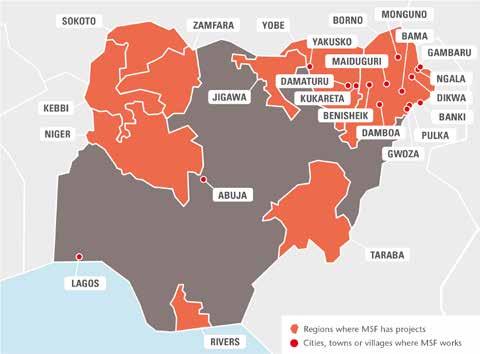
From July, Médecins Sans Frontières (MSF) started scaling up its emergency assistance in the region to reduce the high risk of death and disease among communities living in catastrophic conditions in several areas of Borno state. Insecurity restricted MSF presence significantly, and in some of the hardest-hit villages, teams could only carry out short visits with rapid interventions aiming to have the most impact in a short time frame. This included distributing food, therapeutic nutritional products and relief
items, as well as running mass vaccination campaigns against measles, providing seasonal malaria chemoprophylaxis (SMC), and conducting medical consultations, and water and sanitation activities.
MSF scaled up its activities in camps for displaced people in Maiduguri and 10 nearby towns, running fixed clinics in the capital, Monguno, Damboa, Benisheik, Gwoza and Pulka, and deploying regular mobile clinics to the hard-to-reach towns
of Bama, Dikwa, Banki, Ngala and Gambaru as soon as access was possible. During the year, a total of 20,760 children were admitted to therapeutic feeding centres, 290,222 outpatient and 2,764 emergency consultations were carried out, and 3,071 patients were admitted for treatment. MSF conducted over 56,000 antenatal care consultations and assisted 5,181 deliveries.
In the second half of the year, MSF delivered over 1,099 tons of food to

displaced people and families with malnourished children. Teams vaccinated approximately 130,000 children against measles, 10,052 against pneumococcal pneumonia and provided 18,754 with SMC. To improve hygiene in the camps, MSF set up latrines, water tanks and taps, and provided petrol to power the water pumps.
MSF has provided healthcare to displaced people and host communities in Borno since mid-2014.
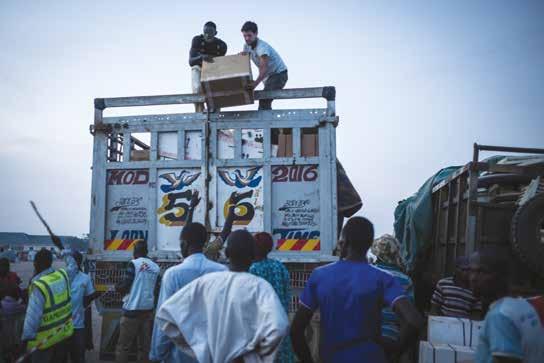
At the health centre in Kukareta village in Yobe state, MSF offered reproductive and obstetric care, routine vaccinations and emergency assistance, and ran a 24-hour observation room. Complicated cases were referred to the hospital in Damaturu, the state capital, where MSF also operates a nutrition programme for children under the age of five. Teams conducted an SMC campaign in Kukareta and five other villages, reaching 3,717 children under the age of five.
In Jakusko LGA, in the western part of the state, MSF responded to an outbreak of measles, treating over 2,500 children and vaccinating 143,800 more between the ages of six months and 15 years. When a nutrition survey carried out at the same time indicated a prevalence of 8.9 per cent for severe acute malnutrition, MSF started working in four therapeutic feeding centres in the area,
referring complicated cases to the MSFsupported stabilisation centre in Jakusko general hospital.
MSF has worked in Zamfara state since 2010, when there was an outbreak of lead poisoning in children. This year, MSF teams worked in five outreach clinics in Abare, Bagega, Dareta, Yargalma and Sumke, providing care for children under the age of five, and in the paediatric inpatient department of Anka general hospital, carrying out a total of 4,303 consultations.
In Kebbe local government area of Sokoto state, MSF supported Kuchi primary healthcare centre in treating pregnant women and children under the age of five. By May, when the project closed due to insecurity, teams had conducted 5,868 outpatient paediatric consultations, including screenings for malnutrition, and admitted 179 children to the inpatient feeding centre. There were also antenatal and maternity consultations and admissions for pregnant women.
Following an outbreak of lead poisoning, MSF initiated an emergency remediation phase, then began screening and treatment activities in August. The safer mining pilot project opened in November and works with miners to reduce exposure to lead and off-site contamination in the communities
following remediation. The team screened 218 people and enrolled 168 for treatment and follow-up. Since the start of the programme, 160 patients have been treated and discharged.
The MSF project in Sokoto continued to support specialised surgical care for patients with noma and other conditions, and involved teams of international specialists. A total of 388 patients underwent surgery, 121 of them for noma.
Following an awareness campaign delivered through schools, health clinics, police stations and the media, monthly attendance at MSF’s programme for victims of sexual and gender-based violence in Port Harcourt, Rivers state increased from 35 to 70. The comprehensive healthcare package includes prophylaxis for sexually transmitted infections including HIV, vaccinations for tetanus and hepatitis B, emergency contraception, counselling, and psychosocial support for victims of rape and sexual abuse.
MSF continued to run its vesico-vaginal fistula and emergency obstetric programme at Jahun general hospital in Jigawa State. This year, 70 per cent of the 10,531 women admitted to the maternity unit had complicated pregnancies and deliveries. The team performed 2,660 obstetrics-related surgical procedures, treated 400 women with fistulas, and assisted 7,365 births. A total of 1,293 babies and 1,141 women were admitted for intensive care. MSF also donated 8,228 units of blood to the hospital. In order to bring antenatal and obstetric care closer to patients and avoid pregnancy complications, basic emergency obstetric services were set up in Aujara and Miga health centres in September.
MSF’s Nigeria Emergency Response Unit operates in the northern states of Sokoto, Kebbi, Zamfara and Niger. In Sokoto, in collaboration with the Ministry of Health and the World Health Organization, the team responded to a meningitis outbreak, treating 203 patients and vaccinating 113,030 people, an administrative coverage of 90 per cent. It also supported a measles intervention and treated 9,983 patients.
*Source: International Organization for Migration’s Displacement Tracking Matrix, 15 December 2016.
No. staff in 2016: 1,649 | Expenditure: d 22.9 million | Year MSF first worked in the country: 1986 | msf.org/pakistan blogs.msf.org/pakistan | @MSF_Pakistan
KEY MEDICAL FIGURES:
296,900 outpatient consultations
25,600 births assisted
16,300 patients treated in feeding centres

9,400 individual mental health consultations
5,500 measles vaccinations in response to an outbreak
2,700 people treated for kala azar
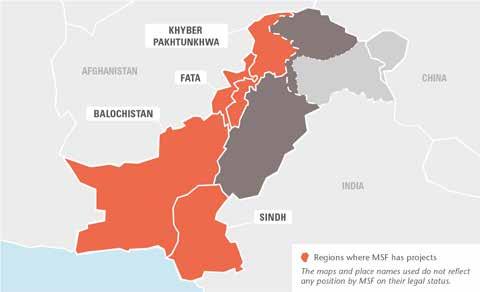
Regions
care. Patients with emergency obstetric complications are referred to Quetta. Psychosocial counselling is also available in the clinic. Until July, MSF offered outpatient paediatric and reproductive health services. In 2016, MSF staff carried out 39,527 outpatient consultations and assisted 4,989 births.
2,200 surgical interventions
Healthcare for women and children is a serious concern: women in rural areas die from preventable complications during pregnancy and delivery, and neonatal care is unavailable in many areas. According to the Pakistan Demographic and Health Survey, one in every 11 children dies before the age of five. Médecins Sans Frontières (MSF) continues to support health authorities in responding to urgent needs.
Mother and child health in Balochistan
MSF runs a 60-bed paediatric hospital in Quetta, with a neonatal unit, an inpatient therapeutic feeding centre for children under five years of age with severe acute malnutrition, and an isolation ward. In 2016, 800 patients were admitted to the hospital and 2,385 malnourished children received treatment. Until April, the hospital also operated a paediatric ward.
In Kuchlak, 20 kilometres north of Quetta, MSF manages a mother and child health centre offering outpatient treatment and nutritional support for children under the age of five and 24-hour emergency obstetric
In Kuchlak and Benazir Bhutto hospital in Mari Abad, MSF treated 2,555 patients for cutaneous leishmaniasis.
Near the Afghan border, MSF works with the Ministry of Health at Chaman district headquarter hospital, providing reproductive, neonatal and paediatric healthcare, and inpatient and outpatient nutritional support for malnourished children under the age of five. These services are available to local residents, Afghan refugees and people who cross the border seeking medical assistance. In 2016, 1,060 patients were admitted to the neonatal and paediatric wards, 4,080
Access to healthcare remains a challenge in Pakistan, especially for people in isolated rural communities, urban slums and areas affected by conflict.
births were assisted, including 248 caesarean sections, and 1,321 malnourished children received treatment. MSF supports the Ministry of Health to run the emergency room for trauma cases and treated 6,971 patients in 2016.
MSF continues to work in the eastern districts of Jaffarabad and Naseerabad, supporting an inpatient therapeutic feeding programme for severely malnourished children, and the general paediatric and neonatal wards in Dera Murad Jamali district headquarters hospital. Teams also run an outpatient therapeutic feeding programme through a network of mobile clinics and outreach sites. In 2016, MSF reopened the mother and child health unit in collaboration with the health authorities; 11,474 children were treated for malnutition, 821 patients were admitted to the neonatal and paediatric wards, and 484 births were assisted.
MSF provides medical care to vulnerable communities in Bajaur, the northernmost tribal agency. At Nawagai civil hospital, teams work in the outpatient department, stabilisation room, and mother and child health unit, and also provide treatment for cutaneous leishmaniasis, endemic in Bajaur. In 2016, 31,069 outpatient and 8,152 emergency consultations were conducted. In addition, MSF supports Khar Agency headquarters hospital in the event of a large influx of casualties.
At Sadda Tehsil headquarters hospital in Kurram Agency, MSF provides outpatient care for children under five years of age, and inpatient care for children under 12 years of age; treatment for cutaneous leishmaniasis; antenatal care and obstetric and emergency referrals; and supports the Ministry of Health in emergencies. In 2016, staff carried out, on average, 3,000 outpatient consultations per month. At the smaller Alizai hospital, they conducted an average of 120 paediatric outpatient consultations each week. MSF temporarily opened a medical point at New Durrani camp in May to assist displaced people.

Pakhtunkhwa
MSF offers comprehensive 24-hour emergency obstetric care at Women’s Hospital in Peshawar for patients referred from surrounding districts and FATA. The hospital has 24 obstetric beds and an
18-bed neonatal unit for specialised care for premature and severely ill newborns. In January, the new outreach team started working to improve links between patients, the hospital and the community. In 2016, 4,906 deliveries were assisted, including 479 caesarean sections.
In Timurgara, around 200 kilometres north of Peshawar, MSF supports the district headquarters hospital’s emergency, resuscitation and observation rooms, as well as the neonatal unit. Teams provide comprehensive emergency obstetric care, including surgery, and assisted 9,627 births in 2016. The ‘cardiac corner unit’ treated 2,667 patients with acute coronary syndrome, and the mental health team carried out 3,987 consultations. Staff also ran community health awarenessraising activities and conducted a total of 7,713 sessions. In December, MSF added a new digital X-ray facility to its services.
In Karachi’s Machar Colony slum, MSF provided 107,397 outpatient consultations at the clinic run in collaboration with SINA Health Education & Welfare Trust. Machar Colony is densely populated, with around 200,000 people living in polluted, unsanitary conditions. The programme includes primary healthcare, basic emergency treatment, obstetric care and mental health support, as well as educational sessions on hygiene and health. In addition, MSF provides
diagnosis and high-quality treatment for hepatitis C, which is highly prevalent in this area. In 2016, 412 patients were started on treatment for the disease and 301 completed the course.
Emergency response
In April, heavy rains led to flooding in KPK. Together with the Provincial Disaster Management Authority, MSF distributed 1,659 emergency kits to affected people in Swat, Kohistan and Shangla.
MSF ran a dengue prevention campaign in Timurgara, Balambat, and a camp for Afghan refugees, reaching 4,219 households. During the summer, a team set up 10 heatstroke prevention points across Machar Colony providing drinking water and first aid. A total of 23,000 people benefited from the activity.
No. staff in 2016: 125 | Expenditure: d 6.0 million | Year MSF first worked in the country: 1989 | msf.org/palestine
KEY MEDICAL FIGURES:
5,100 individual mental health consultations
400 surgical interventions
350 group mental health sessions
In 2016, MSF continued its long-running mental health programmes on the West Bank and support to victims of burns and trauma in the Gaza Strip.
There was an upsurge in violence in the West Bank at the beginning of the year, and although the situation had calmed by the end of March, the H2 area of Hebron city, which is highly militarised, experienced frequent confrontations. MSF’s patients have been exposed to various critical events, such as witnessing violence, raids on their homes, arrests and deaths of family members, and consequently, they have developed anxiety, stress and sleeping problems.
MSF runs mental health programmes in Hebron, Nablus, Qalqilya, Bethlehem
and Ramallah governorates, offering psychological and social support to victims of political violence. In 2016, 4,141 new patients benefited from individual and group mental health sessions, over 70 per cent of which were in Hebron. The team marked 20 years of working in Hebron with a series of public events to highlight the importance of mental health services in Palestine, including multimedia activities, plays, and presentations of personal stories by patients.
In addition to medical care, the team provided training for medical staff, teachers and counsellors. In April, MSF opened an innovative emergency response project covering Bethlehem and Ramallah governorates, focusing on offering psychological first aid and psychoeducational support.
In 2016, MSF started a partnership with An-Najah University in Nablus to launch the first Master’s degree in clinical psychology in Palestine. MSF staff also supported the burns unit of Rafidya hospital in Nablus, where they focused on moderate to severe cases through a multidisciplinary approach (psychological, medical and social).

MSF´s burns and trauma centres in the Gaza Strip treated over 4,231 patients, mostly children. Staff dressed more than 52,000 wounds, and conducted over 36,000 physiotherapy and 1,000 occupational therapy sessions. The majority of patients had burns, usually the result of domestic accidents in conflict-damaged homes. There are three centres, in Gaza City, Khan Younis and Bet Lahyia, the last of which opened in July. In 2016, MSF’s burns awareness campaign reached more than 35,500 children in schools, kindergartens and nurseries.
The surgical programmes that MSF runs in Al Shifa and Nasser hospitals in conjunction with the health ministry performed a total of 275 surgical interventions, 71 per cent of them on children under 16 years of age.
Complex cases that cannot be handled in Gaza are referred to MSF’s reconstructive surgery hospital in Jordan. However, due to administrative delays, only nine out of 77 patients were successfully referred in 2016.
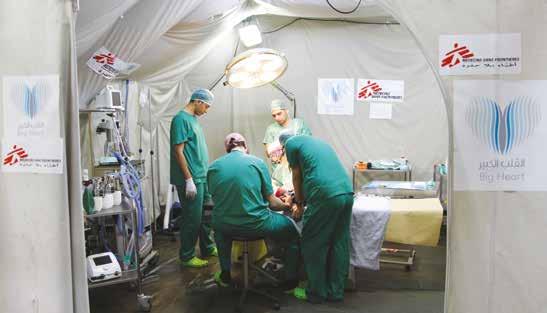
No. staff in 2016: 116 | Expenditure: d 4.3 million | Year MSF first worked in the country: 1992 | msf.org/png
Around 25 per cent of people with TB in Papua New Guinea live in Port Moresby, in the National Capital District.
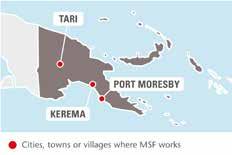
In collaboration with the national TB programme, the MSF team has been scaling up the capacities for screening, diagnosis, treatment initiation and follow-up in Port Moresby’s Gerehu hospital. Mobile teams started working in the community to improve patient adherence to treatment.
In Gulf province, MSF expanded its TB programme to support two health centres as well as Kerema general hospital. Currently, poor access to remote areas and the lack of an effective follow-up system result in a high number of patients not completing their treatment. In collaboration with the provincial authorities, MSF continues to develop a decentralised model of care
so that people do not need to come to a medical facility so frequently. By the end of 2016, MSF had initiated treatment for 1,819 patients with drug-sensitive TB and 24 with drug-resistant TB.
In March, MSF launched the report ‘Return to Abuser’, which exposes gaps in services and systems that keep women and girls trapped in cycles of severe domestic and sexual violence. This year at Tari hospital, the team handed over its final project treating victims of sexual and domestic violence. While incidents of all types of violence remain high in Tari and the Highlands region, the provincial health authorities are now leading the response to meet the medical and psychological needs of victims, and facilitating access to vital services.
No. staff in 2016: 12 | Expenditure: d1.3 million | Year MSF first worked in the country: 1987 | msf.org/philippines | blogs.msf.org/philippines

Cities, towns or villages where MSF works
KEY MEDICAL FIGURE:
13,400 outpatient consultations
An MSF assessment conducted in 2015 confirmed the need for sexual and reproductive health services in the densely populated and impoverished Tondo area of the capital, Manila. This year, in response to that need, MSF launched a programme, which is run in collaboration with Likhaan, a national organisation. The MSF team supported the local clinic’s family planning services, carrying out an average of 1,000 consultations each month, and improved screening, diagnosis and treatment for sexually transmitted infections. In October, the clinic also started to provide screening for cervical cancer and cryotherapy. In November, 89 patients were screened. Of these, six tested positive,
five underwent cryotherapy and one was referred. As a prevention measure, there were plans this year to begin a vaccination campaign against human papillomavirus, reaching 24,000 girls aged between nine and 13. However, delays in importing the vaccines meant that the first round of vaccination had to be postponed to February 2017.
Médecins Sans Frontières (MSF) is working to improve access to screening and treatment for tuberculosis (TB) in Papua New Guinea.
No. staff in 2016: 129 | Expenditure: d 4.9 million | Year MSF first worked in the country: 1992 | msf.org/russianfederation
KEY MEDICAL FIGURE:
4,800 individual mental health consultations
Médecins Sans Frontières (MSF) continued to run tuberculosis (TB), mental health and cardiac care programmes in Chechnya.
For many years, MSF has been working closely with the Chechen Ministry of Health to implement a TB treatment programme.
After handing over the management of multidrug-resistant TB (MDR-TB) treatment to the ministry, MSF focused on extensively drug-resistant TB (XDR-TB), a type of TB that is resistant to second-line drugs. MSF procured appropriate medicines, including new and repurposed drugs, to provide regimens that are more effective than the conventional treatment for patients with XDR-TB. The TB programme also includes laboratory support, health promotion and psychosocial assistance for patients and their families.
In 2016, MSF continued to care for TB patients with diabetes co-morbidity, regularly monitoring their blood sugar and adjusting their treatment as required, and helping them to manage their condition. A total of 60 patients with diabetes and TB, and 79 patients with diabetes and XDR-TB, were under treatment in December 2016.
In 2016, teams provided individual psychosocial care for 4,838 patients and
No. staff in 2016: 3 | Expenditure: d 0.3 million | Year MSF first worked in the country: 2004
314 group counselling sessions for victims of violence in the mental health programme.
Cardiac care in Chechnya
MSF continued to support cardiac care in the emergency hospital in the capital, Grozny, and in Urus-Martan hospital, by supplying drugs and medical equipment and improving the quality of care for acute patients. A masterclass was organised with specialists from the Medical University of Dusseldorf to enhance the technical skills of the Grozny interventional cardiology team. The focus was on angiography (an imaging technique to examine the inside of coronary arteries) and angioplasty (a procedure to widen narrowed or obstructed coronary arteries).
In 2016, the cardiac resuscitation unit admitted 1,327 acute patients, 413 of whom benefited from an angiography, and 397 from an angioplasty.
Since September 2016, Médecins Sans Frontières (MSF) has been responding to the gap in mental healthcare for asylum seekers in Götene municipality.

Cities, towns or villages where MSF works
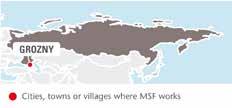
KEY MEDICAL FIGURE:
1,100 group mental health sessions
This includes families, single men and unaccompanied minors from a variety of countries. MSF uses a holistic model of mental healthcare and psychosocial support, which involves the screening and detection of mental health conditions and referral to the Swedish healthcare system where appropriate. The model includes individual and group counselling sessions; psychoeducation to help prevent worsening of symptoms, build resilience and promote empowerment; psychological first aid; and the use of cultural mediators to ensure good communication. The project also links asylum seekers with community-based civil society networks that offer social activities and provide for their non-medical needs.
Through this project, MSF aims both to ensure that services are tailored to patients’ individual needs, and to show that early intervention can improve asylum seekers’ mental health. MSF also wants to build on the success of this project to advocate for the improvement of mental health services for asylum seekers across the country.
In 2016, the MSF team in Götene screened 122 asylum seekers for mental health conditions. Of these, 32 per cent benefited from individual counselling and 19 per cent were referred to local services. In total, 466 asylum seekers received psychoeducation, cultural briefings and other health information from MSF, and 367 received psychological first aid.
In 2016, over 300,000 people fleeing wars, persecution, poverty and insecurity attempted to cross the Mediterranean in search of safety and refuge, according to UNHCR, the UN refugee agency.
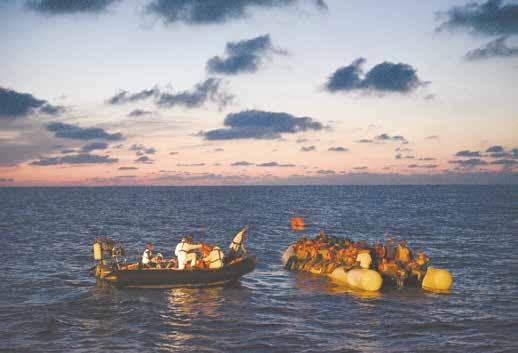
Central Mediterranean
2016 was the deadliest on record: 4,581 men, women and children died attempting to cross from North Africa to Europe. Of the 181,436 people who arrived safely in Italy after being rescued at sea, the vast majority had embarked in Libya. None would have made it to safety without rescue.
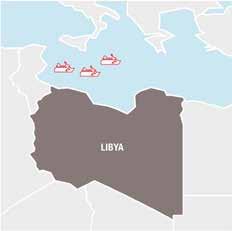
During the year, Médecins Sans Frontières (MSF) teams were on board three specially equipped search and rescue boats: the Dignity I , a 50-metre vessel with the capacity to take 400 people on board, and a crew of 19 MSF staff; the Bourbon Argos , a 68.8-metre vessel with the capacity for 700 people, and a crew of 11 MSF and 15 non-MSF staff; and the MS Aquarius , a 77-metre vessel run in partnership with SOS Méditerranée, with the capacity for 500 people. All three boats actively searched for boats in distress in international waters north of Libya.
Between late April, when the first boat, Dignity I , was launched, and the end of the year, teams rescued 21,603 refugees, asylum seekers and migrants, and assisted 8,969 more in over 200 operations.
Medical teams onboard treated violencerelated injuries linked to detention, torture and other ill-treatment, including sexual violence, that people experienced in Libya. Medics treated skin diseases, dehydration, hypothermia, scabies and serious injuries like chemical burns caused by fuel mixing with sea water in the boats. Pregnant women were cared for by midwives onboard and several babies were born safely at sea. Lifesaving emergency care was also provided in emergency rooms on the boats or through medical evacuations, when needed.
People continued to try to cross the Mediterranean even as winter approached. From October onwards, MSF in collaboration with SOS Méditerranée, ran the only NGO boat continuously carrying out search and rescue in this stretch of sea.
Despite harsh weather conditions, in the first three months of 2016, 151,452 people made the eastern crossing from Turkey to the Greek islands, the largest number landing on Lesbos. During the same period, 366 men, women and children lost their lives in the Aegean Sea.
MSF provided assistance to boats in distress off the coast of Lesbos until June, when the drop in arrivals meant that the team’s presence was no longer required. Between December 2015 and March 2016, the MSFGreenpeace rescue operation assisted more than 18,117 people in 361 interventions.
MSF medical teams also treated people on disembarkation and referred 30 individuals to hospital for further assistance, mainly for trauma-related injuries.
No. staff in 2016: 224 | Expenditure: d7.6 million | Year MSF first worked in the country: 1999 | msf.org/southafrica | @MSF_SouthAfrica
KEY MEDICAL FIGURES:
12,700 patients on first-line ARV treatment
680 patients started treatment for TB, of which 210 for MDR-TB
290 patients treated after incidents of sexual violence
meeting 90-90-90 treatment targets nationally. In 2016, 56,029 individuals were tested, 2,370 male circumcisions were supported and over 1.5 million condoms were distributed.
The Khayelitsha project near Cape Town continues to develop and implement treatment regimens for MDR-TB and innovative models of care for patients living with HIV and TB.
MSF continued to support the Department of Health in North West province to expand access to care for victims of sexual violence in Rustenburg, in South Africa’s platinum mining belt.

This was a year of political and economic upheaval in South Africa, with the leading political party losing control of several major cities following municipal elections in August. South Africans continued to make strident and often violent demands for better public services and accountable leaders.
KwaZulu-Natal province
The Médecins Sans Frontières (MSF) HIV/ tuberculosis (TB) project in uThungulu district, which covers a population of 114,000, is still aiming to be the first site in South Africa to meet the ambitious UNAIDS 90-90-90 targets.1 A report, Bending the Curves of the HIV/TB Epidemic in KwaZulu-Natal, outlined the project’s community-oriented approach to increasing integrated HIV testing and TB screening as well as access and adherence to HIV treatment, with the aim of influencing the South African government’s future strategy for
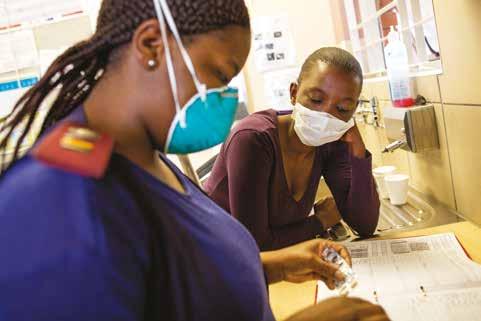
In 2016, the team focused on developing models of care to support specific risk groups, such as pregnant women and their infants, adolescents and men. Thirteen postnatal ‘Moms and Tots’ clubs were established in partnership with the city of Cape Town and NGO mothers2mothers, enabling women to access one-stop services for HIV and other health issues for both themselves and their babies, thereby improving adherence to treatment.
Throughout 2016, MSF fought for access to new TB drugs for eligible patients, both in Khayelitsha and nationally. South Africa now has national access to the new TB drug, bedaquiline, and in Khayelitsha, MSF has the largest national cohort on another promising new medication, delamanid, with 61 new patients initiated on treatment this year. MSF also supports the Western Cape Department of Health to offer ‘strengthened treatment’ regimens to drug-resistant TB patients.
The results of an MSF survey of 800 Rustenburg women between the ages of 18 and 49, which were published in 2016 in a hard-hitting report, Untreated Violence, show that one in four women in Bojanala district have been raped in their lifetime. Half have experienced some form of sexual or intimate partner violence, but 95 per cent of women had never told a health facility about their assault.
MSF supports three Kgomotso care centres, primary healthcare facilities that provide an essential package of medical, legal and psychosocial care to victims of sexual violence, with the aim of preventing illness and reducing the suffering associated with rape. The package includes a forensic examination, post-exposure prophylaxis to prevent HIV and other sexually transmitted infections, and psychosocial support and counselling. In 2016, 290 victims of sexual violence were treated, and all of those eligible received essential medication and/or psychological care.
In addition to working with the provincial health authorities in Rustenburg, MSF
South Africa has the largest HIV patient cohort in the world and is helping to lead the way in gaining access to new treatments for multidrug-resistant tuberculosis (MDR-TB).A woman with extensively drug-resistant tuberculosis is able to collect her medication, which includes the new drug bedaquiline, from her local primary care clinic in Kuyasa, Khayelitsha, instead of spending hours travelling to a hospital.
continued to advocate nationally for increased access to services at healthcare facilities for victims of sexual violence.
Launched in 2011 with MSF as a founding member, the Fix the Patent Laws coalition consists of 32 patient groups and organisations that campaign for reform of South Africa’s intellectual property laws to address obstacles to national access to affordable medicines. Following years of pressure, the South African Department of Trade and Industry released a new intellectual policy consultative framework in July 2016.
In September, the coalition published a report entitled Patent barriers to medicine access in South Africa, comprehensively making the case for patent law reform in the country. The coalition continues to exert pressure on the government to expedite legislative reform.
The Stop Stockouts Project is a civil society consortium supported by MSF and five other organisations, which monitors availability of essential drugs in clinics across the country and pushes for the rapid resolution of stockouts and shortages. Communities are trained on how to report stockouts and
national health authorities are encouraged and if needed, pressured, to advocate the reform of supply chains. In 2016, the project received 605 reports of stockouts through its national hotline, and trained 3,454 patients and community activists. It also secured a three-year grant from the European Union to continue its current operations.
1 Globally endorsed HIV treatment targets that aim, by 2020, for 90 per cent of people living with HIV to be aware of their status; 90 per cent of those diagnosed to be initiated on antiretroviral (ARV) treatment; and 90 per cent of those on ARV treatment to achieve viral suppression.
SINETHEMBA KUSE – 17, from Khayelitsha, was one of the first patients initiated on delamanid in South Africa
“ Just imagine being told that you have MDRTB just before Christmas. The same day the doctor gave me tablets and I also got an injection. The injections were painful. I was scared of the needle because I had to be injected every day. Sometimes I would
bleed and I even got lumps. I swallowed a lot of tablets, so I would vomit or be dizzy. Later, we were told about a new medication that is available in Khayelitsha that not a lot of people are lucky enough to have. Dr Jenny [Hughes] of MSF explained more
about this new drug called delamanid. In February 2015, I started taking it. All I can say is that there is hope. I trusted it with my life and it worked. My gran and everybody started noticing the difference – even my gran’s church friends saw the change.”
No. staff in 2016: 20 |
Expenditure: d 1.3 million | @MSF_Seasia
Indonesia
MSF provided mental healthcare to Rohingya refugees living in four camps in Banda Aceh. This included psychological sessions, which 1,244 people attended. When the number of consultations fell in late 2016, the team adopted a mobile strategy and worked from a base in the capital, Jakarta.
Teams also carried out emergency interventions, donating hygiene kits after flashfloods in West Java, and providing psychological support to 2,529 people following an earthquake in Aceh.
In 2016, MSF worked with a Thai organisation to provide mental health support to migrant communities in detention facilities, as well as to victims of human trafficking in shelters and immigration detention centres in southern Thailand.

Over 2,400 migrants took part in psychosocial sessions and, in 230 cases, the team provided individual and family counselling. Detainee numbers in immigration detention centres declined as the authorities eased pressure on smuggling networks, and the project closed at the end of 2016.
MSF supported partner NGOs in providing healthcare via mobile clinics to the Rohingya and other migrant groups. In 2016, the team carried out 3,294 consultations and saw 236 pregnant women. More than 100 people in need of secondary or specialised healthcare were referred to public hospitals. MSF also addressed the protection needs of asylum seekers by making referrals to the UNHCR, the UN refugee agency, on behalf of those who were not authorised to file applications directly. During the year, MSF identified and referred 253 cases.
Médecins Sans Frontières (MSF) worked with migrants and refugees, including the Rohingya people, in locations across Southeast Asia.
No. staff in 2016: 3,683 | Expenditure: d 86.9 million | Year MSF first worked in the country: 1983 | msf.org/southsudan blogs.msf.org/southsudan | @MSF_SouthSudan
KEY MEDICAL FIGURES:
934,400 outpatient consultations
313,500 patients treated for malaria
55,400 antenatal care consultations
47,700 measles vaccinations in response to an outbreak
25,100 routine vaccinations
14,300 patients treated in feeding centres
1,000 patients treated for cholera
Sudan from their homes. Hundreds of thousands have been unable to access basic necessities such as food, water, and primary and secondary healthcare for months at a time, and live in fear for their lives.
In 2016, Médecins Sans Frontières (MSF) continued to respond to the urgent medical needs of people affected by violence and maintained its essential healthcare programmes across South Sudan, despite the growing challenges we face reaching those in greatest need. As insecurity and violence spread across the country, providing humanitarian assistance has become increasingly complex and, in some places, increasingly dangerous.
Juba
After fighting broke out in the capital, Juba, in July, MSF set up a surgical facility and ran mobile clinics across the city. In the first month, one outreach team treated 9,242 people for violence-related injuries and health problems caused by the deteriorating living conditions.
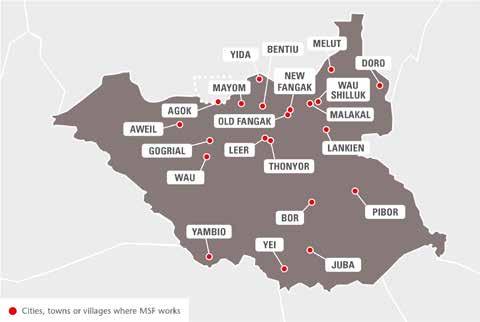
MSF staff also helped the Ministry of Health to set up and run a cholera treatment centre in Juba teaching hospital.
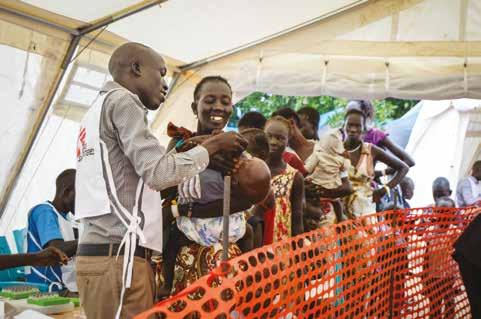
Greater Upper Nile Region
Pibor
The MSF clinic in Pibor provides inpatient and outpatient care, including maternity and emergency services. Looting in February temporarily halted activities, but the clinic was fully operational again by April. The
team started to offer surgery towards the end of the year.
Doro
MSF staff continue to offer medical care to the 50,000 Sudanese refugees in Doro camp, as well as the local community in Maban county. Mobile clinics deployed during a spike in malaria tested 9,970 people for the disease.
More than three years of ongoing conflict, which has included extreme violence against civilians, has forced millions of people across South
Lankien
The MSF hospital in Lankien is the only functioning medical facility in the area. Although malnutrition rates were lower than expected this year, the team still admitted 1,068 patients to the therapeutic feeding programme. Malaria is the main illness treated at the Lankien hospital and the primary healthcare centre in Yuai. In 2016, teams at the hospital in Lankien also provided treatment to 1,530 patients for kala azar (visceral leishmaniasis), a potentially fatal disease spread by sandflies. A total of 116,944 outpatient consultations were carried out in 2016 at Lankien hospital and the Yuai healthcare centre.
Bor
MSF continued to train staff and rehabilitate buildings at Bor state hospital. From April, the team supported surgery and worked to improve the pharmacy, sterilisation and waste management.
Fangak
In 2016, MSF refocused its presence to provide access to healthcare in the war-torn Fangak area, progressively handing over its outpatient activities in Old Fangak, and starting activities in New Fangak, where only a few other humanitarian organisations are present. In Old Fangak, MSF supported a 40-bed hospital, where 66,000 outpatient consultations were provided and 1,800 patients were admitted.
Insecurity led many more civilians to seek refuge at the PoC site in Bentiu. MSF remains concerned about the consequences of the sub-standard conditions on the health of the 120,000 people living there. MSF runs the only hospital on the site, a 160-bed facility with an emergency room, operating theatre and maternity unit. Treatment is also available for sexual and gender-based violence, HIV, tuberculosis (TB), cholera, malaria and kala azar. In addition, teams run health promotion, monitoring and outreach activities across the site and in Bentiu town. In 2016, MSF conducted 40,380 primary healthcare consultations and admitted 4,325 patients.
In early 2016, MSF set up emergency services in Leer and Mayendit counties as intense fighting displaced thousands of people, mostly into nearby swamps. The area remains a conflict zone, and the humanitarian needs are immense. Mobile teams provide basic
© Fabio Basone/MSFhealthcare, focusing on malaria, respiratory tract infections, diarrhoeal diseases, nutritional support, vaccinations, and treatment for victims of sexual violence. In July, medical activities were temporarily disrupted when the MSF compound in Leer town was looted.
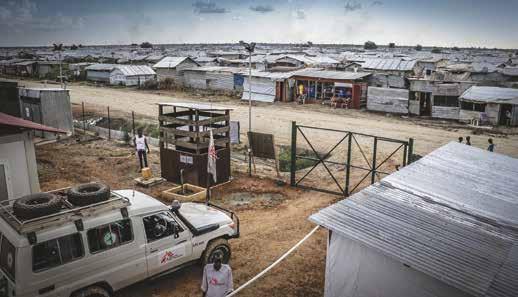
In Yida, MSF offers a broad range of inpatient and outpatient services, including vaccinations, and HIV and TB treatment, to refugees from South Kordofan, Sudan.
In Mayom county, MSF runs a clinic with the Ministry of Health offering basic emergency healthcare, as well as treatment for HIV and TB.
In February, the MSF-run hospital in Malakal PoC site was attacked, and over 25 people were killed, including two staff members. MSF published a report on the events and launched an international advocacy campaign calling on the United Nations Mission in South Sudan to provide credible security to civilians under its care and improve the conditions in the PoC. In June, a new 60-bed hospital was completed on the site to replace the existing structure, and MSF also opened a medical centre in Malakal town with outpatient and inpatient departments and a delivery room to cater for the growing population.
On the opposite bank of the White Nile, Wau Shilluk hospital continues to provide primary and secondary healthcare for displaced people who have settled in the area.
Yei
Following an increase in violence in Equatoria region, MSF set up a clinic to provide healthcare and mental health
support, as well as vaccinations. From November, mobile teams were deployed, and treated 1,368 patients in the first week.
In November, a project set up in response to fighting around Mundri had to be suspended after an armed robbery.
Despite sporadic clashes in the Yambio area, MSF continued its HIV ‘test and treat’ programme, which focuses on providing antiretroviral treatment to patients as soon as they are diagnosed.
Bahr El Ghazal region
Aweil hospital, the only secondary healthcare facility in the area, serves 1.5 million people. In 2016, the team provided maternal and child healthcare and responded to a sharp increase in malaria cases.
Further South, in Wau, MSF carried out around 42,000 consultations when violent clashes displaced over 60,000 people in June.
Agok, Abyei Special Administrative Area
Agok hospital provides specialist and emergency care to over 140,000 people in remote Abyei. In 2016, teams carried out around 50,000 consultations and 1,600 surgical interventions. In addition, MSF’s malaria programme treated over 40,000 patients in isolated villages.
At the end of 2016, the team started to wind down operations in the medical facility in Melut as other organisations had stepped in to provide healthcare. In Gogrial, where MSF started working in 2009, most medical activities were handed over to the Ministry of Health in May.
No. staff in 2016: 455 | Expenditure: d 39.4 million | Year MSF first worked in the country: 2009 | msf.org/syria blogs.msf.org/syria | @MSF_Syria
KEY MEDICAL FIGURES:
372,700 outpatient consultations
5,300 relief kits distributed
2,000 births assisted
Civilian areas have been routinely bombed and deprived of assistance. Access to food and healthcare remains extremely poor, especially in places under siege. Many hospitals are facing critical shortages of supplies and staff, as so many health workers have fled or been killed. Well over half of the Syrian population have been forced from their homes by the conflict. According to the UNHCR, the UN refugee agency, more than 4.8 million people have sought refuge abroad and another six million are internally displaced. Many remain trapped in areas that are under siege or stranded at the closed borders of neighbouring countries.
Medical facilities, staff and patients have been victims of indiscriminate and targeted attacks. In 2016, 32 medical facilities receiving support from Médecins Sans Frontières (MSF) were bombed or shelled on 71 separate occasions. In one attack on 15 February, an MSF-supported hospital in Ma’arat Al Numan, Idlib governorate was hit by four missiles. Twenty-five people were killed and 11 were wounded, including hospital staff, patients, caretakers and visitors. On 27 April, at least 55 people, including patients and medical staff, were killed when airstrikes hit the MSF-supported Al Quds hospital and the surrounding neighbourhood in Aleppo city. According
to the American University of Beirut Commission on Syria, 814 health workers have been killed since the war began.
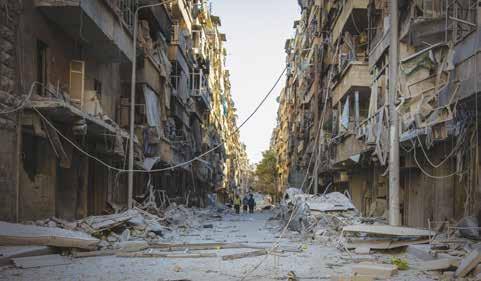
MSF’s direct presence is significantly constrained in a country where it should be running some of its largest medical programmes. The Syrian government has not granted MSF authorisation to operate in the country, despite repeated requests, and insecurity has limited MSF’s ability to provide assistance in opposition-controlled areas. Following the Islamic State (IS) group’s abduction and release of MSF staff in 2014, and the impossibility of obtaining the necessary safety guarantees from its leadership, MSF withdrew from IS-controlled areas.
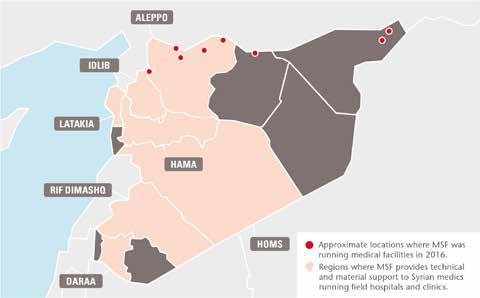
In 2016, MSF continued to operate directly in six medical facilities in regions controlled by other opposition forces across northern Syria and provide distance support to Syrian medical networks in areas where MSF cannot be directly present.
Since 2014, MSF has been providing regular medical supplies to eight hospitals, six health centres and three first-aid points in eastern Aleppo city. However, following the consolidation of the siege by the government-led coalition in July 2016, these activities halted. Only one shipment of approximately 100 tonnes of medical
The extreme violence perpetrated against civilians during six years of war in Syria shows no sign of abating.
supplies was delivered thereafter, when a temporary passage into eastern Aleppo was opened by opposition groups in August. Although no longer able to offer direct support, MSF kept in close contact with the doctors and nurses it had been working with in eastern Aleppo. They testified to the immense suffering of the people trapped in the city, where civilian areas, including hospitals, were routinely hit in targeted or indiscriminate bombings and shellings.
In December, the Syrian government took full control of Aleppo city and thousands of people from the eastern part were evacuated to rural areas of Idlib and Aleppo governorates. Since then, MSF has been running mobile clinics and distributing relief items in these areas, where it also organised a vaccination campaign.
In Azaz district, north of Aleppo, MSF runs the 34-bed Al Salamah hospital, offering a wide range of services including outpatient and inpatient consultations, emergency treatment, surgery and maternal care. Patients needing further treatment are referred to other facilities in the district or Turkey. In 2016, staff conducted 85,737 outpatient consultations, performed 1,598 surgical interventions and admitted 3,692 patients.
Renewed fighting in Azaz caused the displacement of more than 35,000 people: by April, more than 100,000 people were trapped between the frontline and the Turkish border. MSF delivered relief items and hygiene kits for 4,345 families (26,070 people) and tents for 1,330 families. A water and sanitation programme was also implemented in one of the informal settlements east of Azaz town.
In June, MSF supported vaccination activities in three districts of Aleppo governorate within the framework of the Expanded Programme on Immunisation (EPI), and conducted two measles vaccination campaigns.
In the Kobanê/Ain al-Arab area of northern Syria, MSF has worked alongside the local health administration since March 2015 to re-establish basic health facilities and vaccination services, provide outpatient healthcare and implement psychological support programmes. It currently supports nine primary health units, a maternity clinic and two hospitals. In 2016, five teams were deployed to 21 locations to conduct EPI vaccinations and screening for malnutrition. More than 101,680 outpatient consultations and 138 surgical interventions were carried out in MSF-supported facilities. In rural Jarablus, MSF partnered with the Turkish NGO AID to assist three primary health centres.
In the summer, shifting frontlines and a military offensive caused civilians to flee Manbij and settle near the Euphrates river. MSF scaled up its support to help meet the needs of the displaced and host communities.
When people returned to their homes in August, they found that the city had been extensively planted with mines, booby traps and other explosive devices. Over the course of just four weeks, an MSF-supported hospital in Kobanê treated more than 190 people injured by explosive devices in Manbij.
Idlib governorate
MSF continued to run a 20-bed burns hospital in Atmeh, providing patients with surgery, skin grafts, dressings and physiotherapy, as well as mental health support, emergency care and outpatient consultations. MSF also runs vaccinations, health education and disease surveillance activities in 180 camps and villages hosting approximately 165,000 internally displaced people around Atmeh, and ensures follow-up for patients requiring more specialised treatment in Turkey.
During 2016, the MSF team in Atmeh hospital carried out 2,883 emergency consultations, and performed 3,696 surgical interventions. Four hundred and thirty-nine patients were admitted to the inpatient wards and 398 were transferred to Turkey for further treatment. In the camps and villages, MSF staff administered more than 118,000 doses of vaccines to children under the age of five.
In Qunaya, MSF scaled up its distance support to the regional referral hospital, comprehensively supporting all its services in terms of material and technical oversight. In 2016, the hospital provided 105,168 outpatient consultations and 12,011 cases were treated in the inpatient department. Teams also started supporting EPI activities in Qunaya and Darkoush hospitals, administering a total of 53,341 vaccines.
Since 2013, MSF teams have been offering primary health services, with a particular
focus on maternal and child healthcare and chronic diseases, through three health centres, including a maternity clinic. These services are open to both internally displaced people and host communities, as well as to Iraqi refugees. This year, MSF teams provided 44,873 general consultations, 8,257 of which were for children under the age of five. A total of 951 patients were treated for chronic diseases and 5,598 reproductive health consultations were provided. Staff also assisted an average of 170 births each month.
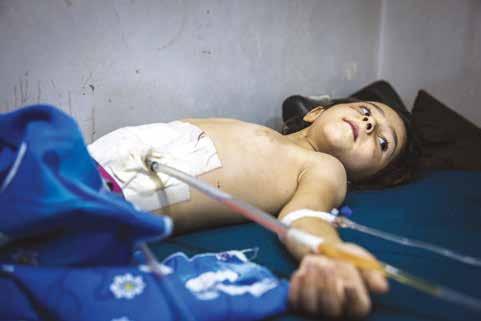
Since 2011, MSF has been supporting a growing number of medical facilities in some of the areas worst affected by conflict where it has no direct access. This programme is mostly run from neighbouring countries and consists of donations of medicine, medical material and relief items; distance training for staff inside Syria; technical medical advice; and financial support to cover the facilities’ running costs. In besieged areas, the medics’ reliance on MSF’s underground support is all the more critical as medical essentials are often removed from the official aid convoys by the besieging forces.
In 2016, regular support was given to 80 medical structures across Syria, including in Aleppo, Daraa, Hama, Homs, Idlib, Quneitra and rural Damascus governorates. These facilities conducted more than 2.2 million outpatient consultations, 770,000 emergency room consultations, 225,000 surgeries, and assisted over 29,000 births. Not all of these activities can be solely attributed to MSF programmes: while some facilities are exclusively supported by MSF, many benefit from additional sources of assistance. Ad hoc support, such as medical donations, was provided to an additional 80 medical facilities across the country.
KEY MEDICAL FIGURES:
65,200 measles vaccinations in response to an outbreak
28,800 outpatient consultations
450 group mental health sessions
300 individual mental health consultations
Sierra Leone was finally declared Ebola-free on 17 March 2016 and the country is now struggling to rebuild its shattered health system.
Access to medical care was already limited before the epidemic, and it is estimated that around 10 per cent of the country’s health professionals were among the 3,950 people killed by the virus.
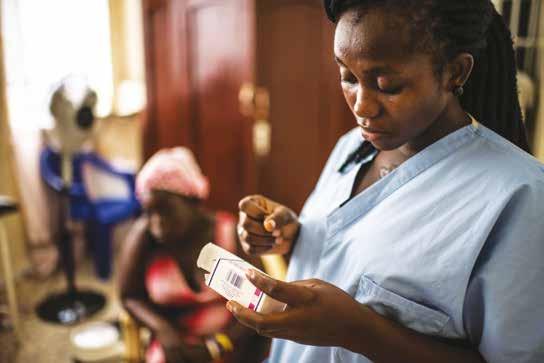
Around 14,100 people were infected with Ebola (suspected, probable and confirmed cases), and some survivors struggled with complications for months afterwards.
The survivors’ clinic that Médecins Sans Frontières (MSF) opened in July 2015 was handed over to the Ministry of Health at the end of September 2016. The clinic provided medical treatment and mental healthcare to more than 400 survivors and their families, organising over 450 mental health sessions. The clinic also ran awareness-raising
activities promoting safe sex, hand washing and malaria prevention. When survivors reported experiencing stigma, health promoters were deployed to educate their communities about the disease.
In order to retain sufficient emergency response capacity in the event of future disease outbreaks, the Sierra Leone Emergency Response Unit was established. The unit supported the Ministry of Health with infectious disease reporting and emergency response training in three districts, as well as vaccination campaigns, including one for Ebola.
Before the epidemic, Sierra Leone had some of the worst health indicators in the world, especially for maternal and child mortality. In Tonkolili district, MSF supports the paediatric ward, maternity and neonatal services, and the blood transfusion laboratory at Magburaka district hospital, and also assists Magburaka mother and child health post with staff and supplies. In Yoni Chiefdom (Hinistas), MSF provides emergency obstetric care in a community health centre. In 2016, a total of 21,180 outpatient
and 6,245 antenatal consultations were conducted, 2,996 children were admitted to the paediatric ward and 1,457 deliveries were assisted.
In April, MSF started a project in Koinadugu to reduce the maternal, neonatal and child mortality in the district. MSF rehabilitated Kabala hospital, extending the capacity of the paediatric ward from 15 to 45 beds and creating a three-bed neonatal ward. Between April and December, 1,660 children under the age of 12 were admitted for treatment, 148 of them for severe acute malnutrition. Teams provided care to 1,185 pregnant women, assisted 783 deliveries, including 111 caesarean sections, and registered 1,240 people for family planning.
The project also provides healthcare to Ebola survivors – 48 patients are currently being followed up. The team screened 23,197 people for the disease (none tested positive). Screening is also available for malaria and HIV.
Teams in Koinadugu monitor the nutrition situation and respond to emergencies and disease outbreaks. In May, 65,159 children were vaccinated against measles.
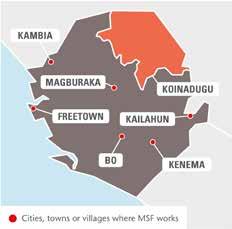
No. staff in 2016: 597 | Expenditure: d 11.8 million | Year MSF first worked in the country: 1979 | msf.org/sudan
At the new project in Sortoni, MSF treated 40,616 outpatients and 474 inpatients. The project also provided nutritional services to 812 children and vaccinated 9,683 children against measles.
MSF was active in the gold mining area of El Sireaf, where clashes between local and nomadic groups had taken place. In all, 51,000 outpatient and inpatient consultations were carried out.
settled. The hospital also serves as a referral point for five nearby camps and benefits the host community.
KEY MEDICAL FIGURES:
309,900 outpatient consultations
29,500 antenatal consultations
19,900 people vaccinated for measles in response to an outbreak
4,500 routine vaccinations
At Dar Zaghawa, four MSF-run health centres offered medical care, with a particular focus on mothers and children.
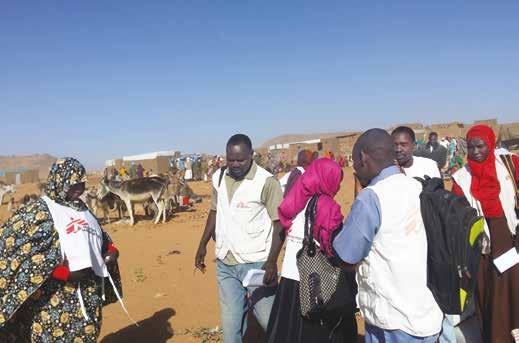
In El Geneina town, West Darfur state, MSF teams supported three primary health centres until the end of 2016. During a peak in malnutrition between September and November, MSF helped El Geneina governmental hospital to manage 129 severely malnourished children with medical complications.
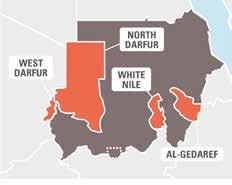
MSF runs a 40-bed hospital outside Kashafa camp in White Nile State, where over 17,000 refugees from South Sudan have
In the village of Tabarak Allah, in Al-Gedaref State, eastern Sudan, MSF has worked on the management of visceral leishmaniasis (also known as kala azar) since 2010. This parasitic disease, which is transmitted by sandflies, has a 95 per cent mortality rate if it is not treated. In 2016, MSF screened 2,180 people for suspected kala azar and admitted 545 of them to Tabarak Allah government rural hospital.
In late 2016, MSF started supporting Bazura hospital, south of the state, where kala azar is also endemic. This support consists of providing supervision and training to improve case management, refurbishing and constructing facilities, and improving water and sanitation.
MSF also gives on-the-job training to Ministry of Health staff. A team runs health education and awareness-raising activities for the Tabarak Allah and Bazura communities in partnership with a local NGO.
In early 2016, fighting displaced over 160,000 people in Jebel Mara to camps around the area. MSF responded by deploying its North Darfur Emergency Response team to set up a health centre in Sortoni and increased operations in Tawila. By December, Tawila had a population of 41,000 established displaced people and another 27,000 who arrived during the Jebel Mara emergency. The overwhelmed health facility managed to provide 108,933 outpatient consultations and admitted 4,878 to the inpatient department. Malnutrition, diarrhoeal diseases and malaria were the main reasons for admission.
Médecins Sans Frontières (MSF) continued to provide emergency medical treatment in Sudan despite some restrictions to areas affected by conflict.
No. staff in 2016: 446 | Expenditure: d 9.6 million | Year MSF first worked in the country: 2007 | msf.org/swaziland
KEY MEDICAL FIGURES:
20,300 patients received first-line ARV treatment
1,300 patients started treatment for TB, of which 310 for MDR-TB
positive HIV diagnosis to immediately start treatment. Twelve months after treatment initiation, 82 per cent of people who were on treatment had successfully suppressed the virus. As a result, ‘test and start’ was adopted by the Ministry of Health as the national standard of HIV care in October 2016.

Swaziland has one of the world’s highest rates of HIV, with nearly one in three adults living with the disease. Estimates suggest that HIV incidence rates have fallen in recent years, as significant progress has been made in improving the number of people receiving antiretroviral (ARV) treatment. In addition, the incidence of drug-sensitive TB has more than halved between 2010 and 2016, as numbers of people with drug-resistant forms of TB have fallen by 20 per cent between 2015 and 2016. However, around 80 per cent of people with TB in Swaziland are HIV positive.
In 2016, MSF continued to help more HIV patients access ARV treatment through the ’test and start’ strategy. A team has been piloting ‘test and start’ in the Nhlangano project; after HIV testing, ARV treatment was offered to more than 1,700 people after a
MSF has started treating patients with extensively drug-resistant TB (XDR-TB), and those developing severe side effects, using the promising new drugs bedaquiline and delamanid in combination with repurposed drugs. Almost all of the 81 XDR- and multidrug-resistant (MDR) TB patients had achieved culture conversion after six months (meaning that TB bacteria could no longer be detected in their sputum, and they were on the way to being cured). Most of these patients receive treatment at the national DR-TB referral hospital in Moneni, where MSF is supporting the Ministry of Health to strengthen outpatient care.
In 2016, MSF handed over first-line ARV treatment and in-facility HIV testing in 16 out of 22 primary health clinics in Shiselweni to AIDSFREE/PEPFAR. MSF is increasingly focusing on providing specialised HIV
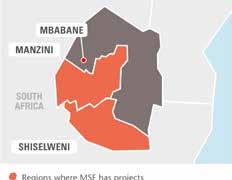
care, including second- and third-line ARV treatment, cervical cancer screening, and routine point-of-care testing for opportunistic infections. In 2016, 31,784 patients had HIV viral load tests, 407 received second-line ARV treatment, 1,407 were enrolled in community models of care, and 647 women were screened for cervical cancer, of whom 19 per cent tested positive.
In Manzini, MSF has been implementing the shorter DR-TB treatment regimen (nine to 12 months instead of two years) since 2014, and has seen a success rate of 75 per cent. This regimen has since been recommended by the World Health Organization, and was adopted by the Ministry of Health as the new national standard of care for MDR-TB treatment, with MSF providing support.
MSF continued to offer comprehensive healthcare with integrated HIV and TB services in Matsapha. The team is also exploring a new model of care for noncommunicable diseases (NCDs), including for people infected with HIV and TB. The majority of the 731 patients treated for NCDs had either hypertension or diabetes.
This year, Médecins Sans Frontières (MSF) focused on reducing HIV transmission and improving access to decentralised care for people with HIV, tuberculosis (TB) and drug-resistant TB (DR-TB) in Swaziland.
No. staff in 2016: 8 | Expenditure: d 1.7 million | Year MSF first worked in the country: 1991 | msf.org/serbia
Preševo
MSF teams were present in Miratovac to provide medical assistance to hundreds of people who walked across the border between the Former Yugoslav Republic of Macedonia (FYROM) and Serbia.
Šid
KEY MEDICAL FIGURES:
39,600 outpatient consultations
3,700 group mental health sessions
1,700 individual mental health consultations
In Šid, MSF operated inside a transit centre next to the train station and set up eight large heated tents with a capacity for more than 2,000 people. Activities were handed over in March, as camp numbers had fallen and other organisations were meeting the needs there.
From April to November 2016, MSF assisted people stranded in appalling conditions
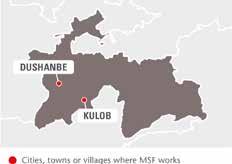
around Subotica. MSF carried out 7,407 medical consultations, and registered a steady and significant increase in various violence-related traumas. During 2016, MSF treated 82 people for dog bites, irritations from tear gas and pepper spray, or injuries from beatings inflicted on them as they attempted to cross the SerbianHungarian border.

Belgrade
Since 2014, MSF has provided basic medical and mental healthcare to people in reception and asylum facilities and operated mobile clinics. MSF conducted more than 18,000 consultations in 2016, and focused on providing services to undocumented migrants living in abandoned train depots, without access to healthcare.
No. staff in 2016: 102 | Expenditure: d 2.0 million | Year MSF first worked in the country: 1997 | msf.org/tajikistan
Since November 2011, MSF has been working with the Tajik Ministry of Health to diagnose and treat children and their family members who are diagnosed with drug-sensitive and drug-resistant tuberculosis (DR-TB). This year, the promising new drugs bedaquiline and delamanid were used for the first time in the country. Currently, 17 patients are on bedaquiline and four on delamanid.
Where possible, the programme aims to treat patients at home, and demonstrates that comprehensive TB care for children is feasible. MSF also supports the paediatric TB hospital in Dushanbe and the paediatric ward in Machiton hospital.
The comprehensive model of TB care includes patient follow-up, active testing for new patients, laboratory diagnosis, individualised treatment and psychosocial support (including play therapy). The project
also treats children who have both TB and HIV, and TB and severe malnutrition. In 2016, MSF worked with the Ministry of Health to finalise the third version of the paediatric guide for Tajikistan, providing information about best practices for the treatment of children with TB. Since the beginning of the project, 147 patients with TB have been treated.
In the south of the country, MSF runs Kulob paediatric HIV and family project. The main objective is to reduce illness and mortality of children with HIV/AIDS, with a special focus on co-infections with other diseases and the prevention of HIV transmission. Since June, the team has assisted 79 patients (62 children and 17 family members) with treatment for opportunistic infections, prevention of mother-to-child transmission of HIV, and nutritional and social support programmes.
Médecins Sans Frontières (MSF) continues to focus on improving children’s access to treatment for tuberculosis (TB) in Tajikistan.
No. staff in 2016: 193 | Expenditure: d 9.9 million | Year MSF first worked in the country: 1993 | msf.org/tanzania
MSF donated emergency medical supplies to help the local hospital treat the injured.
Nyarugusu refugee camp
KEY MEDICAL FIGURES:
254,000 outpatient consultations
390 patients treated in feeding centres

According to figures from UNHCR, the UN refugee agency, by the end of 2016 Tanzania was hosting approximately 280,000 refugees, mainly from Burundi. Due to ongoing unrest in the neighbouring country, people continued to pour across the border and by December over 10,000 were arriving each month. This put additional pressure on the already full and overstretched camps, and the humanitarian organisations working there struggled to provide adequate shelter, water and sanitation. Housing new arrivals in overcrowded and unhygienic communal shelters exacerbated the spread of diseases, particularly malaria, diarrhoea and respiratory tract infections.
To meet the increased demand for care, MSF expanded its services across the three camps – Nyarugusu, Nduta and Mtendeli. This included restructuring existing facilities in Nyarugusu and Nduta to respond to the huge number of patients suffering from malaria. In Mtendeli camp, MSF was supplying around 428,000 litres of water daily and providing community health surveillance until September 2016, when both these activities were handed over.
In September, in the aftermath of a severe earthquake near the northern town of Bukoba,
MSF continued to support the intensive therapeutic feeding centre at the camp hospital, treating 175 patients before handing it over to the Tanzanian Red Cross in March. MSF’s mobile clinics, which conducted outpatient consultations and nutrition programmes, were also phased out. However, three mobile clinics aimed specifically at reducing infection and mortality from malaria were still deployed. A 40-bed stabilisation unit and a blood bank were also established. In 2016, MSF carried out 64,450 outpatient consultations, of which 46,380 were for malaria, and distributed 65,000 mosquito nets. Teams also conducted 24,550 mental health consultations and supported water and sanitation activities, distributing a total of 65.7 million litres of water by December.
Nduta refugee camp
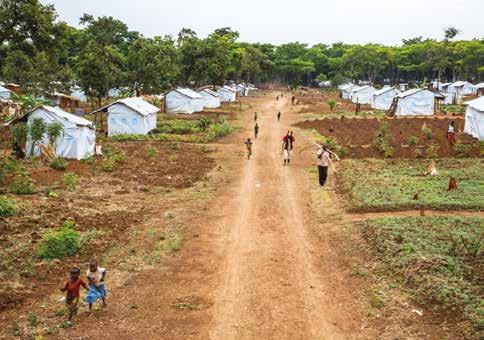
MSF is the main healthcare provider in Nduta camp and the only organisation offering a full range of medical services, including reproductive healthcare, treatment for malnutrition and care for victims of sexual violence. In 2016, the team refurbished and expanded the 120-bed hospital, and ran five health posts, conducting medical screenings, vaccinations and referrals, and offering mental health support. Over the course of
the year, staff carried out 186,345 outpatient consultations, assisted over 3,000 deliveries, and treated almost 44,260 people for malaria. In addition, they conducted health promotion and water and sanitation activities in the camp, distributing 41,973 mosquito nets and 70.4 million litres of water between January and October.
RAMADHANI LUBUNGA –26, Burundian refugee
I’ve been living in Nyarugusu for six months but have actually spent most of my life as a refugee: I grew up in another camp in Tanzania after my parents and I were forced to flee our country. I still find the conditions here difficult, though – it’s a struggle to get enough food and water and living in a tent wears you down. I’ve just been diagnosed with malaria and I can’t stop shivering and shaking. I have a headache and nausea and feel very cold. I’m also worried about my wife. She is four months pregnant but has been having stomach pains and is now in the camp hospital. I’m scared about what might happen to our unborn baby. Refugees never have a good life, but it’s better than living in fear at home. I can’t and won’t go back home. I will stay in this camp until I die.”
No. staff in 2016: 25 | Expenditure: d 0.9 million | Year MSF first worked in the country: 2011
MSF has been offering primary healthcare and mental health support through its facility in Zarzis, a coastal town in southeast Tunisia, since 2012. In response to increased health needs, medical activities were expanded to cover migrants and vulnerable communities in Sfax, a large city 280 kilometres north of Zarzis. A team also continued to provide medical assistance to the people remaining in Choucha camp, near the Libyan border. During 2016, MSF clinics conducted 384 medical consultations and treated 226 new patients who were mainly from sub-Saharan Africa but also included Syrians, Libyans and Tunisians. MSF supported local efforts to deal with
the level of death and suffering at sea by providing search and rescue and dead body management training to Tunisian and Libyan fishermen, coastguards, Tunisian civil protection and customs, and the Libyan Red Crescent. MSF conducted two rounds of training in March and June –the peak months in the migration season – which were attended by more than 230 people, and donated medical supplies and 9,826 pieces of personal protection and rescue equipment to the trainees. In addition, MSF donated emergency kits to three hospitals, consisting of enough drugs and medical supplies for an influx of 50 wounded patients.
No. staff in 2016: 73 | Expenditure: d6.0 million | Year MSF first worked in the country: 1999 | msf.org/turkey | @MSF_Turkiye
Cities, towns
KEY MEDICAL FIGURE:
projects
9,500 individual mental health consultations
Around 90 per cent of Syrian refugees in Turkey live in precarious conditions outside camp settings with insufficient access to basic public services. Within this context, a failed coup attempt on 15 July and the political turmoil that continued under emergency law in the second half of the year pushed humanitarian concerns further down the political agenda.
Although its authorisation to work in the country expired in June, Médecins Sans Frontières (MSF) continued to provide financial and technical support to local NGOs working on the Syrian-Turkish border. Teams in Turkey also gave remote support to medical staff in Syria.
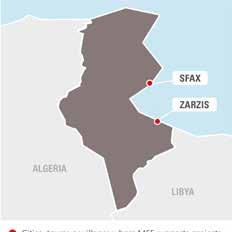
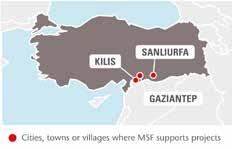
Kilis
MSF worked with partners to offer primary healthcare and psychosocial support to Syrian refugees. In 2016, 1,354 individuals and 810 families received psychotherapy consultations.
Sanliurfa
An MSF-supported local partner organisation conducted 1,341 individual and 69 group counselling sessions in Sanliurfa. MSF supported another local NGO’s psychosocial support programme in Akçakale, which provided 2,554 individual consultations. Until the closure of Akçakale transit camp in May 2016, MSF also helped with primary healthcare services, psychosocial care, water and sanitation, and provided relief items.
Gaziantep
MSF collaborated with an international medical humanitarian organisation to provide treatment to Syrian refugees in the Voluntary Health Centre for People under Temporary Protection, which offered paediatric and sexual and reproductive health (SRH) consultations. MSF concluded its activities in April 2016, having carried out SRH consultations with more than 2,500 women.
In 2016, Médecins Sans Frontières (MSF) continued to provide medical and humanitarian assistance to thousands of migrants stranded close to the Libyan border or rescued from the Mediterranean Sea.
By the end of 2016, Turkey was hosting the largest refugee population in the world – over three million – of whom 2.8 million are Syrian.
No. staff in 2016: 342 | Expenditure: d 8.1 million | Year MSF first worked in the country: 1986 | msf.org/uganda
KEY MEDICAL FIGURES:
50,500 outpatient consultations
15,800 patients treated for malaria
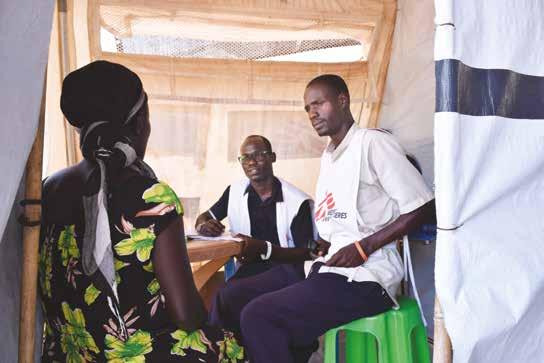
7,600 patients received first-line ARV treatment
Although the number of new cases per year has been declining (from 160,000 in 2010 to 95,000 in 2014), seven per cent of the population (about 1.5 million people) is HIV positive. HIV/AIDS is the number one killer disease for adolescents in Africa, and Uganda is no exception. Adolescents are also vulnerable to sexual violence, early and/or unwanted pregnancies, and unsafe abortions.
MSF has been offering point-of-care HIV viral load testing in Arua regional hospital since 2013. Point-of-care testing facilitates rapid detection and early treatment, leading to improved outcomes for patients. Between September 2013 and September 2016, 20,845 viral load tests were performed. Sixty patients suspected of failing second-line antiretroviral (ARV) treatment consequently benefited from
drug-resistance testing. Of these, 22 were confirmed to have failed and 19 were initiated on third-line ARV treatment.
In Kasese, MSF runs a clinic providing basic and comprehensive healthcare to adolescents, including sexual and reproductive health services, and HIV and tuberculosis (TB) prevention, screening and treatment. Community awareness-raising (radio shows, social media marketing, networking) and recreational activities within the clinic encourage adolescents to come for a consultation. In 2016, more than 11,700 outpatient consultations were carried out and 3,200 adolescents were tested for HIV.
In the three districts around lakes George and Edward (Kasese, Kamwenge and Ruburizi), MSF runs a project to improve detection and care for HIV, TB and malaria in fishing communities. A proactive screening campaign, launched in February 2016 at the fishermen’s landing sites, resulted in 13,771 people being tested for HIV. MSF provides technical support in five health centres offering comprehensive,
decentralised care at these landing sites. In 2016, 1,234 viral load tests were performed for people on HIV treatment.
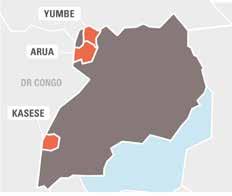
Uganda currently hosts more than a million refugees, the highest number in any African country. Approximately 700,000 are South Sudanese, who fled after intense fighting erupted in their country in July 2016.
In northern Uganda, the massive influx overwhelmed the capacity of the implementing partners of UNHCR, the UN refugee agency, particularly at the new settlement in Bidibidi, which saw around 2,000 arrivals per day, and a total of almost 230,000 by the end of November. In Bidibidi, MSF filled the gaps in needs, including outpatient, inpatient and maternity consultations, disease surveillance, and provision of clean drinking water, latrines and sanitation. In November, MSF teams were trucking in 66,000 litres of water per day. Every day, between 60 and 200 people received a consultation in the MSF clinic; around 60 per cent of these were for malaria.
In 2016,
refugee population swelled and HIV remained a major public health issue, despite significant improvements.
No. staff in 2016: 154 | Expenditure: d 5.2 million | Year MSF first worked in the country: 1999 | msf.org/ukraine | @MSF_Ukraine
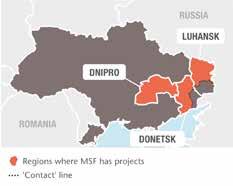
Throughout 2016, Médecins Sans Frontières (MSF) continued to run mobile clinics along the frontline, and increased psychological and medical support to people living in the areas controlled by the Ukrainian government, including those who had been displaced.
Handover of activities in Bakhmut
KEY MEDICAL FIGURE:
3,100 individual mental health consultations
MSF psychologists worked in 26 locations in the southern part of the conflict zone, providing a total of 3,052 consultations for patients suffering from acute or chronic stress. Many had lost relatives or friends in the conflict or had fled because their homes had been damaged or destroyed. MSF also held group sessions to bring elderly people together, including those who had been displaced.
MSF ensured continuity of care for people suffering from chronic diseases such as diabetes and hypertension, as the conflict had interrupted their access to drugs and medical services. In 2016, MSF conducted a total of 38,292 outpatient consultations.
MSF teams worked in 40 locations in and around Bakhmut and assisted more than 40,000 residents and 10,000 displaced people. In July, when they saw that the capacity of the local health system had improved and people were receiving the necessary care, they withdrew from the area. In other areas, MSF donated medical supplies to health facilities and handed over its activities, equipment and supplies to other organisations.
Drug-resistant tuberculosis (DR-TB) MSF continued to support and treat prisoners with DR-TB in pre-detention centres in Mariupol and Bakhmut and in the penal colony in Dnipro. In addition to medical care, MSF provides psychosocial assistance to support patients through the difficult treatment regimen.
No. staff in 2016: 248 | Expenditure: d 9.8 million | Year MSF first worked in the country: 1997 | msf.org/uzbekistan
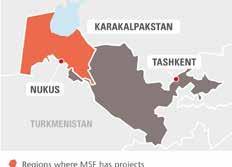
The trial combines the first new TB drugs available in over 50 years with existing drugs to treat drug-resistant forms of the disease. Uzbekistan is among the top 27 countries with the highest rates of multidrug-resistant TB (MDR-TB).
In July, MSF began treating children with a shorter regimen of nine months, instead of the usual 12 months or more, and is conducting research into the results. At the end of December 2016, eight children were on the shorter treatment. The medical outcomes for adults on the shorter treatment will be published at the end of 2017. These initiatives are part of MSF’s drive to develop shorter, more tolerable treatment regimens for people suffering from TB.
MSF runs all its TB projects in collaboration with the regional and central ministries of health. These long-standing relationships have enabled MSF to develop a model of care that for some patients combines outpatient care with a state of the art diagnostic test, GeneXpert, and a
comprehensive support programme. Where possible, this allows them to be treated in their homes from day one. In 2016, over 2,640 patients started TB treatment on this programme; 1,767 were treated for drugsensitive TB and 878 for drug-resistant TB. Sixty-three patients were on treatment for extensively drug-resistant TB and 49 were treated with new drugs: 29 were started on bedaquiline, linezolid and imipenem, 12 on bedaquiline and linezolid, and eight on linezolid and the conventional regimen.
In the capital, Tashkent, MSF supports the regional AIDS centre, with the aim of increasing access to diagnosis and care for patients living with HIV and treating co-infections. In 2016, 25 patients started treatment for hepatitis C, and for the first time in Uzbekistan, 13 patients were initiated on third-line antiretroviral (ARV) treatment for HIV, after their initial and subsequent treatments ceased to work. In total, 842 patients started ARV treatment in 2016.
As the conflict in eastern Ukraine continued into its second year, attempts to find a political solution made little progress, and those living along the frontline bore the brunt of the violence.
In Nukus, Karakalpakstan, in the west of Uzbekistan, Médecins Sans Frontières (MSF) officially launched the tuberculosis (TB) PRACTECAL clinical trial in December. The first patients will begin treatment in January 2017.
No. staff in 2016: 1,317 | Expenditure: d60.2 million | Year MSF first worked in the country: 1986 | msf.org/yemen blogs.msf.org/yemen | @MSF_Yemen
KEY MEDICAL FIGURES:
435,500 outpatient consultations
41,000 antenatal consultations
16,400 surgical interventions
15,800 patients treated for intentional physical violence, including war wounds
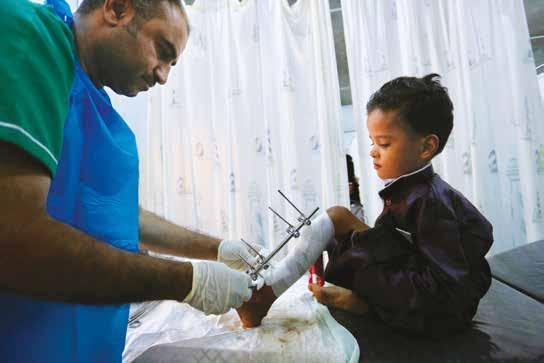
12,500 births assisted
1,100 relief kits distributed
A full-scale war has been raging in Yemen since March 2015 at an immense cost to the population.

Hundreds of health facilities across the country have stopped functioning due to airstrikes and shelling, and a lack of supplies, funding and staff. The rising cost of living has made it extremely hard for families to meet basic needs. Throughout 2016, medical services were in a critical state across the country. MSF scaled up its activities to address the lack of healthcare and to assist the increasing number of war victims. By the end of the year, MSF teams were directly providing healthcare to patients in 12 hospitals and supporting at least 18 other health facilities. In 2016, more than 32,900 patients in facilities operated or supported by MSF received treatment for intentional physical violence, including war wounds. Of those patients, 15,800 were treated by MSF teams. With nearly 1,600 staff, including 82 international staff, MSF’s programme in Yemen is one of its largest worldwide in terms of personnel.
Between October 2015 and August 2016, MSF tragically, and unacceptably, lost 26 colleagues and patients in four separate bombings of health facilities it runs or
supports. The airstrike on Abs hospital on 15 August 2016 killed 19 people, including an MSF staff member, and wounded 24. MSF withdrew its staff from six hospitals in the north of Yemen in the wake of the attack, while continuing to support the facilities. MSF resumed activities in the north of Yemen in November 2016.
Our teams worked in the maternity, surgical and inpatient departments, and provided mental healthcare and physiotherapy in Al Jomhouri hospital. MSF provided assistance in the emergency room and in the maternity department of Shiara hospital, which was hit
by a missile in January 2016. Haydan health centre was hit by an airstrike in October 2015 and MSF continued to work there until August 2016.
Hajjah
MSF was providing lifesaving healthcare in Al-Jumhouri hospital in Hajjah town and running the emergency room, inpatient department, paediatric ward and maternity departments at Abs hospital, as well as doing surgeries in both places. MSF withdrew its teams temporarily from those two hospitals following the airstrike on Abs hospital on 18 August but resumed work in Hajjah governorate in November. MSF opened an inpatient therapeutic feeding centre in Abs in early December in the hospital and referred other complicated cases to the specialised hospitals in Hajjah, Sana’a and Hudaydah. MSF also carried out medical outreach activities for people living in and around the camps for the internally displaced in Abs district, providing medical care and mental health services. At the end of the year, MSF also expanded its support to the maternity unit of the Hajjah hospital.
Amran
Many people have fled conflict in other parts of the country to settle in the relatively calm Amran governorate. MSF supports healthcare provision and runs referral systems in Al Salam hospital, and four health centres. It also donates medical and
logistical equipment. In May, MSF conducted a scabies treatment campaign, providing medical assistance and treating clothes with boiling water to rid them of the parasite, and distributed soap and other items to improve hygiene in camps for internally displaced people in Khamir and Huth.
Sana’a
MSF supports the emergency room and operating theatre in Al-Kuwait hospital in Sana’a and donates emergency supplies to Al Jomhouri, Al-Thawra and Al-Sabeen hospitals. Maternal and child healthcare is an important focus of MSF’s work at Al-Sabeen hospital.
MSF’s support to the Ministry of Health’s HIV programme continued. Despite the violence, 97 per cent of the programme’s 2,529 patients received their lifesaving antiretroviral treatment. Treatment has been ensured for patients not only in Sana’a but for the programmes in Taiz, Mukalla, Aden and Hudaydah.
The war has severely affected supplies to dialysis treatment centres. Since October 2015, MSF has supported centres in Sana’a, Sa’ada and Hajja. In August, this support was extended to centres in Taiz and Mahweet.
Ibb
Ibb governorate is the most densely populated region of Yemen. MSF supports
the emergency department of Al-Thawra hospital, Ibb governorate’s largest central hospital, where it aims to improve emergency healthcare and mass casualty management. Teams also work in the general rural hospital of Thi As-Sufal district, on the southern border with Taiz governorate, close to one of the country’s violent frontlines. This hospital serves around 500,000 people. MSF rehabilitated the hospital and performed lifesaving surgeries on the most severe medical cases.
In 2016, the situation was critical in Taiz. Most hospitals closed amid some of the heaviest fighting in the country. Movement in and out of the city centre remained restricted and dangerous for civilians and humanitarian workers. MSF provided lifesaving medical activities on both sides of the frontline, mainly treating patients with injuries resulting from airstrikes, blasts, shellings, gunshots and landmines. In addition, teams continued to run a mother and child hospital and a trauma centre for war-wounded and trauma cases, and regularly supported four hospitals offering maternity, paediatric, surgical and emergency services in the city centre.
Ad
Some areas in Ad Dhale saw intense levels of fighting in August, with armed clashes, sniper fire, shelling and rocket attacks. MSF works in Al-Nasr hospital providing a wide range of activities. MSF is also working in Al Salam hospital and Thee Ijlal health centre in Qataba. Towards the end of 2016, MSF started supporting Damt health centre in the governorate.
Aden
MSF continued to run its emergency surgical hospital providing lifesaving healthcare to thousands of people. In 2016 alone, 5,790 patients were admitted in the emergency room. The hospital receives patients from many southern governorates including Taiz, Lahj, Abyan, Ad Dhale and Shabwa. At Aden central prison, MSF medical staff provided primary healthcare services to inmates, conducting an average of 50 weekly consultations.
MSF also supported Al-Razi hospital in Abyan with surgical support and regular donations of medical supplies.
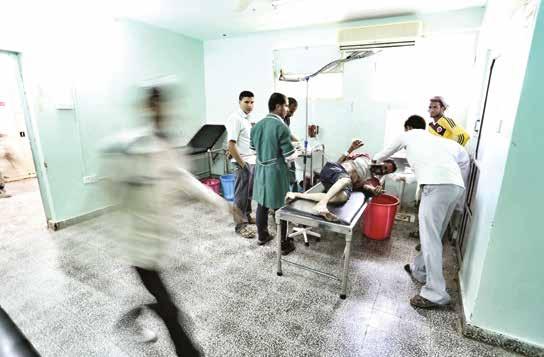
No. staff in 2016: 24 | Expenditure: d 1.9 million | Year MSF first worked in the country: 2015
In collaboration with the local organisation Fe y Alegría, MSF also offered comprehensive care for victims of sexual violence. The project started in mid-2016 in two of the city’s most dangerous neighbourhoods, Petare and La Vega.

control, fear, psychological first aid and sexual violence prevention. This year, over 7,800 volunteers participated.
CECILIA –
KEY MEDICAL FIGURES:
930 group mental health sessions
580 individual mental health consultations
In these areas, criminal gangs use violence – including robbery, murder, extortion and kidnapping – to gain territorial control. MSF psychologists provided 367 individual mental health consultations, and during these sessions, they detected and addressed 57 cases of sexual violence.
MSF teams seek to mitigate the consequences of violence on people’s mental health, by training community leaders and educators and organising psychosocial activities. These include classes and workshops on topics such as anxiety
58, lives in the Libertador municipality of Caracas
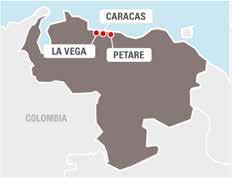
She witnessed her son’s murder at the hands of a criminal gang. She has been undergoing psychological treatment for four months.
” I feel better thanks to you, you are the only one who listens to me, understands me and does not judge me, makes me see the light when I see everything dark. When I’m on the street I remember what we talked about here [in the sessions] and then I feel better.”
No. staff in 2016: 1 | Expenditure: d 0.4 million | Year MSF first worked in the country: 1999
Although cholera is a major public health issue in Zambia, with epidemics typically occurring during the rainy season, the outbreak in February was the first to hit the capital since 2011. Around 1.2 million people live in overcrowded informal settlements in the city, and with such a long period between outbreaks, they had little acquired immunity to the disease.
Médecins Sans Frontières (MSF), together with the Zambian Ministry of Health and the World Health Organization, conducted the largest oral cholera vaccination campaign to be undertaken during an epidemic, when there was an outbreak in Lusaka.
Between 9 and 25 April, the oral cholera vaccine was administered to 423,774 people aged one and over in the four areas of Lusaka that had the highest rates of cholera, or had historically been prone to outbreaks: Kanyama, Bauleni, George and Chawama. At the same time, the Ministry of Health provided care for patients in cholera treatment centres and worked to improve sanitation and hygiene conditions.
Two doses of the oral cholera vaccine are typically recommended. However, due to the limited number of vaccines available globally, and to curb the Lusaka outbreak as quickly as
possible, a single dose administered to twice as many people was deemed more efficient.
More than 100 MSF and Ministry of Health staff, as well as 1,700 volunteers, worked in the vaccination campaign.
The Lusaka health authorities estimated that there were 1,079 cases and 20 deaths between February and June.
MATHILDA –came to be vaccinated with her daughter, Edna, who had just turned 3
” In our neighbourhood, we have no clean water. People leave their rubbish in the streets and nobody does anything. I came as soon as I heard about the vaccination. The vaccine will help protect us against cholera. It can save lives. I encourage other mothers and community members to come and get vaccinated – it’s important that we are all protected.”
No. staff in 2016: 288 | Expenditure: d13.6 million | Year MSF first worked in the country: 2000 | msf.org/zimbabwe | @MSF_Zimbabwe
KEY MEDICAL FIGURES:
39,900 patients received first-line ARV treatment
2,200 individual mental health consultations
1,400 patients treated after incidents of sexual violence
1,100 patients started treatment for TB
570 group mental health sessions

The economic situation continues to decline with very little funds available for any public expenditure and social services. As a result, the health sector faces numerous challenges, including shortages of medical supplies and essential medicines. In addition, the country was affected by floods and regular outbreaks of water-borne diseases due to deteriorating water and sanitation conditions in parts of the country, including the capital Harare.
While HIV prevalence has decreased from 30 per cent in the early 2000s to 15 per cent today, there are still major gaps in services, such as the availability of routine HIV viral load monitoring and second-line antiretroviral (ARV) treatment. Cervical cancer is an emerging health problem, with women living with HIV five times more likely to contract it than those who are not.
MSF offers comprehensive support to victims of sexual violence and also offers
comprehensive services for adolescents in the urban district of Mbare. In Epworth polyclinic, a comprehensive package of HIV, TB and multidrug-resistant TB (MDR-TB) care is adapted for all ages, and cervical cancer screenings and early treatment strategies are provided for all HIV-positive women.
MSF continues to reconstruct and repair boreholes in the city’s most vulnerable neighbourhoods, providing access to clean water as a strategy to prevent outbreaks of water-borne diseases such as typhoid and cholera.
MSF supports the diagnosis and treatment of HIV, TB and mental health in Chikurubi maximum security prison and offers psychiatric treatment, care and support to patients in Harare central hospital’s psychiatric unit. MSF also provides decentralised psychiatric care and community follow-up after discharge to prevent relapse and readmission to the hospital. In 2016, teams carried out 1,579 individual and 180 group mental health counselling sessions. MSF also completed renovation works and construction of the new outpatient department at Harare psychiatric hospital, providing the facility with 100 beds in the inpatient department.
In Gutu, where MSF has taken a communitybased approach to managing large cohorts of stable HIV patients since 2011, the initial findings of a large population-based survey
by MSF and Epicentre in June 2016 indicate that the district reached 86-94-86 and is on track to reach the 90-90-901 goals. In Mwenezi, MSF is working with the MoHCC to fully implement ‘test and start’2 for approximately 18,000 people living with HIV.
MSF continued to support the MoHCC to implement new models of care and community adherence groups (CAGs), in which people take turns picking up antiretroviral (ARV) drug refills – and also provided preventive screenings and early treatment strategies for cervical cancer in six district health centres.
In Manicaland, MSF supports the roll out of CAGs throughout the province and routine viral load monitoring of patients on ARV treatment in five districts. In Chipinge district and Mutare provincial hospital, MSF supports the MoHCC in treating non-communicable diseases such as diabetes and hypertension.
MSF also provided treatment to a total of 26 MDR-TB patients in Epworth, Gutu and Mwenezi.
In Beitbridge, teams provided mental health support and medical care, including HIV and TB testing and treatment, to Zimbabweans who had been deported from South Africa. Country-wide, MSF also supported the rollout of targeted and routine HIV viral load monitoring, with 84,502 viral load tests completed in 2016.
Médecins Sans Frontières (MSF) is an international, independent, private and non-profit organisation.
It comprises 21 institutional members under the MSF International Statutes in Australia, Austria, Belgium, Brazil, Canada, Denmark, France, Germany, Greece, Holland, Hong Kong, Italy, Japan, Luxembourg, Norway, South Africa, Spain, Sweden, Switzerland, the United Kingdom and the United States. There are also offices in Argentina, the Czech Republic, Republic of Korea, India and Ireland. MSF International is based in Geneva.
The search for efficiency has led MSF to create 10 specialised organisations, called ‘satellites’, which take charge of specific activities such as humanitarian relief supplies, epidemiological and medical research, and research on humanitarian and social action. These satellites, considered as related parties to the national offices, include: MSF Supply, MSF Logistique, Epicentre, Fondation MSF, Etat d’Urgence
Production, SCI MSF, SCI Sabin, Fondation MSF Belgique, Ärzte Ohne Grenzen Foundation and MSF Enterprises Limited. As these organisations are controlled by MSF, they are included in the scope of the MSF Financial Report and the figures presented here.
These figures describe MSF’s finances on a combined international level. The 2016 combined international figures have been prepared in accordance with Swiss GAAP RPC. The figures have been jointly audited by the accounting firms of KPMG and Ernst & Young. A copy of the full 2016 Financial Report may be obtained at www.msf.org. In addition, each national office of MSF publishes annual, audited Financial Statements according to its national accounting policies, legislation and auditing rules. Copies of these reports may be requested from the national offices.
The figures presented here are for the 2016 calendar year. All amounts are presented in millions of euros.
Note: Figures in these tables are rounded, which may result in apparent inconsistencies in totals.
The biggest category of expenses is dedicated to personnel costs: about 46 per cent of expenditure comprises all costs related to locally hired and international staff (including plane tickets, insurance, accommodation, etc).
The medical and nutrition category includes drugs and medical equipment, vaccines, hospitalisation fees and therapeutic food. The delivery of these supplies is included in the category of transport, freight and storage.
Logistics and sanitation comprise building materials and equipment for health centres, water and sanitation and logistical supplies.
Countries where MSF expenditure is more than 15 million euros
* ‘Other countries’ combines all the countries for which programme expenses were below one million euros.
The majority of MSF staff (83 per cent) are hired locally in the countries of intervention. Headquarters staff represent nine per cent of total staff. Departure figures represent the number of times international staff left on field missions. Staff figures represent the total full-time equivalent positions.
As part of MSF’s effort to guarantee its independence and strengthen the organisation’s link with society, we strive to maintain a high level of private income. In 2016, 95 per cent of MSF’s income came from private sources. More than 6.1 million individual donors and private foundations worldwide made this possible. Public institutional agencies providing funding to MSF included, among others, the Humanitarian Aid Office of the European Commission (ECHO) and the governments of Belgium, Germany, Denmark, Canada, Spain, Norway, Japan, Luxembourg, Holland, Ireland, Sweden and Switzerland.
Expenditure is allocated in line with to the main activities performed by MSF according to the full cost method. Therefore all expense categories include salaries, direct costs and allocated overheads (e.g. building costs and depreciation).
Programme expenses represent expenses incurred in the field or by headquarters on behalf of the field.
Social mission includes all costs related to operations in the field as well as all the medical and operational support from the headquarters directly allocated to the field and awareness-raising activities. Social mission costs represent 83 per cent of the total costs for 2016.
Other expenses comprises costs associated with raising funds from all possible sources, the expenditures incurred in the management and administration of the organisation, as well as income tax paid on commercial activities.
Permanently restricted funds may be capital funds, where donors require the assets to be invested or retained for long-term use rather than expended; or the minimum compulsory level of retained earnings to be maintained in some countries.
Temporarily restricted funds are unspent designated donor funds to a specific purpose (e.g. specific country or project), restricted in time, or required to be invested and retained rather than expended, but without any contractual obligation of reimbursement.
Unrestricted funds are unspent, non-designated donor funds expendable at the discretion of MSF’s trustees in furtherance of our social mission.
Other funds are foundations’ capital and translation adjustments arising from the translation of entities’ financial statements into euros.
MSF’s funds have been built up over the years by surpluses of income over expenses. At the end of 2016, the available portion (excluding permanently restricted funds and capital for foundations) represented 9.2 months of the preceding year’s activity. The purpose of maintaining retained earnings is to meet the following needs: working capital needs over the course of the year, as fundraising traditionally has seasonal peaks while expenditure is relatively constant; swift operational response to humanitarian needs that will be funded by forthcoming public fundraising campaigns and/or by public institutional funding; future major humanitarian emergencies for which sufficient funding cannot be obtained; the sustainability of long-term programmes (e.g. antiretroviral treatment programmes); and a sudden drop in private and/or public institutional funding that cannot be matched in the short term by a reduction in expenditure.
The complete Financial Report is available at www.msf.org
International Médecins Sans Frontières
78 rue de Lausanne Case Postale 116
1211 Geneva 21 Switzerland
T +41 22 849 84 84 msf.org
Humanitarian Advocacy and Representation team
(UN, African Union, ASEAN, EU, Middle East)
T +41 22 849 84 84
MSF Access Campaign
78 rue de Lausanne Case Postale 116
1211 Geneva 21 Switzerland
T +41 22 849 8405 msfaccess.org
Australia Médecins Sans Frontières / Doctors Without Borders
Level 4 1–9 Glebe Point Road
Glebe NSW 2037 Australia
T +61 28 570 2600 office@sydney.msf.org msf.org.au
Austria Médecins Sans Frontières / Ärzte Ohne Grenzen
Taborstraße 10 A-1020 Vienna Austria
T +43 1 409 7276 office@aerzte-ohne-grenzen.at aerzte-ohne-grenzen.at
Belgium Médecins Sans Frontières / Artsen Zonder Grenzen
Rue de l’Arbre Bénit 46
1050 Brussels Belgium
T +32 2 474 74 74 msf-azg.be
Brazil Médecins Sans Frontières / Médicos Sem Fronteiras
Avenida Rio Branco 135 11º andar - Centro
CEP: 20040-912 Rio de Janeiro Brazil
T +55 21 3527 3636 info@msf.org.br msf.org.br
Canada Médecins Sans Frontières / Doctors Without Borders
720 Spadina Avenue Suite 402 Toronto Ontario M5S 2T9 Canada
T +1 416 964 0619 msfcan@msf.ca msf.ca
Denmark Médecins Sans Frontières / Læger uden Grænser
Dronningensgade 68, 3. DK-1420 København K
Denmark
T +45 39 77 56 00 info@msf.dk msf.dk
France Médecins Sans Frontières 8, rue Saint Sabin 75011 Paris France
T +33 1 40 21 29 29 office@paris.msf.org msf.fr
Germany Médecins Sans Frontières / Ärzte Ohne Grenzen
Am Köllnischen Park 1 10179 Berlin Germany
T +49 30 700 13 00 office@berlin.msf.org aerzte-ohne-grenzen.de
Greece Médecins Sans Frontières /
15 Xenias St. 115 27 Athens Greece
T + 30 210 5 200 500 info@msf.gr msf.gr
Holland Médecins Sans Frontières / Artsen zonder Grenzen Plantage Middenlaan 14 1018 DD Amsterdam
Netherlands
T +31 20 520 8700 info@amsterdam.msf.org artsenzondergrenzen.nl
Hong Kong Médecins Sans Frontières 無國界醫生 /无国界医生
22/F Pacific Plaza
410– 418 Des Voeux Road West
Sai Wan Hong Kong
T +852 2959 4229 office@msf.org.hk msf.org.hk
Italy Médecins Sans Frontières / Medici Senza Frontiere
Via Magenta 5 00185 Rome Italy
T +39 06 88 80 60 00 msf@msf.it medicisenzafrontiere.it
Japan Médecins Sans Frontières / 国境なき医師団日本
3rd Fl. Forecast Waseda First 1-1 Babashita-cho Shinjuku-ku Tokyo 162-0045 Japan
T +81 3 5286 6123 office@tokyo.msf.org msf.or.jp
Luxembourg Médecins Sans Frontières 68, rue de Gasperich L-1617 Luxembourg
Luxembourg
T +352 33 25 15 info@msf.lu msf.lu
Norway Médecins Sans Frontières / Leger Uten Grenser
Hausmannsgate 6 0186 Oslo Norway
T +47 23 31 66 00 epost@legerutengrenser.no legerutengrenser.no
Spain Médecins Sans Frontières / Médicos Sin Fronteras
Nou de la Rambla 26 08001 Barcelona
Spain
T +34 93 304 6100 oficina@barcelona.msf.org msf.es
South Africa Médecins Sans Frontières / Doctors Without Borders
70 Fox Street 7th Floor Zurich House Marshalltown Johannesburg
South Africa
T +27 11 403 44 40 office-joburg@joburg.msf.org msf.org.za
Sweden Médecins Sans Frontières / Läkare Utan Gränser
Fredsborgsgatan 24 4 trappor Box 47021 100 74 Stockholm Sweden
T +46 10 199 33 00 info.sweden@msf.org lakareutangranser.se
Switzerland Médecins Sans Frontières / Ärzte Ohne Grenzen
78 rue de Lausanne Case Postale 116 CH-1211 Geneva 21 Switzerland
T +41 22 849 84 84 office-gva@geneva.msf.org msf.ch
UK Médecins Sans Frontières / Doctors Without Borders
Lower Ground Floor Chancery Exchange
10 Furnival Street London EC4A 1AB UK
T +44 20 7404 6600 office-ldn@london.msf.org msf.org.uk
USA Médecins Sans Frontières / Doctors Without Borders 333 7th Avenue 2nd Floor New York NY 10001-5004 USA
T +1 212 679 6800 info@doctorswithoutborders.org doctorswithoutborders.org
Branch Offices
Argentina
Carlos Pellegrini 587 11th floor C1009ABK Ciudad de Buenos Aires Argentina
T +54 11 5290 9991 info@msf.org.ar msf.org.ar
Czech Republic
Lékari bez hranic, o.p.s Seifertova 555/47 130 00 Praha 3 – Žižkov Czech Republic
T +420 257 090 150 office@lekari-bez-hranic.cz lekari-bez-hranic.cz
India
AISF Building 1st & 2nd Floor Amar Colony Lajpat Nagar IV New Delhi 110024 India
T +91 11 490 10 000 india.office.hrm@new-delhi.msf.org msfindia.in
Ireland
9–11 Upper Baggot Street Dublin 4 Ireland
T +353 1 660 3337 office.dublin@dublin.msf.org msf.ie
Mexico
Cuauhtémoc #16 Terraza Col. Doctores
CP 06720
Mexico
T +52 55 5256 4139 msfch-mexico@geneva.msf.org msf.mx
South Korea
5 Floor Joy Tower B/D 7 Teheran Road 37-gil Gangnam-gu Seoul 135-915 South Korea
T +82 2 3703 3500 office@seoul.msf.org msf.or.kr
United Arab Emirates
P.O. Box 65650 Dubai UAE
T +971 4457 9255 office-dubai@msf.org msf-me.org
Contributors
Maya Abu Ata, Richard Accidat, Corinne Baker, Daniel Barney, Maria Borshova, Talia Bouchouareb, Brigitte Breuillac, Marine Buissonière, Andrea Bussotti, Lali Cambra, Philippe Carr, Sean Christie, Amandine Colin, Sara Creta, Eleanor Davis, Silvia Fernández, Amelia Freelander, Marisol Gajardo, Igor Garcia, Nasir Ghafoor, Diala Ghassan, Corinne Grant, Solenn Honorine, Dean Irvine, Joanna Keenan, Sophie Madden, Dalila Mahdawi, Alexandra Malm, Laetitia Martin, Sally McMillan, Robin Meldrum, José Luis Michelena, Pau Miranda, Yesika Ocampo, Kate Ribet, Natalie Roberts, Carmen Rosa, Victoria Russell, Caitlin Ryan, Jinane Saad, Florian Seriex, Alessandro Siclari, Sandra Smiley, Eleanor Weber Ballard, Sonia Verma, Katie Whitehouse.
Special thanks to
Valérie Babize, Sara Chare, Sarah-Eve Hammond, Kate de Rivero, Marc Gastellu Etchegorry, Jean-Marc Jacobs, Philippe Latour, Jason Maddix, Jérôme Oberreit.
We would also like to thank all the field, operations and communications staff who provided and reviewed material for this report.
English Edition
Managing Editor Marianne Burkhardt
Photo Editor Bruno De Cock
International Media Database Intern Clara Ferrer Perez
Copyeditor Kristina Blagojevitch
Proofreaders Marianne Burkhardt, Joanna Keenan, Jason Maddix
French Edition
Editor Laure Bonnevie, Histoire de mots Translator Translate 4 U sarl (Aliette Chaput, Emmanuel Pons)
Spanish Edition
Coordinator Philippe Latour
Translator Nova Language Services
Editors Cecilia Furió and Arianne Basaguren
Arabic Edition
Coordinator Basheer Al Hajji
Translator Simon Staifo
Editor/Proofreader Basheer Al Hajji
Designed and produced by ACW, London, UK www.acw.uk.com
Médecins Sans Frontières (MSF) is an international, independent, medical humanitarian organisation that delivers emergency aid to people affected by armed conflict, epidemics, exclusion from healthcare and natural disasters. MSF offers assistance to people based on need and irrespective of race, religion, gender or political affiliation.
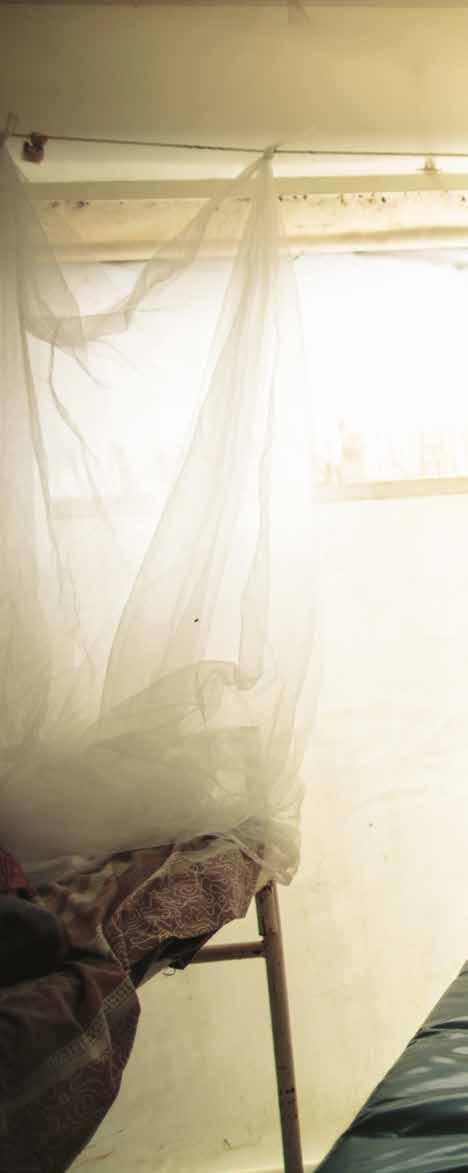
MSF is a non-profit organisation. It was founded in Paris, France in 1971. Today, MSF is a worldwide movement of 24 associations. Thousands of health professionals, logistical and administrative staff manage projects in 71 countries worldwide. MSF International is based in Geneva, Switzerland.
78 Rue de Lausanne, Case Postale 116, 1211 Geneva 21, Switzerland
Tel: +41 (0)22 849 84 84
Fax: +41 (0)22 849 84 04
@MSF
msf.english
COVER PHOTO A doctor examines a baby at an MSF-run health facility in the UN protection of civilians camp in Bentiu, South Sudan. © Rogier Jaarsma